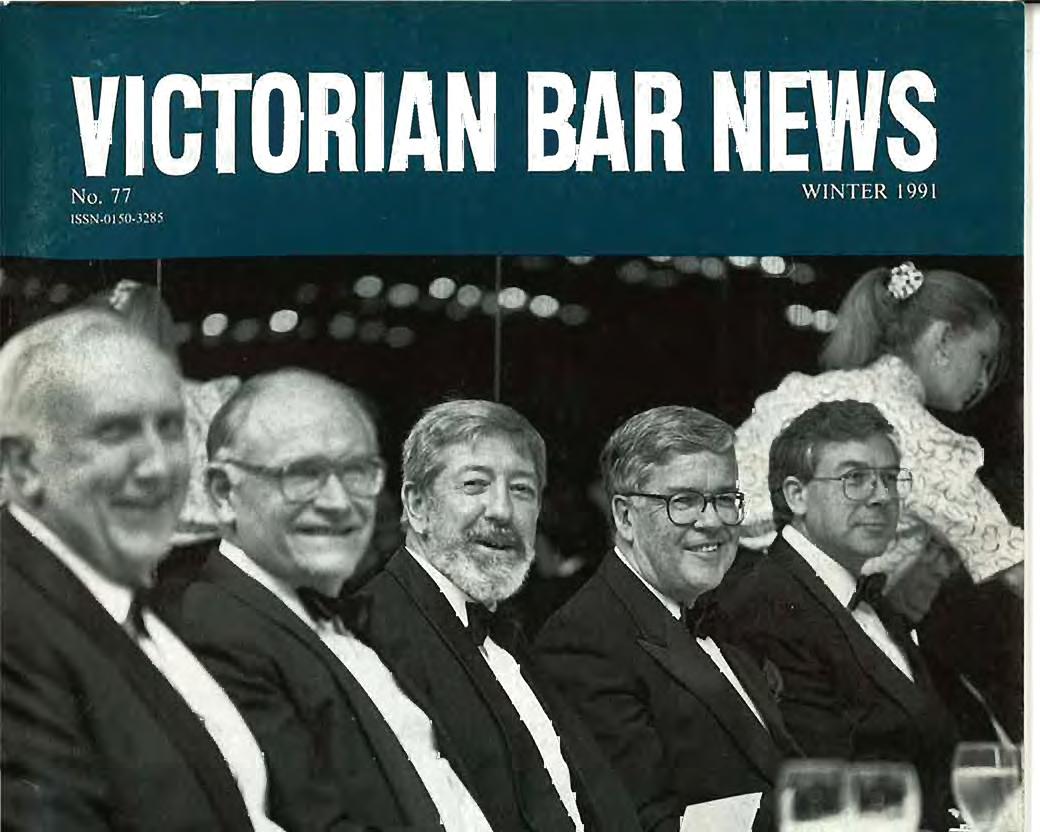

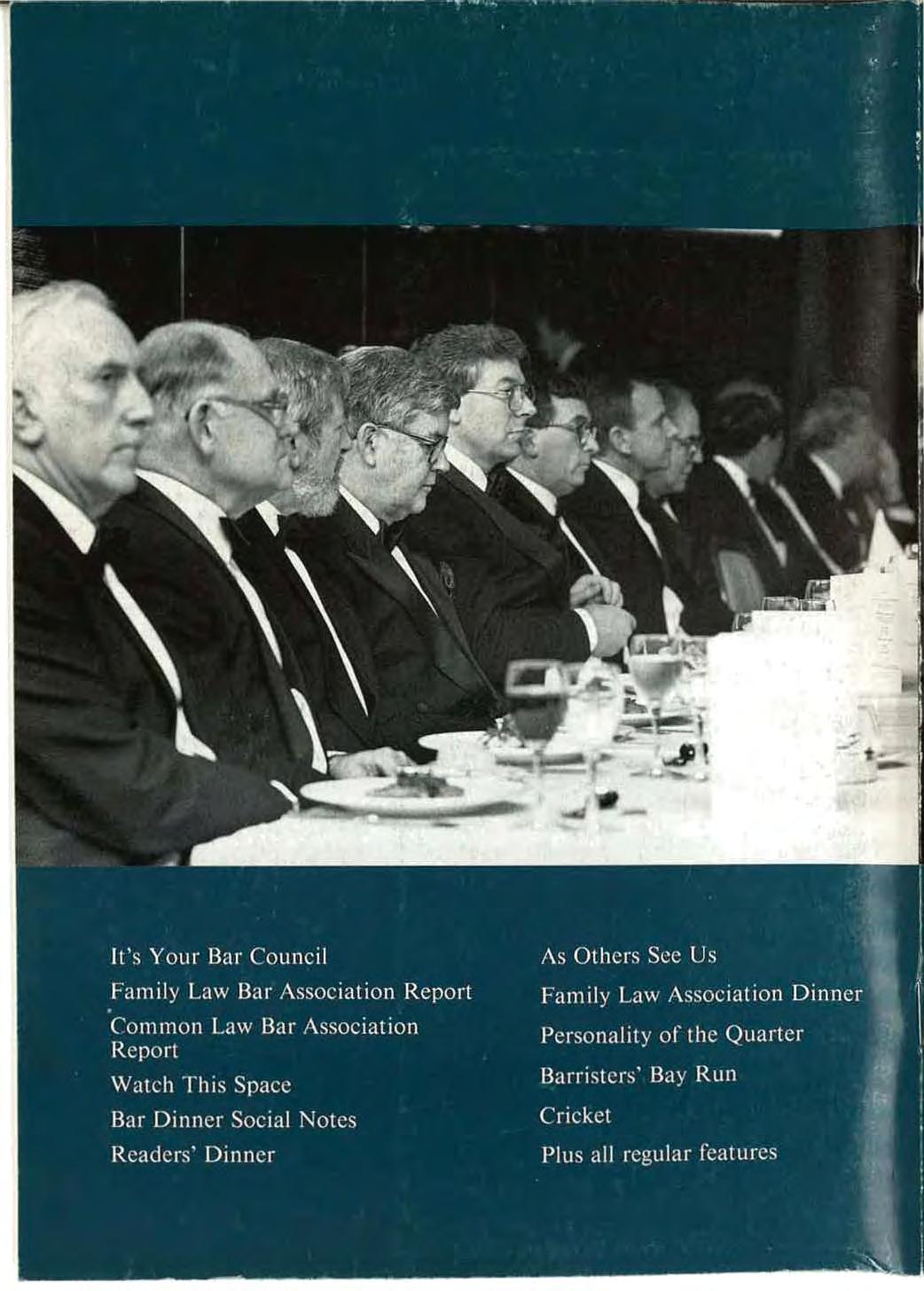

















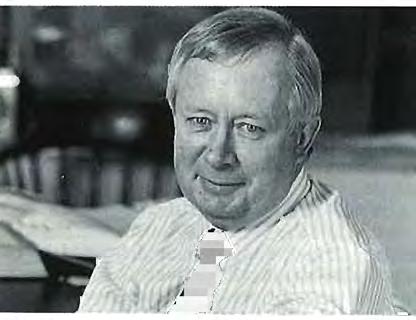


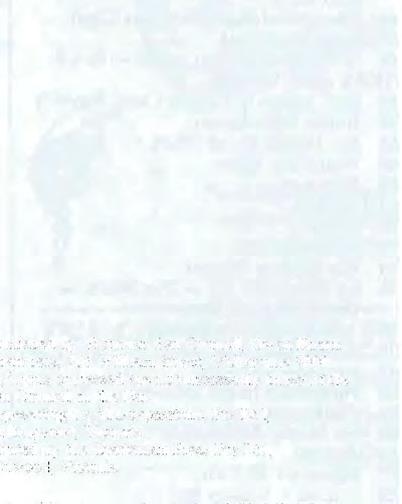
This publication may be cited as (1991) 77 Vic B.N
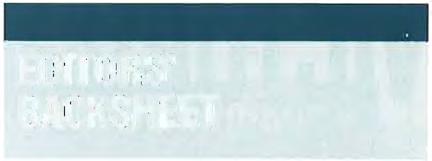
It is not inappropriate that the one issue of the Bar News should contain the Australian Bar Association's "Statement on the Independence of the Judiciary" and a commentary by the President of the Law Council of Australia on the Senate Cost of Justice Inquiry. A totally independent judiciary is a basic ingredient in the price of justice. It is, unfortunately, a price which governments appear increasingly reluctant to pay. Independence of the judiciary involves more than freedom from direct government intervention in the decision-making in particular cases. Basic to the independence of the judiciary, of course, is that a member of the bench should not be removable at the whim of the executive, or at all, except in circumstances which justify impeachment. Anything less than this security of tenure is absolutely inimical to the rule oflaw. It is to be hoped that the statements which the Sunday press recently attributed to the leader of the State Opposition on this point were totally inaccurate.
The independence of the judiciary is of little value ifthejurisdiction of the courts is eroded by the creation of specialist tribunals with exclusive jurisdiction. Governments may believe that their policies can be much more readily implemented through tribunals which "understand" the policy behind particular legislation and the members of which are appointed for relatively short terms. What has been described as "tribunalization" is designed to achieve speedy pragmatic administration of policy. It is not necessarily calculated to achieve justice according to law. Certainly it undermines the independence of the judiciary and the concept of government under the law.
Justice should be measured by quality, not cost. The quality of justice requires high calibre appointees chosen on merit who are given adequate research facilities, and a working environment and a work pace which enables due consideration to be given to the evidence and the arguments put without being distracted by absence of support staff or library facilities or the need to write out reasons in longhand.
A system which provides the judges in the highest court in the State with inadequate library and secretarial services and with a work load which requires them to research their judgments
at night and at the weekends, and often to write out their reasons in long hand, is worse than merely non-cost-effective; it does not facilitate the administration of justice; it inhibits it.
There is currently a rumour that, despite the clear inadequacy of staffing in the Supreme Court, redundancy packages been (or will be) offered to members of staff In the Prothonotary's Office as part of the government's policy of reducing governmental expenditure.
It is strange that, in a society which has become (perhaps rightly) obsessed with environmental issues and with the quality of life, the government, the Senate Committee, the Victorian Law Reform Commission, the Trade Practices Commission and the press express concern not at the quality of justice but only at the cost.
No one today would suggest that pollution controls on industry be abandoned in the interests of efficiency. No one should suggest that the cost of justice, as opposed to the cost of litigation, can come too high.
The legal profession does need to examIne Its role in society and the manner in which it delivers its services to the public. We at the Bar need to examine ways of reducing the cost oflitigation, as, for example, by use of written submissions and pre-filed WItness statements and by the abolition of unnecessary interlocutory steps.
There are some practices of a traditional nature the abandonment of which may reduce the cost oflitigation, just as there are industrial practices the abandonment of which would reduce the cost of production. There are other practices which must be maintained if we are concerned with the administration of justice rather than the mere settlement of disputes.
In the next ten years we need to bring legal practice into the 21st century. We must that bureaucratic and governmental obseSSIOn with the cost of justice does not cause that century to bring with it Aldous Huxley's "Brave New World" or George Orwell's "Animal Farm".
Bernard Bongiorno Q c. has accepted our invitation to join the Editorial Board of the. Bar News with the approval of the Bar CouncIl, of Perhaps a tradition is being established whereby D.P.P.s in the future will part of the Bar News with Bongiorno follOWIng In the steps of COldreY. We look to his contribution to the pages of future editIOns.
The Editors
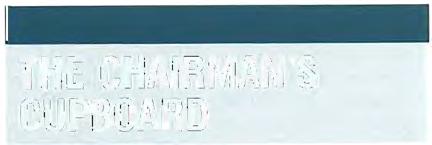
I AM WRITING THIS EARLY ON THE morning after the annual dinner of the Criminal Bar Association. This is not a boast. It is a necessity. The editors have imposed upon me the most final of final deadlines for submitting Bar News" entries to them. I deserve no sympathy , and seek none. I have dined as a guest of th e Criminal Bar Association. It organises dinners which are not to be missed. If you have to pay to get in, and actualJy get a ticket, you are lucky because they are always over-subscribed. If you are invited as a non-pay ing , non-speaking guest , as I was, you wouldn't exchange your invitation for a week on the Barrier Reef. With the possible exception of Michael Adams' watches, the Criminal Bar Association dinners are just about the best thing the Bar puts on
The Bar Dinner itself was, I think, a considerable success. The attendance was magnificent: 510 out of a practising Bar of 1,240. Of course, a fair proportion of those present were not on the practising list. Nevertheless, it was an impressive response. The New South Wales Bar Dinner attracted about 220 persons from a practising Bar of about 1,800. Those at our dinner heard excellent speeches from Black c.J., Ashley J. and the junior silk (Neil Young Q.c.).
The Australian Bar Association met in Brisbane in mid June. The Independence of the Judiciary was the biggest item on the agenda. The Association's paper on that subject was , earlier this year, distributed to all judicial officers in Australia, to all Members of Parliament to a large number of other public figures and to all secondary schools . It received a very favourable response, and will perhaps serve as a touchstone against which the Bars of Australia can not only assess threats to the proper role of the judicial arm of government, but also evaluate proposals to better secure its independence. The paper is reproduced at p. 18 of this issue.
It is proposed to better secure the independence of the Victorian judiciary by the establishment of a Victorian Judicial Council. It is intended that that body will provide the means by which the Courts themselves, and possibly some Tribunals, rather than the executive arm of government, will administer the affairs of bodies exercising judicial powers.
A steering group, on which the Bar is represented, has been formed under the chairmanship of the Chief Justice. The steering group has a
very broad charter: it is to give practical content to what is presently little more than an idea. Thus, the steering group wilI consider and advise upon the role of the Council, the means by which it should be brought into existence, its structure, and so on. The proposal represents a significant advance, and the government and the Courts are to be congratulated.
In July, the Law Reform Commission plans to publish two papers on the subject of "Access to the Law". One of these, entitled "Accountability of the Legal Profession," examines the existing regulatory structures of the Law Institute and the Bar, and proposes that these be unified. The other paper, entitled "The Cost of Litigation," is preoccupied with rules regulating the Bar alone, as opposed to rules which regulate both solicitors and barristers or which regulate solicitors alone. The paper questions the continued existence of each of these rules in their present form. But since these rules form the core elements of a separate, independent Bar, the paper raises the general issue of the continued existence of such a body.
There can be no doubt of the value, in a democracy, of an independent legal profession. Owing their duty only to their clients, to the Courts and to the law itself, lawyers in private practice are free of interference from governments and other outside bodies in the conduct of their professional duties. The independent profession is therefore in a posi tion to stand between the government and the citizen, the rich and the poor, the powerful and the weak. Without such independence, democracy cannot survive.
An independent Bar supplies an additional dimension to this aspect of the social and political landscape . Speaking generally, barristers are more independent of their fellow lawyers and of their clients than are solicitors. They have no obligations to a partner. They are not thereby constrained in the area in which they practise, in the kind of client they wilI accept, or by the monetary or other contributions which partners have to make as between themselves. No barrister need be troubled by matters of office administration, but rather is able to keep overheads at a far lower level than is possible for solicitors. More time is therefore available for purely legal work.
Solicitors who are not sole practitioners are dependent upon their partners. They owe duties to their partners. They share profits and losses with their partners. They are bound by partnership policy. Everything - or almost everything - they do in their professional capacity impinges upon the partnership. Moreover, each partner has a direct financial interest in the way in which the other partners conduct their practices.
4
In this environment, the cab rank principle struggles to survive. Certainly, the Law Society of England and Wales continues to be strongly opposed to its imposition upon solicitors who also practise as advocates. And if barristers could practise in partnership, the rule would necessarily disappear. At a meeting of the Law Reform Commission held on 18 June, Denis Nelthorpe of the Consumer Credit Legal Service said that if barristers were allowed to practise in partnership, more members of the Bar would practise "poverty law" because it would be more attractive to do so in partnership than as an individual. Assuming the correctness of that proposition (and no evidence was then put forward in support) the cab rank principle would kill the idea. Assume that one of the barrister partners is asked to act for a bank against a poverty-stricken debtor. He cannot refuse, because the cab rank principle wilI not allow him to refuse. All the partners would then be bound, by the ordinary rules of partnership, to decline a brief for the debtor.
There is, in general, a greater distance between the barrister and the client than between the solicitor and the client. Given that litigation is a very important event in the lives of most individuals engaged in it (and, ultimately, it is always individuals who are engaged, whether as witnesses or otherwise, even if only in some representative or official capacity) there is great importance and benefit in having available dispassionate and disinterested advice. This barristers can provide, although their ability to do so would decrease were a solicitor to be briefed to appear as junior - another change advocated by the Law Reform Commission.
Independence is, in part, a state of mind. It is appropriate to be sceptical about claims that such a state of mind can be, and is being, cultivated by any particular environment. Nevertheless, practice at the Bar does encourage that mental toughness which is one of the essentials of an independent mind. It does encourage the expression of strong opinions among colleagues, even among friends, who are of the opposite view. There is also an ethos at the Bar which supports the determined and tenacious putting of a case even in the face of judicial hostility.
The Bar's ability to put its independence to the most effective use in the administration of justice is one thing. The existence of this independence is another, and cannot be doubted. Individual barristers owe allegiance to no-one who is not their client; and the barrister has as much right, and is under the same duty, to assert and exercise his or her professional independence of a client government as of a client citizen.
David Harper

From time to time we are all asked to vote for members of the Bar Council. We all know the Bar Council meets from time to time. Occasionally we become aware of some of the more momentous decisions of the Bar Council. What few of us realise is that the Bar Council meets approximately fortnightly and deals with a wide range of matters. Some of the matters are of a mundane housekeeping nature, some deal directly with the right of the individual to sign the Bar Roll and/or to stay on the Bar Roll, and others affect substantial numbers of counsel in the conduct of their profession. In addition to the meetings of the Bar Council there are regular meetings of the Executive Committee of the Bar Council.
It is anticipated that this article will be the first of a regular series highlighting the more significant and/or interesting activities of the Bar Council. Considerations, resolutions and decisions of the Bar Council dealing with individual members of counsel and individuals who have applied to become members of counsel will not be dealt with.
In the life of the present Bar Council the following significant decisions have been made: DECISIONS OF THE COUNCIL
1. Your annual subscription has been increased (1 November 1990).
2. A Magistrates' Court Committee has been established to reflect the interests of those members of the Bar (not necessarily represented by the Young Barristers' Committee) who practise regularly in the Magistrates' Court (1 November 1990).
3. The Bar Council has advised the Chief Justice of the Family Court that it is the opinion of the Bar Council that, in the absence of express arrangements between counsel and their instructors to the contrary, counsel should not charge waiting fees when their cases are not reached (15 November 1990).
4. The Bar Council resolved to continue to meet the costs of the Bar Children's Christmas party for 1990 (29 November 1990).
5. A motion that the mandatory rule requiring each counsel to engage a clerk approved by
the Bar Council ·be rescinded was put and lost, i.e. the Bar Council resolved that the mandatory requirement continue (3 March 1991).
6. It was resolved that there be imposed on each clerk an obligation to lodge in each financial year with the Bar Council and with the clerk's List Committee a confidential statement of actual gross income and expenses of the clerking business for the previous financial year containing sufficient detail to reveal the true costs of the clerking operation (3 March 1991). Implementation of this motion was subsequently deferred (21 March 1991) and the motion itself rescinded (13 June 1991)
7. A motion that the two counsel rule be amended was put and lost, i.e. it was resolved to maintain the two counsel rule in its current form (3 March 1991).
8. The rule preserving anonymity of a complainant under the Bar's Fee Collection Scheme has been abolished (14 March 1991).
9. The rules governing the sharing of chambers have been relaxed (16 May 1991).
10. It was resolved to recommend to a General Meeting of the Bar an alteration to the structure of the Bar Council (30 May 1991)
Amongst the other matters discussed by the Bar Council were:
1. Listing procedures in the Supreme Court (1 October 1990).
2. A proposal that the powers of the Crimes Compensation Tribunal be transferred to the Magistrates' Court (13 September 1990).
3. Fee caps in Magistrates' Courts (18 October 1990).
4. Superannuation of barristers' employees (18 October 1990).
5. A backsheet contammg the following notation: "This brief is forwarded on the condition that insofar as the timing of payment to counsel is concerned Counsel's fee will be met when the [name of solicitor] account is met. [Name of solicitor] agrees that it 5
will account promptly to the client or other funding source" (29 November 1990).
6. Increases to recommended Supreme Court fees (29 November 1990).
7. Overdue fees and the default list scheme (7 March 1991).
8. Proposed restructuring of the Children's Court Clinic (18 April 1991).
The following solicitors were placed on the default list:
1. W. Dunlop & Co. (18 April 1991).
2. Brian T.D. Cash (2 May 1991).
Individual members of the Bar may feel strongly on particular matters which have been the subject of Bar Council decision or decisions, whether it be the funding of the children's Christmas party, waiting fees in the Family Court, fee caps in the Magistrates' Court, mandatory clerking, the two counsel rule, or the anonymity of a complainant under the Bar's Fee Collection Scheme.
Correspondence or articles on any matters decided upon or considered by the Bar Council about which readers may feel strongly are always welcome.

was passed in the recent Autumn Session of State Parliament. I intend the proclamation date of the Bill to be the 1st August 1991. This is a milestone for the Victorian Court System and will implement a procedure unique to any jurisdiction in the world encouraging flexibility and efficiency of case transfer between the jurisdictions. It is a recognition of the work done by the Case Transfer Committee chaired by Hon. Mr. Justice McGarvie and his recommendations are the subject of the Bill.
The Bill enables classes of cases, as well as individual cases, to be readily reallocated between the courts, depending on available "judge time", the nature and complexity of the case or cases, and consent of the parties. Only civil proceedings are subject to this procedure.
The Bill also increased the civil jurisdiction of the County Court to $200,000. A provision to increase the Magistrates' Court jurisdiction to $40,000 was defeated in the Legislative Council.
Another major reform to successfully pass through Parliament is the Sentencing Act. The issue of sentencing has been on the legislative program for some time and goes back to the 1988 report of the Victorian Sentencing Committee chaired by Sir John Starke, Q.c.
Practitioners and the courts will no doubt be greatly assisted by this Act which for the first time brings together general sentencing principles, provides an easily understood scale of maximum penalties, removes an anomaly in our
fine default provisions and clarifies the law relating to conviction/non-conviction after a finding of guilty. The Act also in conjunction with the Corrections (Remissions) Act abolishes remissions and implements the policy of truth in sentencing so that sentences served will reflect sentences passed. Guidance is provided to the courts on this new sentencing practice. Maximum penalties have been reduced for many offences in line with the Sentencing Task Force Report chaired by Mr. Frank Costigan Q.c.
The Crimes Legislation (Miscellaneous Amendments) Act was also passed which lifted the sunset clause on those provisions which compulsorily allowed the taking of blood samples for DNA profiling in relation to the offence of murder, manslaughter and sexual offences. The sunset provision operated so that unless removed the provisions would cease to operate on the 1st June 1991. To date the blood sample provisions have been used successfully in prosecutions. The Bill also extended the blood sample provisioqs to all indictable offences against the person such as armed robbery and causing serious injury.
The Bill also sought to abolish the outdated "year and a day" rule in relation to murder and manslaughter. This provision was defeated in the Legislative Council.
There was some doubt over the operation of the Magistrates' Court Act 1989 regarding committal time limits. As a result the Crimes (Miscellaneous Amendments) Act restarts all three and six month time limits from the 1st June
1991. The provision renders of no effect any order previously made that a person not stand trial but preserves orders committting for trial or discharging a defendant where a committal has already taken place . It also gives a court greater scope to extend the time limits once the statutory period has expired and provides that the DPP may bring a direct presentment with leave of the court notwithstanding an order that a person not stand trial.
I have been very concerned at the recent threats to members of the judiciary and public servants on the basis of some perceiv e d political affiliations. It not only goes to undermine their current position and status but also represents an attack on the fundamental requirement of the rule of law being the independence of the judiciary. I note the Australian Bar Association regards the issue of utmost importance and issued in March 1991 a statement on the matter. On page 1 of that statement the Association makes the point :
" An independent judiciary is a key stone in the democrati c a r ch. That keystone shows signs of stress. If it crumbles , democracy falls with it"
Consequently I have introduced into the House the Constitution (Independence of Judges and Public Officers) Bill 1991 which will lie over for consultation until the next session later this year. The Bill basically increases the protection of the judiciary and public officers by entrenching their respective removal provisions in the Constitution Act and in the case of Supreme and County Court Judges requiring for their removal an absolute majority of all members in each house. Should the government of the day wish to circumvent this procedure the Bill makes an Act removing ajudge void. Whilst this is no way provides a guarantee against the interference of governments it makes such interference more . difficult and heightens awareness of the importance of our democratic institutions . These measures build on the steps taken by the Government in 1986 to give County Court judges the same independence as Supreme Court judges. Prior to this County Court judges could be removed by an executive decision of the Governor-in-Council without an address by Parliament. In 1984 the magistrates were removed from the Public Service and given an independent status subject to removal by the Governorin-Council only after a hearing and relevant findings in the Supreme Court.
Jim Kennan



Retire in style 10 years early.
Be finan cially indep endent at 50 to 55 inste ad of 60 to 65. To find out more, contact your Assoc iated Planners Ltd representative .
Pete r Hawks (03) 696 0633 Melb ourne, Guy Carr ington (02) 525 6222 Sydney, Fred (08) 3730955 Adelaide, Max Cribb(07)893 1909 Brisbane , Dale Hughes (09) 4815077 Per th.



THE 27TH AUSTRALIAN LEGAL CONvention opens in Adelaide on Sunday 8 September with an ecumenical service in St Peter's Cathedral, followed by an opening ceremony and reception at the Festival Theatre. All is ready for a great Convention, thanks to the excellent preparations made by the South Australian Law Society's planning committee, chaired by Terry Evans. It is expected that a registration brochure has been distributed with the May issue of Australian Law News.
Construction has begun on the Law Council's new headquarters in Torrens Street, Braddon, in Canberra. Contracts for the purchase of a block of land and for the building were completed recently, and the building is due for completion in October this year.
The half-yearly meeting of the LCA Council was held at Alice Springs, where the warm hospitality of the Law Society of the Northern Territory was enjoyed. Councillors took the opportunity to meet a number of Territory practitioners, and enjoyed hearing from Max Horton about practice in The Alice.
The Council heard of work being done in connection with plans for a national system of advocacy training under the aegis of the Law Council, and endorsed this important project. Mr Justice George Hampel of the Victorian Supreme Court, a leading proponent of advocacy training, and a teacher of advocacy, is chairing an LCA steering committee that is developing the proposal.
Reports to the Council showed that work is progressing on the development of a proposal for a national professional indemnity insurance scheme for the legal profession. Messrs Peter Gandolfo (Law Institute of Victoria) and Geoff Roberson (Law Society of New South Wales) with assistance from the LCA secretariat, will do
8

further work on the project, taking into account views expressed at the Council meeting.
Mr. David Miles has been declared Presidentelect of the LCA for the period until the end of the 1991 annual general meeting, due to be held on 7 September in Adelaide, immediately before the 27th Australian Legal Convention. Mr. Miles, a Melbourne solicitor, became Vice-President of the LCA at the 1990 AGM. The thenelected President-elect, Mr. Bruce Debelle Q.C., was later appointed a judge of the South Australian Supreme Court. Mr. Miles was made President-elect at the Alice Springs Council meeting.
Following discussion by the Council, the President (Mr. Alex Chernov Q.C.) issued a statement expressing the Council's concern at the proposed ban on political advertising in the electronic media, saying that the ban would breach important elements of freedom of expression and free elections.
The President reported to the Council on his recent visit to three Asian countries, and referred to the importance of strong relations between the Australian legal profession and the professions in the Asia-Pacific region. This view is strongly supported by the LCA Executive and by the Policy Advisory Group. A former Chief Justice of India, Mr. P.N. Bhagwati, visited the LCA offices late in March while in Canberra in .connection with World Consumer Rights Day observances.
The LCA's Legal Education Conference at Bond University in February was very successful, and work is now proceeding on following-up issues raised at the conference. The President has written to the Minister for Employment, Education and Training about the paucity of resources for law schools, and hopes to have discussions with the minister on the matter. A legal education policy statement is being developed,
and close contact will be maintained with the law schools.
Following the provision of advice by Sir Maurice Byers Q.C., the President has advised Mr. Jim Staples that while the Law Council will continue to speak in support of the important principles raised by the Government's treatment ofMr. Staples (a former Deputy President of the now-abolished Conciliation and Arbitration Commission), the Law Council is unable to take the matter any further.
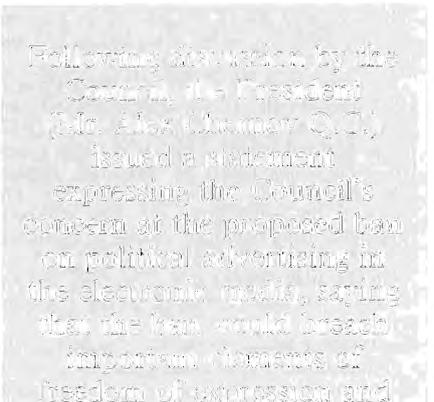

The Council meeting was advised by the Secretary-General (Peter Levy) that the LCA and its Sections had made 34 formal submissions to government and other authorities since the meeting in September 1990, and currently had a large number of matters under consideration. In addition to formal submissions , many other important matters had been dealt with by letter and personal contacts.
Law Council members are offered special discounts on registration fees for the 27th Australian Legal Convention to be held in Adelaide 8-12 September.
A brochure giving full information about the Convention, and containing the registration
form, was published with the May edition of Australian Law News. Additional registration forms are available from: 27th Australian Legal Convention , PO Box 8102, Hindley Street, Adelaide SA 5000. (08) 210 6776. Fax (08) 212 5101.
The full registration fee is $550, but for a constituent body member it is $510, for an LCA individual member $490 and for an individual and Section member $470.
The Law Council has negotiated a further benefit for individual members , to be available from 1 July. The Rydges Hotel Group, with 11 properties in Australia and New Zealand, will offer corporate rates to LCA members. To obtain the benefit, members should simply state that they are an LCA member and quote their membership number.
The Law Council has established a Human Rights Committee. It is chaired by Nicholas Cowdery Q.c., of Sydney , and will advise the Executive on all human rights issues. Until now , these matters have been dealt with by the President and the Executive on an ad hoc basis.
Other committee members are David Muir (Deputy Chairman , Brisbane), David Harper Q.C. (Melbourne), Stuart Fowler (Sydney) , David Lucas (Melbourne) and John Robertson (Brisbane). All are active in human rights work. The committee invites suggestions as to matters it should take up. Practitioners can write to the Chairman care of the LCA , PO Box 1989, Canberra ACT 2601 or DX 5719 Canberra.
The LCA Executive has approved the establishment of an Aboriginal Justice Committee. This committee will advise the Executive on legal issues arising in relation to matters affecting Aboriginal people.
The Law Council will contribute $2,000 towards a fund to provide scholarships for three years in memory of two Australian lawyers killed by IRA gunmen in Holland last year - Nick Spanos and Stephan Melrose . The English law firm for which the two were working, McKenna & Co, of London, suggested that scholarships be provided to enable young law graduates from the University of Sydney and the Queensland University of Technology (which Nick and Stephan attended) to work for a year in England and to visit the Continent. The Law Society of England and Wales has offered to help, and English and Australian law firms will be invited to contribute.


The IRA admitted responsibility for the murders of Spanos and Melrose, saying they were mistaken for British servicemen. Contributions to the scholarship fund can be sent to "The McKenna & Co Foundation - Australian Appeal", care of Mr. R.H. Malthouse, McKenna & Co, Mitre House, Aldersgate Street, London EC1A 400, England.
The LCA Secretariat is preparing a paper listing issues likely to be considered by the Trade Practices Commission when it examines the legal profession in the course of its current study of the professions. The TPC has released an issues paper looking at the accounting profession, and this gives some indication of the TPC's approach to its study.
Where it is likely that constituent bodies will hold differing views, it will be for them to present those views to the TPC. Where there is unanimity of view, the Law Council hopes to be able to co-ordinate the presentation of views.
The first, wide-ranging phase of the inquiry by the Senate Committee on Legal and Constitutional Affairs appears to be completed and it is likely that the committee will now concentrate on specific issues.
The committee has issued its first three "discussion papers" - the first a general paper on the issues being considered, the second a paper raising issues about legal costs and scales, and the third on contingency fees. The LCA will be responding to the papers in consultation with its constituent bodies.
The President recently listed for the committee some issues on which there might be some concentration: administration of the courts, caseflow management and pre-trial procedures, court-annexed mediation, alternative dispute resolution, judicial training and the simplification of legislation.
The Law Council will be involved in planning discussions relating to new Commonwealth court buildings. Agreement has been reached with the Attorney-General's Department on a consultative process.
The Council has adopted recommendations by the Law Institute of Victoria aimed at achieving better access on a simpler and more uniform basis to information held by governments in computer databases.

THE FAMILY LAW BAR ASSOCIATION spluttered into life in the late 1970s and meandered along for some years but lacked sustained direction and purpose.
Re-invigorated by a formal Constitution in 1985, together with a more determined and committed approach by its members, the Association burgeoned and has developed into a large cohesive group being heard on important matters touching upon the practice of family law. The views of the Association are now routinely sought when any significant change to legislation or court procedures is contemplated.
On the more serious side of matters, the Association has been involved in the following activities:
o providing advice to the Bar Council on the vexed question of "waiting fees";
o reporting to the Bar Council on the matter of


THE VICTORIAN BAR IS ANXIOUS THAT the Supreme Court retain its role as the Premier Trial Court. It has through a Causes Committee asked it to retain a significant cross-section of personal injury work. The Common Law Bar Association supports this stand. There is no reason why personal injuries work should not be heard in the Supreme Court; is it perceived to be not serious enough or not involving sufficiently
fees associated with the preparation of chronologies required by the Court ;
o generating a policy on the question of multiple briefing;
o meeting with the Judges of the Family Court on Case Management Guidelines and listing procedures;
o meeting with Justice Evatt , the President of the Australian Law Reform Commission, on " Multiculturalism and Family Law" and providing two representatives to Committees dealing with those matters;
o liaising with the Family Court in respect to proposed amendments to the Crimes (Family Violence) Act 1987 and ensuring as far as possible that the views of the Bar would be taken into account in respect to any legislative action that may arise therefrom;
o meeting with Judges of the Family Court to discuss court counselling practice and procedures;
o giving consideration to the Family Mediation Pilot Project , Family Court administration and procedures (including circuit arrangements), changes to the Defence Service Home Scheme insofar as they relate to Family Law, and having its views in relation to Practice Direction No.4 of 1990 (Statements of Financial Circumstances) put before the Family Law section of the Law Council of Australia.
The Association has also conducted regular evening seminars on specific issues relating to Family Court practice and procedure. As well ,
complex legal or factual issues? The Supreme Court has been instrumental in setting up machinery which it will enable it to divest itself of all personal injuries actions. The County Court now has unlimited jurisdiction. The Case Transfer Bill has been passed. The truck has already been sent up the hill from the County Court and loaded up with files selected by Master Gawne as being unworthy for trial in the Supreme Court ; appropriate for what is known as "the Roxy" (the County Court Jury complex in Lonsdale Street). The ad hoc committee set up by the Victorian Bar Council - "the Supreme Court Causes Committee" - has championed the rights of the Association, arguing that if the Supreme Court is to maintain its role as the Premier Trial Court, it should retain a significant personal injury jurisdiction. This does not mean that it hears only exotic cases from time to time ; citizens who have a claim based upon personal injuries ought have recourse to it.
The present situation is there are no guidelines as to what sort of case will be retained by the Supreme Court , how many Judges will be allo-
the Association has actively participated in the Bar Readers' Course Family Law Segment.
On the lighter side of matters, the Association has conducted four highly successful annual dinners in each of the last four years . The latest dinner is reported upon elsewhere in this issue.
The first annual dinner held at Galileo's restaurant was notable for its guest speaker, Mr. "Darcy" Dugan, then Chief Magistrate , its excellent cuisine, the fine wines served and the banking up of Commonwealth cars in King Street for a lengthy period of time
The second annual dinner took place at II Duca restaurant where the members were privy to a lively speech from the Chief Justice of the Family Court. It was also remarkable for the large number of family law practitioners and judges that could be packed into a finite space.
The third annual dinner was held at the Savage Club. It was marked by a speech from Mr. Justice Frederico which non-Family Law Bar Association members of the Savage Club tried to drown out with their singing , and by an extremely humorous and lively performance by Rohan Hoult, part-time stand-up comic and Association member.
At the end of each year the Association has conducted highly successful Christmas Cocktail parties variously at the Essoign Club and Fitzsimmons restaurant.
Further members are welcome and enquiries can be made of the Secretary, Elizabeth Davis (Ext 7592) or Bill Pinner (Ext 7735).
cated to personal injuries work and the criteria for the selection of cases for transfer.
The Common Law Bar Association has made a number of representations with respect to the WorkCare legislation. Weare concerned about the low ceiling on damages for pain and suffering, loss of enjoyment oflife set by the Accidents Compensation Act ($155 ,000.00), the fact that injured workers cannot sue negligent non-employers beyond the statutory limit. For example, a paraplegic not provided with scaffolding, suing a contractor in breach of a statutory duty to provide scaffolding is fixed with the' limit already referred to , having no claim to sue for loss of wages in the past or the future. A number of representations have been made with respect to these issues without success We intend to keep trying. We have had a number of requests for assistance from the Chief Justice's Listing Committee, the Bar Council , the Ethics Committee and the County Court with respect to our views on various matters. We have made certain representations and replied to these requests.
Arthur Adams



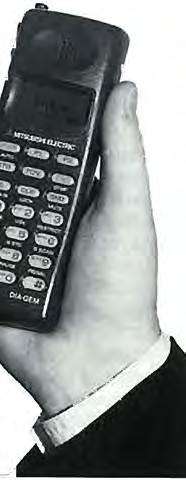

IN HIS EARLY YOUTH CHARLES WILliam George Wheeler was known to all and sundry, particularly the latter, as Master Wheeler. Nothing has changed, except of course his age. His appointment to Master of the Supreme Court of Victoria on 31/7/90 (hardly coinciding with the "tax" year) was one of the better kept secrets around the traps. The surprise however was a pleasurable one and, dare I say, a very popular one.
Married to Wendy, a qualified Yoga Teacher and Masseuse, Master Wheeler is well equipped to deal and cope with the obvious pressures and hazards a Master of Supreme Court will encounter - not to mention that son Greg recently graduated in medicine and daughter Prue in advertising can both help when the going gets rough or even tough.
"Wheeler" was educated at Brighton Grammar (a contemporary of Taxing Master Tom Bruce), completed his law course LL.B. at Melbourne part-time whilst employed in the Commonwealth Public Service. Articled to the late D.D. Bell the then Deputy Crown Solicitor in Melbourne "Wheeler" was admitted on 1111163. He signed the Roll on 20/4/64. He later read with K.J. Jenkinson now Jenkinson J. of the Federal Court of Australia. A solid general practice followed - although for many years in the workers compensation jurisdiction - both State and Federal - his personal-injuries and otherwise general practice was extensive.
Apart from "Mastering" eight readers including the late Tom Topham, Wilson, Gurabean, King, Fronistas, Burchill, Sutherland and Park, he, with Topham, managed to edit "Wheeler & Topham - County Court Practice".
In his spare time Wheeler sails a "Boomeroo 22" and in the tradition of ongoing achievement, has managed to achieve the impossible by "bottling" the 22' trailer/sailer on the Hawkesbury. Coincidentally with this activity, he operates a very "with-it" "Work Processor".
Presented to him by son Greg - he is the proud owner of a device, a "Two-up Brief" which is retained in Chambers and marked
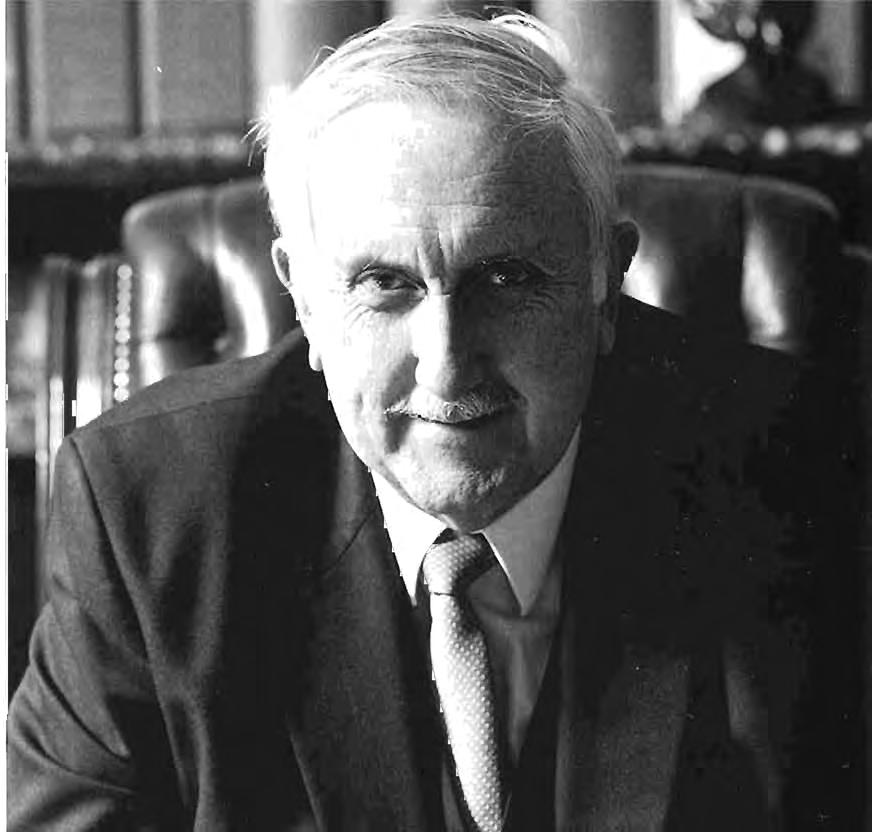

"Brieffor Masterly Inactivity". The order of battle in the list is thereby determined and matters for hearing decided namely; "2 Heads" - Defendant wins, whilst "2 Tails" gives the Plaintiff his chance - however, more often than not, one of each results in the coffee adjournment.
Master Wheeler brings to his office a wealth of
Master Wheeler experience and learning as well as pragmatic practical wisdom which will well serve the litigants who appear before him as well as the Court of which he is now a member.
The Bar extends its best wishes to him and is confident that his career as Master will be long and satisfying.



SIR RICHARD MOULTON EGGLESTON died on 16 January this year at the age of 81. He was a former Chairman of the Bar Council, a former judge of the Industrial Court and of the Supreme Court of the A.C.T., and a former Chancellor of Monash University.
On 20 February 1991, at a tribute to Dick Eggleston's life and work, Sir Reginald Smithers said of him:
"It is a loss to each of us that no more will we be able to meet with Richard Eggleston and talk with him. Such meetings were ever of happy nature and never in such meetings did he fail to lift one's spirits. It was always he that did the talking. Indeed, on the last occasion I met him in Little Collins Street shortly before his death he was on his way to his regular game of billiards. It was hardly an occasion for raising of the spirits because he informed me of his illness, of the imminence of his death. But this he did in such terms as reflected his ever rational approach to all problems. Death was the inevitable destiny of all men. Not a matter for tears or even distress. And true to his habit oflifting the spirits of all around him I left him uplifted and inspired.
He was a musician - one who could perform - and he was knowledgeable in all matters musical as befitted a member of the Elizabethan Trust responsible for choosing artists to be engaged in Australia by the trust. He was a family man. His relationship with his children when young being characterised by patience and compassion. He was a painter. He was a mathematician. He was, above all, an intellectual man who made friendships with all but inevitably, most importantly, with other intellectuals, both in Australia and overseas. He was a man of justice ...
He was a superb lawyer but it never fell to his lot to write judgments in the High Court of the land
We find him in all jurisdictions pitted against such people as Menzies, Burbank and Menhennitt. We find him in the Boilermakers' Case in 1956, the Bank Nationalisation Case in 1948, taxation cases from 1949 onwards, the Newton Tax Case in which he led for the appellant in the High Court with McFarlane Q.c., Kerrigan Q.c. and Nimmo against Tait, Menzies and Aitken. We find him journeying to the Privy Council on four or five occasions.
And of course there was his work in the Conciliation and Arbitration Commission as it then was.
The 40 hour case was the highlight of years of work in that medium. The case represented a triumph of persuasive effort
Sir Richard served as ajudge ofthe Commonwealth Industrial Court until 1974 when he resigned. He also served as a judge of the Supreme Court of the Australian Capital Territory for a lengthy period. There was insufficient scope for his talents on the Australian Industrial Court. He had great satisfaction in his work in the A.C.T., where he proudly asserted that he had never been reversed. And having done all these things, he retired in 1974 to devote himself to congenial pursuits, one of these was to devote himself to the study of the foundations upon which the law was administered ...
The result of the studies was production of the treatise, "Evidence, Proof and Probability". In this work he found full scope for his mathematical skills, particularly in relation to problems of probability. He also found scope for the most critical analysis of basic principles of English law and the application of those principles in many cases.
There is much to celebrate in the life of Richard Eggleston. He was a leader in all that he did. He loved his family and social life. He had a peerless intellect. And he entertained, instructed and inspired all with whom he came into contact."
MACfarlan Little was born on the 23rd of July 19b4. The son of a school headmaster, his mother was a sister to the Hon. Sir James Ross Macfarlan, a judge of the Supreme Court from 1922-1949. After attending the school at Wangoon, Douglas had his secondary education at Scotch College, and was later a resident student at Ormond College. He graduated from the University of Melbourne with Masters' degrees in both Arts and Law.
In 1928 he commenced articles with the then firm of Herman & Stretton; admitted to practice on the 1st of May 1929, Douglas practised as an employee solicitor until he signed the Bar Roll on the 14th of June 1930 and read with Norman O'Bryan. In 1931 he married Ida Chapple, a sister of a well known solicitor.
The early thirties were a bad time to start at the Bar and juniors had a very rough road but Douglas did as well or better than most and built up a solid common law practice. During the war from 1942-1945 he served in the R.A.A.F., attaining the rank of Wing Commander. On returning to Selborne Chambers at the war's end his capacity for hard work and his great forensic skill very soon resulted in a very substantial practice.
Those appearing against him found he was a formidable opponent who gave no quarter. His cases were prepared with meticulous care. Before he took Silk in 1954 he had a number of readers including Norman O'Bryan Jnr., Sam Gray, Steven Straus and Bruce McNabb all of whom became judges.
In 1959 Douglas was appointed to the Supreme Court. I have no personal knowledge of his form as a judge, but I gather that he was a strong judge who expected counsel to attain his own high standard and was somewhat less than sympathetic to those who failed that test. His reported judgments are models of lucidity and reflect his intellectual competence. Douglas was knighted in 1973. He retired in 1974, some two years before the statutory age of retirement.
I have known Douglas since our schooldays when we were contemporaries of Alister Adam and Frank Nelson. One aspect of his character well known to his friends but not always recognised by others was his keen sense of humour, displayed on many occasions, even including the odd note passed to me when we were sitting together in the full Court.
Douglas's death on the 30th of November 1990 brought to a sad end our long friendship. His wife Ida had predeceased him in February of the same year. The Littles had one daughter, Glenis, (Mrs. Donald Payne), of whom they were rightly very proud. To her our deepest sympathy.
Esler Barber
SIR JOHN NORRIS, A JUDGE OF COUNTY Courts 1955-72 and the Supreme Court 197275, died on 21 May 1990. He had then been a member of the Victorian Bar for very nearly sixty-five years, having signed the Roll on 11 June 1925. Of the 120 or so members of the Bar at that time, only F.F. Knight, who signed in 1922, has survived him.
John Gerald Norris was born in Camberwell on 12 June 1903. His father, John Alexander N orris, had been brought to Australia from Ireland as a boy and was Auditor General for Victoria 1919-37. His mother was born Mary Ellen Heffernan, in Victoria but of Irish parents. So the blood in his veins was entirely Irish.
The young John Norris attended Camberwell State School and later Melbourne High School. In 1920, he enrolled as a law student at the University of Melbourne and as a non-resident student at Ormond College. At the end of 1923, he and his friend Percy Feltham, another Ormond man, topped the final year of the law course and shared the Supreme Court Prize. Thirty years later, to his great pleasure, his daughter Rosemary repeated that success, topping the final year of the law course in 1954.
Graduating as a Master of Laws, he was articled to L.H. Braham, a member of the firm of city solicitors Braham & Pirani. He was admitted to practice on 1 May 1925. He signed the Victorian Bar Roll six weeks later and com-
menced practice as a barrister, reading with c.J. Lowe, who was shortly to become ajustice of the Supreme Court and later Sir Charles Lowe. Those were the days when briefs to members of the junior bar were few and far between; and so far as one can make out, if a man did receive a brief, all his friends turned to and helped him prepare his case - in return for which, he would take them out for a cup of coffee on the strength of the fee he expected to receive.
John Norris married Ada Bickford on 6 July 1929 and they set up house in Camberwell. In due course, there were two daughters of the marriage: Rosemary Balmford, currently a Senior Member of the Commonwealth Administrative Appeals Tribunal, and Jane Norris, currently Head of the Department of Design at the Australian Film, Television and Radio School in Sydney.
John Norris frequently talked of the great men at the Bar in the 1920s and 30s - especially Latham, Dixon, R.G. Menzies - and what he had learned from them. He had an enormous admiration for Sir Owen Dixon who was very important to him and whose table talk he often quoted. He was a member of the Committee of Counsel for five years in the thirties and again 1952-55, being honorary secretary 1939-50. He became a great authority on the etiquette and ethics of the Bar and was well known for the pains he took to resolve any difficulties arising among its members.
During the twenties and thirties, John Norris was an officer in the part-time army, in the Sixth Battalion, Royal Melbourne Regiment. He served full-time from 1939 to 1945, at first in the AMF and from 1941 in the AIF. He also served with the American Sixth Army and was present in April 1944, as an observer, at the American landing at Hollandia where he waded ashore some hours after the first wave of troops and prepared an elaborate report on the operation.
On his discharge from the Army, with the rank of Lieutenant-Colonel, he resumed practice at the Bar. In 1950, he was offered an acting County Court judgeship and he held this position for some months into 1951. He became King's Counsel in 1950, while actually on the County Court bench; and afterwards resumed practice until he became a permanent Judge of County Courts and Chairman of General Sessions from 1955.
In 1952 he became a member of the Standing Committee of Convocation of the University of Melbourne, elected to represent graduates in Law. From 1962 to 1965, he was Warden of the Standing Committee and from 1965 to 1981, a member of the Council of the U ni versity. He was President of the Medico-Legal Society of Vic-
toria 1958-9, and a frequent speaker in discussion at meetings of the Society. In 1964 he was appointed Honorary Colonel to the 4/19 Prince of Wales's Light Horse Regiment, an appointment he held until 1972. During that time, he took a keen and active interest in all aspects of the Regiment and attended many training and social activities. In 1966, when he was 63, he visited a Troop of the Regiment which was serving in Vietnam; and went out on a patrol with them.
In each of the years 1968 to 1972, John Norris acted for a time as a Supreme Court Judge; and finally received a permanent appointment to that Court from 1972. He remained there until he reached the statutory retiring age and in retirement served on several inquiries of importance.
In 1975-6, he was Royal Commissioner into matters surrounding the administration of the law relating to prostitution in Western Australia: a task which earned him a good deal of ribbing from his friends - some who pretended to think him too innocent in the ways of the world to deal with such a subject, others who pretended to think him only too well acquainted with it. In 1976- 78, he was Chairman of a committee, appointed by the Victorian Government, to examine and advise on recommendations made by a Board of Inquiry into allegations against members of the police force. In 1979-80, he conducted an inquiry for the Victorian Government into the law relating to coroners and in 1980 an inquiry into the concentration of ownership and control of the press.
In 1980, the University of Melbourne admitted John Norris to the Degree of Doctor of Laws honoris causa - an honorary degreee to which his wife, by now Dame Ada Norris, was admitted on the same day. A little later on, in the New Year's Honours List of 1981, it was announced that he was knighted.
In his last years, Sir John attended pretty regularly, three or four days a week, at the office of the Victorian Law Reform Commission, where he commented, in a voluntary capacity, on some of the matters receiving the Commission's attention. He became ill in the early part of 1990 and died on 21 May. Dame Ada had died in July of the previous year.
Peter Balmford
ON SUNDAY 23RD JUNE 1991 K.T. "Keith" Smith returned with his wife Joan from the first convention held in Australia of Lions International. It had been a pleasurable and rewarding experience for Keith because he was a past District Governor and was currently the Constitutional and By-laws Chairman for Aus16
tralia. He had renewed many acquaintances and had made a positive contribution. Only a good night's rest separated him from his return to his chambers to resume his practice which he had conducted successfully for thirty-three years. His sudden death intervened.
At the time when he became the 577th Signatory to the Victorian Bar Roll on 17th April 1958 Keith Smith had already conquered the physical adversity of blindness. He had passed thirty-two subjects and had graduated in arts and law at Melbourne University. He had married Joan on 3rd June 1950 and was the father of two lovely daughters.
Keith Smith's approach to life at the bar was in accordance with its best traditions. He read in the chambers of Peter Murphy - now Mr Justice Murphy of the Supreme Court of Victoria. He quickly established a buoyant and successful practice with specialties in accident compensation and personal injury litigation. He was at all time fiercely independent. He was a perceptive and skilled advocate who established an entitlement to deference from the bench, respect from opponents and the admiration of all with whom he was associated.
The success of Keith's career at the bar will serve for all time as a tribute to his brilliant intellect, his skilful advocacy and his extraordinary powers of retention. He was a man of infinite patience and captivating charm. Although unsighted he was a man of perception and vision.
It was said at his funeral that he had taught his mother and brother to drive a motor car. During the approximate period often years when he accompanied the writer to chambers he also gave me some lessons in the art of driving. His acute perception enabled him to sense that minor infringements of the road traffic regulations were in progress from time to time.
Throughout his life Keith supported the Essendon Football Club. He attended many games and I am satisfied that he saw as much of those games as did many other Essendon supporters including myself. Later in his life he followed the interests of his grandchildren who played with distinction in junior competitions with Strathmore Football Club.
Keith's service to the community was recognised officially in 1975 when he was awarded the Order of Australia. He was a life member of the Royal Melbourne, Royal Childrens and Austin Hospitals. A public park at Strathmore also proudly bears his name.
The many friends of Keith Smith at the Victorian Bar and throughout the legal profession join his wife and family in mourning the departure of an inspirational man and a good friend.
May he rest in peace.
Frank Walsh




l. PREFACE
1.1 This statement is issued by the Australian Bar Association, which represents all those barristers in Australia who practise as members of an independent Bar. Each President or Chairman of each constituent body of the Association has signed the statement. It represents the considered views of the Association on a matter of 2.4 national importance.
1.2 The statement is concerned primarily with the independence of the judiciary, judges, masters, judicial registrars and magistrates. They are members of the various Australian courts. There are, however, in addition to the courts, other bodies which are not courts but which must exercise their powers in a judicial manner; one aspect of which is that they must operate independently of those directly affected by such exercise. Hence the statement is also concerned with the independence of the members of these tribunals or other judicial or quasi-judicial bodies.
2. INTRODUCTION
2.5
2.1 The institutions of a democratic society require careful guardianship. Even Australia, with its rich democratic tradition, cannot assume that the foundations of its liberty are impregnable. On the contrary, those foundations are necessarily fragile; and although not now in danger of direct attack, they are susceptible to many corrosive influences. These in turn are made the more dangerous by that complacency which inevitably accompanies an absence of a present and immediate threat. 2.6
2.2 An independent judiciary is a keystone in the democratic arch. That keystone shows signs of stress. If it crumbles, democracy falls with it.
2.3 This is not likely to happen with dramatic speed. The situation is nevertheless of 2.7 sufficient concern to warrant a public warning of the danger. Moreover, although somewhat paradoxically, the fact that the
18
danger is not immediate is its own justification for giving present attention to it.
Just as the prudent sailor does not wait for the storm before commencing necessary repairs to his ship, so there are in addressing the question of judicial independence at a time when it is not among the political issues of the day.
But these are not the only reasons for the publication of this statement, or for its timing. It is at times helpful, even necessary, for any society to re-assess its constitutional structures. As Australia approaches the centenary of federation, it is appropriate that the Constitution and the institutions which underpin Australian society be the subject of careful and balanced scrutiny. If this paper stimulates reasoned debate among reasonable people in an atmosphere conducive to rational argument, then it will serve one of its purposes. If it persuades those in positions of leadership and influence, whether lawyers or not, then its primary purpose will have been accomplished.
The subject is not of merely academic interest. It touches upon the eternal conflict between authority and freedom. At its core is the general truth that if power is coupled with the opportunity to use it in ways which are, or are perceived by the wielders of power to be, in their interests, then it will be so used, whether legitimately or not. It is the task of the judiciary to ensure that power is only exercised according to law. Without judicial independence, that task is impossible.
Power in contemporary Australian society resides increasingly with the executive arm of government. Parliament, for all its strengths in other areas, does not consistently control, but rather is often controlled by, the executive.
In these circumstances, it is inevitable that the executive will from time to time exceed its lawful authority unless checked by an independent body the decisions of which
are binding. The judiciary is the only instrument equipped to act as guardian of the public interest in this field; and there appears to be almost unanimous community acceptance not merely of that proposition, but also of its corollary: that only a judiciary independent of the executive will be able effectively to ensure that executive power is exercised lawfully. In these circumstances, it is not surprising that the rhetoric of politics commonly includes expressions of support for an independent judiciary.
We emphasise at the outset that the independence of which we speak does not have as its end the provision of personal benefits to individual judges. It is conferred for a purely public purpose: to insure that the courts dispense justice and are seen to do so.
2.8 The Australian Bar Association does not doubt that, in general, these expressions are sincerely meant. In practice, however, rhetoric and reality do not invariably coincide. Those, including members of the executive, who have the power and the incentive to achieve a particular end are not always astute to guarantee a correspondence between fine sentiments on the one hand and the end, or the means adopted to achieve it, on the other. Moreover, the generalities of rhetoric are not uppermost in the minds of those preoccupied with the pressing problems of the day. Politicians and bureaucrats do not necesarily appreciate the impact which their actions and decisions may have upon the delicate structures on which judicial independence depends. It is a matter of extreme regret
that some do not even appreciate the crucial role of the judiciary in the maintenance of the democratic system which it is their duty to uphold and without which their own liberties as politicians, public servants and citizens would disappear. The result is a piecemeal, insidious, and very dangerous atrophy of judicial independence.
2.9 We emphasise at the outset that the independence of which we speak does not have as its end the provision of personal benefits to individual judges. It is conferred for a purely public purpose: to insure that the courts dispense justice and are seen to do so. Moreover, that independence is, generally speaking, restricted to the freedom from pressures which might influence a judge to reach a decision other than that which is indicated by intellect and conscience following an honest and careful assessment of the evidence and application of the law. No judge is ever independent of the law itself. He or she, of all people, must be the servant of the law.
2.10 The maintenance of judicial independence is in part the responsibility of the judges themselves. If they are to be independent, they must be impartial; and if they are to be impartial, they must free themselves of prejudices which might interfere with their ability to make a balanced assessment of the facts.
2.11 This does not mean that judges should divorce themselves from a general framework of beliefs. That would be impossible, even if it were desirable. Nor does it mean that judges should enter a cloistered world away from the pressures and influences which bear upon mankind generally. To the contrary, a good judge understands these things, has an empathy with his or her fellows, and recognises that "the great tides and currents which engulf the rest of men do not turn aside in their course and pass the judges by": "Judicial Reasoning": paper presented by Professor C.G. Weeramantry (now Judge Weeramantry of the International Court of Justice) at the Commonwealth Law Conference, Auckland, New Zealand, 16-20th April, 1990, pp.14-15.
2.12 All of which is to say that good judges are persons of rare quality. The community, and particularly governments, must for their part maintain those conditions in which the independence of the judiciary is best nurtured and protected. It is to this issue, and to Australia's record in relation to it, that we now turn.
3.1 In the first place, judges must be appointed to office until a specified retirement age appropriate for the end of a career. As a corollary, they must be protected against removal except on the address of both Houses of Parliament (a unicameral system would obviously require a slightly different provision) seeking such removal on the grounds of proved misbehaviour or incapacity. The reason is obvious ifindependence is to be protected. The Constitution (s. 72) enshrines such a provision.
3.2 The Constitution, however, does not protect judges of State courts. Nor does it protect the members of bodies (whether Commonwealth or State) which, although having powers of adjudication over disputes between the parties before them, are not courts. Their protection, to the extent that they have any at all, comes from legislation or from the common law. That given by both combined may not amount to much. For example, the effect of ss. 7 & 99 of the Conciliaton and Arbitration Act 1904 (Commonwealth) was that presidential members of the Australian Conciliation and Arbitration Commission should not be removed except by the GovernorGeneral, on an address from both Houses of Parliament in the same session, praying for removal on the ground of proved misbehaviour or incapacity. But those provisions did not protect Mr. Justice Staples (as he then was).
3.3 In early 1975, James Staples was appointed a presidential member of the Commission. Sections 7 & 99 of the Conciliation and Arbitration Act applied to him. He was appointed until he reached the age of 65 years. This will not occur until 1994. No address from either House of the Commonwealth Parliament has sought his removal. Yet he has lost his job.
3.4 The Conciliation and Arbitration Commission has been replaced. All its presidential members, except Mr. Staples, were appointed to its successor, the Australian Industrial Relations Commission. By this device, the Commonwealth rid itself of someone who was not ajudge, but who held an office which demanded of its occupants the independence which judges must have.
3.5 The Staples case is not unique. Indeed, the shameful record extends beyond the cases of members of bodies such as the Concili-
ation and Arbitration Commission to members of courts to which the Constitutional protection applies. This was graphically demonstrated when, in 1977, the Federal Court of Australia acquired the jurisdiction of the Australian Industrial Court. All the judges of the latter, except two, were appointed to the former. The two who were not so appointed, Justices Dunphy and Joske, nominally retained their seats on the Industrial Court, but the jurisdiction of that court had been absorbed by the new body. They were, therefore, in effect selected by the Government for compulsory retirement. The appointment of each had been for life No step was taken against either for removal based upon misbehaviour or incapacity. As with Mr. Staples, a fair inference is that the Government did not like some of their decisions.
They were, therefore, in effect selected by the Government for compulsory retirement. The appointment of each had been for life. No step was taken against either for removal based upon misbehaviour or incapacity. As with Mr. Staples, a fair inference is that the Government did not like some of their decisions.
3.6 The same thing occured in 1982. The Government of New South Wales declined to appoint to the new Local Court five magistrates who had sat in the Courts of Petty Sessions, which the new court replaced.
3.7 State judges are generally much more exposed in relation to tenure than their Federal counterparts. For example, it is within the competence of a State Parliament (except perhaps that of New South Wales) to pass legislation by which ajudge is deemed to have retired. In other words, the Parliaments of the States other than New South Wales are legally empowered to remove a judge at pleasure: McCawley v.
The King (1918) 26 C.L.R.9 at pp. 58-9. They need not proceed to effect a removal by the device of forwarding an address, passed by each House, to the Governoralthough, of course, such a course is open to them. And even here it is only convention which limits such an address to proved misbehaviour or incapacity. A parliament , not being bound by convention, might forward an address seeking the removal of a judge simply because he or she had , for example, ordered the production of government documents to a private litigant opposed to the Government.
3.8 The expedient of sending a judge into involuntary retirement was adopted in New South Wales early this century. Mr. Justice Sly was retired by the Judges Retirement Act 1918. In Queensland, the Judges Retirement Act 1921 retired Chief Judge Cooper and two other judges of the Supreme Court (Justices Real and Chubb).
3.9 The Australian Bar Association has sympathy for any person who is wrongfully dismissed But the personal fate of the judicial and quasi-judicial officers referred to above is not the point. We are here concerned with the public dimension of the wrong done by those who removed them . By that action, the ability of courts and tribunals to act, and be seen to act, impartially, is diminished The colleagues of those dismissed cannot but be mindful of what has happened. The vast majority of those remaining will have that moral fortitude which will not allow the relevant events to affect their judgement. There will be some who are not so robust. Even if all remain unaffected, a public perception of partiality will be encouraged. The losing litigant is likely to think that he or she has lost because the judge was influenced by fear of the consequences if judgement went the other way. To illustrate the point, one need only imagine the reaction if the committee of a sporting club were to seek (or the consequences if it were to obtain) the power, which no other club in the association was to have, of adding persons to, or removing them from, the panel of umpires. Yet that is precisely the power which the Victorian Government , one of the litigants most commonly before the Victorian Administrative Appeals Tribunal, has over the majority of members of that Tribunal.
3.10 If the judiciary is to be independent, then judicial officers must also be protected
against a diminution in their remuneration during their period in office. That principle is recognised throughout Australia There are a number of associated principles. First, the value of judicial salaries must not be allowed to decline against wages and salaries generally, nor against the most nearly comparable salaries in particular. Secondly, judicial salaries must be set by a body independent of government; and both governments and parliaments must be bound by its decisions. Thirdly, those salaries, and the working conditions of judges , must be such as to attract to the office persons capable of meeting its extraordinary demands.
3.11 These associated principles are frequently disregarded by those who should be bound by them.
3.12 Examples of the matters about which the Australian Bar Association complains are not hard to find. We will use here but one of many. On 15 December 1989, the Federal Government, in submissions to the Remuneration Tribunal, argued for an increase in the remuneration of Federal judges. Before any decision on the matter was made by the Tribunal, the Government revised the submissions so as to argue for a lower increase . The Tribunal accepted the revised submissions, and accordingly on 23 May 1990 recommended that an increase of 6% should apply as from 1 January 1990 with a further 6% from 1 July 1990. Thus, for example, the Tribunal supported an increase in the salary of the Chief Justice of the Family Court of Australia from $135,650 per annum to $144 ,000 per annum as from 1 January 1990, and $154,000 per annum as from 1 July 1990.
3.13 In spite of all this , the Government , in another change of mind, refused to accept the determination of the Tribunal. First, it set the amount of the initial increase actually paid (in the case of the Chief Justice of the Famil y Court) at $143,709. Secondly, it determined that although this increase was smaller than that fixed by the Tribunal, its introduction should be delayed by six months until I July 1990 As from 1 January 1991, the salary of the Chief Justice of the Family Court was increased to $152,416. Other judges were treated in like fashion.
3.14 The end result was a reduction, actively promoted by the Government, in the real value of the salaries of Federal judges Doubtless the Government believed that there was justification for this. And the

Australian Bar Association accepts that wage restraint in the community generally should be taken into account, and in appropriate cases reflected in, the level and rate of increases in judicial remuneration. What is quite unacceptable is government interference in the process.
3.15 The Australian Bar Association stresses an additional fact. Judicial salaries have not kept pace with those with which they were formerly, and properly, comparable. For example, the salary of the Chief Justice of the High Court of Australia was for many years at the same general level as that of the Governor of the Reserve Bank. The latter now enjoys remuneration considerably greater both in absolute and comparative terms. The Association views this situation, which extends far beyond this one

general level as that of the

instance, with grave disquiet.
3.16 The Association of course recognises that the argument here has, again, a personal as well as a public dimension. Weare concerned only with the latter. It is on the latter alone that the argument stands or falls. Thus, the Remuneration Tribunal might consistently determine levels of judicial salary below those accepted by government. That would not be a proper reason for returning the issue to government control.
3.17 Over recent years, governments have created a large number of different tribunals. The jurisdiction of many of these might with equal or greater appropriateness have been conferred upon or left with the courts. There is little legitimate point in giving independence to judges while re-
moving from them jurisdiction which is then conferred upon tribunals which are not independent. In particular, it is totally inappropriate that presiding members of a tribunal which must decide matters in which governments or public authorities are directly interested do not have the independence of a judge.
3.18 There are many examples, apart from those to which we have referred, which illustrate, at best, governnment insensitivity to issues of judicial independence. We trust that the point has been made. The independence of the judiciary is not appropriately protected in Australia. Reform is therefore necessary, and must be initiated at once. It is to this that the statement now turns.
4.1 Removal from Office
4.4.1 Machinery appropriate to deal with judicial misbehaviour should be put in place forthwith, by suitably entrenched legislation; and judges should not be removable except on the proper operation of that machinery.
4.1.2 Allegations (which have been appropriately vetted) of such serious behaviour as would, if proved, warrant the removal of a judge should be placed before a special tribunal the membership of which is not subject to political manipulations: an appropriate scheme would include a tribunal, brought into existence only as occasion requires, consisting of not less than three judges or retired judges of superior Federal, State or Territory courts selected according to pre-determined procedures established by statute. In short, the appropriate machinery and the principles upon which it operates should not be left to ad hoc arrangements.
4.1.3 It may be that, after proper investigation, the special tribunal or commission will not find that the case for dismissal has been made out. If so, the matter should go no further. If, on the other hand, it were found that an allegation concerning the ability or behaviour of a judicial officer is substantiated and could justify removal, then that finding should be laid before both Houses of Parliament. On the address of both Houses, the Governor-General or Governor (according to the
circumstances) may remove the judge concerned.
4.1.4 The misbehaviour which might set the machinery for removal in motion should be limited to that which, if proved, would undermine to a serious degree public confidence in the fitness of the judge to perform judicial functions. Any complaint which if substantiated would, by contrast, not so undermine public confidence can be left for resolution to the court of which the judge is a member.
4.1.5 Investigations into the conduct of a judge must be confined to specific allegations which appear to have substance in fact. Disappointed litigants will always have a motive to complain about the judiciary. Care must therefore be taken to ensure that unwarranted complaints are not given more credence that they deserve. Accordingly, proper vetting processes must be introduced to guard against action upon unjustifiable complaints from disgruntled litigants. These complaints, to the extent that they are baseless, constitute a threat to the independence of the judiciary.
4.1.6 There is another reason why investigations into the conduct of ajudge must be confined to specific allegations which appear to have substance in fact. The point is made in the second part of the Commission of Inquiry into the conduct of Mr. Justice Vasta. One of the tasks of that Commission was to investigate whether "any behaviour of the judge warranted his removal from office". The three retired judges who constituted the Commission said at p. 39 of that report:
"The Commission, as a result of its experience in conducting this inquiry has formed the clear opinion that the holding of an inquiry into the question whether "any behaviour" of a judge warrants removal is open to grave objection. It is one thing to inquire into specific allegations of impropriety but it is quite another to conduct an inquisition into all aspects of a judge's life. An inquiry of the latter kind exposes the judiciary to unacceptable risks that pressure will be applied to its members and becomes especially dangerous if instigated by pressure groups or as a result of media clamour."
4.1.7 The protection for which the Australian Bar Association argues in this statement should extend to the judges of all superior and intermediate courts. Magistrates should perhaps be placed in a different position. They should not be removed except on motion brought by the Attorney-General before a Full Court of the appropriate Supreme Court and after incapacity or serious misbehaviour has been proved.
4.1.8 Appropriate provision, always embodied in legislation, should be made for presiding members oftribunals before which governments or public authorities are or may be parties. In many cases, such members should be given at least the same degree of protection as is urged for magistrates. In every case, the extent of protection must match the extent of exposure of the office in question to illegitimate pressure.
4.1.9 From time to time governments appoint acting judges. This is usually for the purpose of disposing of a temporary backlog of cases waiting to be heard. Often the temporary merges into the permanent. The special danger is the creation of a permanent system of temporary judges. Those who hold acting appointments but who seek or are thought to seek permanency cannot be seen to be independent of government. It would be difficult, under such circumstances, to be independent in fact. Moreover, no politician who had recently been on the wrong end of the judgment of an acting judge could be seen to be impartial if the question of that judge's permanent appointment were before that politician.
4.1.1 0 It is for this reason that the Australian Bar Association has grave reservations about acting appointments. It may nevertheless be that, given the strictest possible safeguards (for example, only appointing those who do not seek permanency), acting appointments can be justified on the ground that in the particular circumstances of a particular jurisdiction there is no practicable alternative. But a perm a-
nent system of acting appointments cannot be justified.
4.1.11 One safeguard has been suggested. It is that, to ensure that the expedient of temporary appointments was only availed of in circumstances which justified that measure of last resort, no acting appointment should be made until the Chief Justice or Chief Judge (as appropriate) certified accordingly ; and such appointments should only continue for such period as the Chief Justice or Chief Judge certifies to be necessary.

4.2.1 Courts cannot dispense justice according to a formula. Likewise, ordinary principles of administration do not apply to the judicial process. Their application would result in injustice, as well as much other harm. It is nevertheless tempting for a bureaucrat to assess the efficiency of the courts in terms which are incompatible with their true function. In order to avoid this, the judges must themselves be responsible for the administration of the courts of which they are members. The Australian Bar Association agrees with Mr. G.E. Fitzgerald Q.c. who, in the Report of a Commission of Inquiry pursuant to Orders in Council into possible illegal activities and associated police conduct said (at p. 134):
" The independence ofthe jUdiciary is of paramount importance, and must not be compromised. One of the threats to judicial independence is an overdependence upon administrative and financial resources from a government department or being subject to administrative regulation in matters associated with the performance of the judicial role. Independence of the jUdiciary bespeaks as much autonomy as possible in the internal management of the administration of the courts.
4.2.2 The judicial arm of government relies upon the legislative and executive arms for the resources necessary to fund the operations of the courts. This reliance cannot be eliminated. It nevertheless carries with it the inherent risk that he who pays the piper will try to call the tune. It is vital that this risk be reduced to the irreducible minimum.
4.2.3 Courts must therefore have the right to control their premises , facilities and staff. This is a necessary element of an independent judiciary. Otherwise, to take an extreme example , a government could hamstring the courts by removing staff and other support facilities. The Australian Bar Association agrees with the Chief Justice of South Australia , who in an article entitled " Minimum Standards of Judicial Independence" published in (1984) 58 Australian Law Journal 340 at p. 341 said:
"It is essential that control of court buildings and facilities be invested exclusively in the jUdiciary The court must have the right to exclusive possession of the building or part of the building in which it operates , and must have power to exercise control over ingress and egress, to and from the building or part thereof. The court must have power to determine the purposes to which various parts of the court building are to be put and the right to maintain and make alterations to the building. If a court is not invested with such rights of control over its buildings and facilities , its independence and its capacity to properly perform its function are impaired or threatened in a number of respects. "
4.2.4 It is nevertheless appropriate here to make a general point. It is the duty of each court, within the limits of the resources and powers avail-
able to it, to dispose of its business as quickly and efficiently as is compatible with its primary duty: the dispensation of justice. In this context, the Australian Bar Association recognises that the involvement of government may be necessary if a particular administrative problem is to be solved. Extreme care must be exercised in those cases to ensure that such involvement does not compromise judicial independence. It should never encroach upon the judicial functions of the court. It should never be initiated until the relevant Bar Association and Law Society have been consulted.
4.2.5 An independent judiciary is a judiciary in which each individual judge is free from improper pressures. Subject of course to appropriate appeal structures, it is incompatible with an independent judiciary that one judge should be subject to the control of another in the execution of the duties of his or her office This danger is reduced if the administration of the courts is the responsibility of the judges as a whole (or a representative committee of them) rather than the head of the court or an unrepresentative committee.
4.2.6 The right of a court to control its premises, facilities and staff should be entrenched by statute. It must then be a first priority of government, subject only to unavoidable budget constraints, to provide the courts with the necessary funds.
4.2.7 Without adequate funding, ostensible independence is reduced to a myth. The Australian Bar Association wishes to emphasise that a social order compatible with an advanced, civilised society is unattainable unless governments are prepared to provide the courts with the facilities required for the proper discharge of their duties. It follows that the number of judges must be adequate and that their support staff and facilities must be such as to enable them to work at their optimum level.
5.1 Civilised society may be judged, in part, by
the restraints which it imposes upon the use of power. Human nature being what it is , unchecked power will inevitably be used in ways which are unjust. The misuse of power and mankind's attempts to combat the tyranny which results are central themes of the history of civilisation.
5.2 Human ingenuity has been able to devise only one effective mechanism for restraining the misuse of power. That mechanism is the rule of law, which may be roughly defined as the governance of society by laws, to which all citizens, bodies corporate and governments are subject, made with the general concurrence of society and enforced impartially. The role of law therefore has as one of its opposites the imposition of order by the use of arbitrary might. Another opposite is the absence of order. At its apex is an independent judiciary.
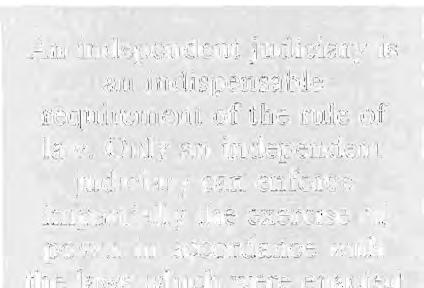

5.3 An independent judiciary is an indispensable requirement of the rule oflaw. Only an independent judiciary can enforce impartially the exercise of power in accordance with the laws which were enacted to control that power. And it is the universal and impartial application of the law, so that the actions of every man, woman and child are ultimately controlled and limited by laws enforced by somebody else, that is the essence of a society in which freedom and order and justice each receive their due.
5.4 The legal profession has not in the past done enough to secure the independence of the judiciary, or to guard against the at times grossly improper interference with that independence. The Australian Bar Association will in the future do everything in its power to ensure that these mistakes are not repeated.

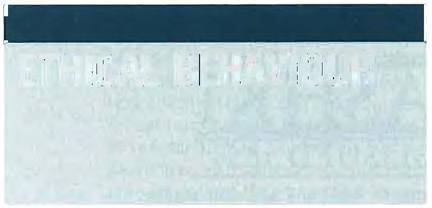
RULES OF PROFESSIONAL ETHICS ARE the code which a body of people adopts in order to govern their behaviour. So the rules, and the reasons behind them, show what those people want to appear to be to the outside world. If the rules are enforced, they show what those people want to actually be. Our ethical rules are the same. Despite the bad press which lawyers often get, a reading of the ethical rules and rulings will show that barristers do in fact want to behave honourably and fairly. The cynic may say that ethical rules are there because they are needed but in fact they are there to keep out those who would demean the profession by their conduct, and the rulings on them guide those who are in the profession by showing how, in past cases, professional ethical dilemmas have been worked out, and how the conflicts of the various interests with which the lawyer is concerned have been resolved.
You need never feel embarrassed or defensive about following any of our ethical rules. Take for example the case where your duty to the court requires that you disclose to it a case directly in point which is against your client's interests. Probably your client will not thank you for complying with your duty to the court. But if he is honest he will understand, provided that the reason is put to him properly. An honest client can't object to his lawyer being honest, and you shouldn't worry about the attitude of the dishonest ones. Some people may regard some of our rules as the quaint offshoot of bygone days, but they won't mind you acting ethically according to your rules, if they know why. They might well start to worry if you didn't, even if they thought the rule silly. All of the rules have a reason for them, if you think about it, although not all reasons are equally as good. So, always do what you think is right, and not just what is expedient, or what might advance the cause of a particular client. The best advice I ever got was from my Master (Strauss J). He told me never to put my head on the chopping block for a client. You may often be tempted to do so, perhaps through sympathy. However you are not there to solve clients' life problems for them, only their legal ones.
You should always speak to some-one if you
think that you have an ethical problem. Doing so sorts things out, and will also provide moral reinforcement for you with respect to your chosen course of conduct. Members of the Ethics Committee are always available to be spoken to, so never feel diffidence about ringing up, or calling in, for advice.
From the point of the public reputation of the profession conduct which disenchants clients with lawyers should be avoided, if possible. If you put yourself in the client's position, you can probably see what to do and what to avoid. Delay, for instance, is an old problem with the law, although complaints about it are not as frequent as they once were. Delay is something which can probably be easily a voided provided that reasons for it are genuinely recognised. Sometimes it is just pressure of work. If you can't do a matter because of too much work, then say so openly and return the brief. Don't just ask if the solicitor wants the brief back. He will think that a new barrister will take another 6 months to get to the same stage, and leave it with you. If you don't want to return it, then do it at once. This is because a common reason for not doing old work is that a mental block about doing it is established. The longer it is not done, the more it is resented and the less likely it is to be done at all. When you actually do it, it will be easier than you thought. If it is difficult, talk to someone about it.
Complaints are sometimes made about attitudes to the client (or to the case) during conference. It may be necessary to take a critical line as to some aspects of one's instructions, but some clients may not understand that a critical examination of their case is in their best interest, either as preparing them for cross-examination or as showing where their case is weak. A client will appreciate a discussion of good and bad points together, rather than a speedy denunciation of the case, mentioning only the bad ones. And sometimes one can get cross with a difficult client. However it is after all his case, whether it is a loser or not, and he is entitled to courteous treatment. You can always explain beforehand what you are about when criticising the client's view of the matter.
Complaints also occur about settlements. Some clients complain that they didn't authorise a settlement, or that it was forced on them by various pressures of time, or behaviour they found overbearing. You should always carefully explain to a client what his settlement is, and what it means. He should be given time to think about it. In cases which look difficult, the client could sign or initial your note of the terms. Unfortunately not all clients are reasonable, and anxiety to settle a bad case by what is a good
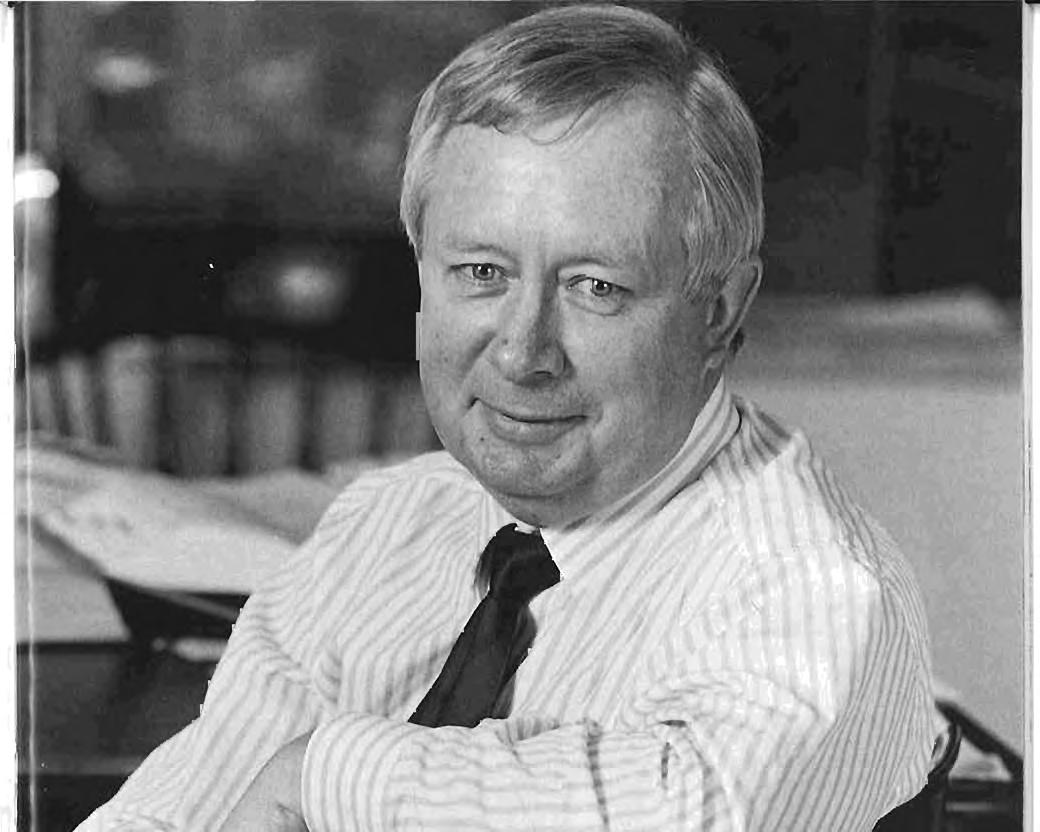
settlement in the circumstances can make anyone come across a bit one-sided in the client's own interest. It is however the client's case. You can be firm and tell him he should accept expert advice , but in the end it may be better for a client to lose the case, and think that the law or the odds were against him, than to believe that he sold out, or was sold out. And, from your point of view, fighting gamely against insuperable odds will enhance your reputation , in the end
Sometimes the client thinks the case should be conducted in a different way. This category of complaint concerns things like not cross-examining with the vigour the client would like, or not asking questions he wants asked, or not putting the points he wants argued. But you are the expert, and (at least so far as the mechanics of conducting the case go) you should conduct it as you see fit. Your method of conducting it will
depend on a lot of things, ranging from your own temperament to the perception that you have of the best tactics to pursue. However if the client has an arguable point which he wants put, prudence, or common sense, probably means that you should put it , unless you think that to do so will do the case harm. It may after all be a winning point , and there are many cases where a winner comes up late from the back of the pack.
Most problems can be avoided by reading Gowans, by talking to someone, and by a little common sense . Most of the Ethics Committee cases are not ones of flagrant or great ethical breaches.
Perhaps this is because we are, overall, an ethical profession .
Graeme Uren

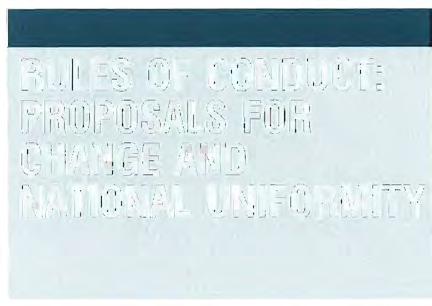
each rule the corresponding provision in the Victorian Re-statement and/or the relevant passage from the general text of Gowans. This tedious task was undertaken by Daly, and her draft was settled by Hansen Q.c. By then it was late 1989, and the draft which went before the Committee ran to 122 pages
SIR GREGORY GOWANS' BOOK THE Victorian Bar: Professional Conduct, Practice and Etiquett e (1979) has beeri out of print for some time. Part III of that book deals with "Conduct, Practice and Etiquette", and Chapter 2 thereof sets out the "Re-statement of Basic Rulings on Professional Conduct and Practice" made by the Bar Council for the purposes of s 14B(c) of the Legal Profession Practice Act 1957. Those rulings do not purport to be (and perhaps no rules could be) an exhaustive statement of the ethical obligations ofa barrister, and the balance of Part III of Gowans takes the subject further, whether by way of elaboration upon the Re-statement itself or by way of statements of supplementary rules and principles. Rather than produce a second edition of Gowans in its present format, consideration was given to drawing up a comprehensive code defining the ethical obligations of barristers. On 3 November 1988 the Bar Council formed a Committee for the purposes of considering the revision and republication of the ethical rules. This Committee consisted of Hansen Q.c. Bongiorno Q.c. and Jessup Q.c., and Cavanough was later co-opted as an additional member.
It was also apparent , when the Committee was appointed , that our profession was increasingly becoming a national one. Members of the Victorian Bar often appear interstate, and barristers from interstate often appear in Victoria That they should be bound by rules of conduct which differ in important respects , depending upon the place in Australia where they happen to be at the time, seemed to be quite inappropriate. The Bar Association of New South Wales has a "code" of specific rules on all matters. As this was the format which the Victorian Bar Council decided to adopt , and as uniformity was considered desirable, the approach taken to producing a new set of rules was to use the New South Wales rules as a guide, and to depart from them only for good reason.
The first part of the Committee's work was to take the New South Wales rules and to align with
The Committee's work commenced in earnest in early 1990, and continued throughout that year. Each proposed rule was carefully considered, as to its substance, its wording , and its position within the rules as a whole. At the Australian Bar Association conference in Darwin in mid-1990, it was possible to provide, on a confidential basis, representatives of the New South Wales and Queensland Bars with a copy of our draft. By then both New South Wales and Queensland had agreed with us that uniformity was desirable. Helpful suggestions were received from New South Wales in October 1990, and further revisions were made. The Committee presented the rules it had drawn to the meeting of the Bar Council held on 4 April 1991.
However, by then the ABA had set in train a process of consultation with a view to achieving a common set of rules for adoption by all independent Bars in Australia. Since uniformity was one of our original objectives, the Victorian Bar Council decided to stay further action on the implementation of its own draft , for the time being at least, to give the ABA an opportunity to produce a uniform set of rules. The ABA formed a sub-committee, upon which the Victorian Bar was represented by Jessup Q.C. and Cavanough. It held its first meeting in Sydney on the weekend of 13/14 April 1991. Independent Bars from New South Wales, Queensland, South Australia, Western Australia, the Australian Capital Territory and the Northern Territory were also'represented. Despite the ambitious nature of its charter, this sub-committee made good progress on that weekend. The sub-committee met again on the weekend of25/26 May, and has scheduled a further meeting for the weekend of 27/28 July. There is an excellent prospect that the substance of the common rules will be settled by the end of that meeting , and that many questions of drafting will also have been dealt with.
It needs hardly to be said that , in many respects , the various Bars of Australia have not always enjoyed a common culture, in point of detail at least. In those circumstances, it has been encouraging to observe the enthusiasm with which the representatives on the ABA sub-committee have embraced the objective of uniform rules, and the readiness to compromise on points of difference which has been apparent. In due course, we in Victoria will no doubt be asked to make changes in some of the ways that we have
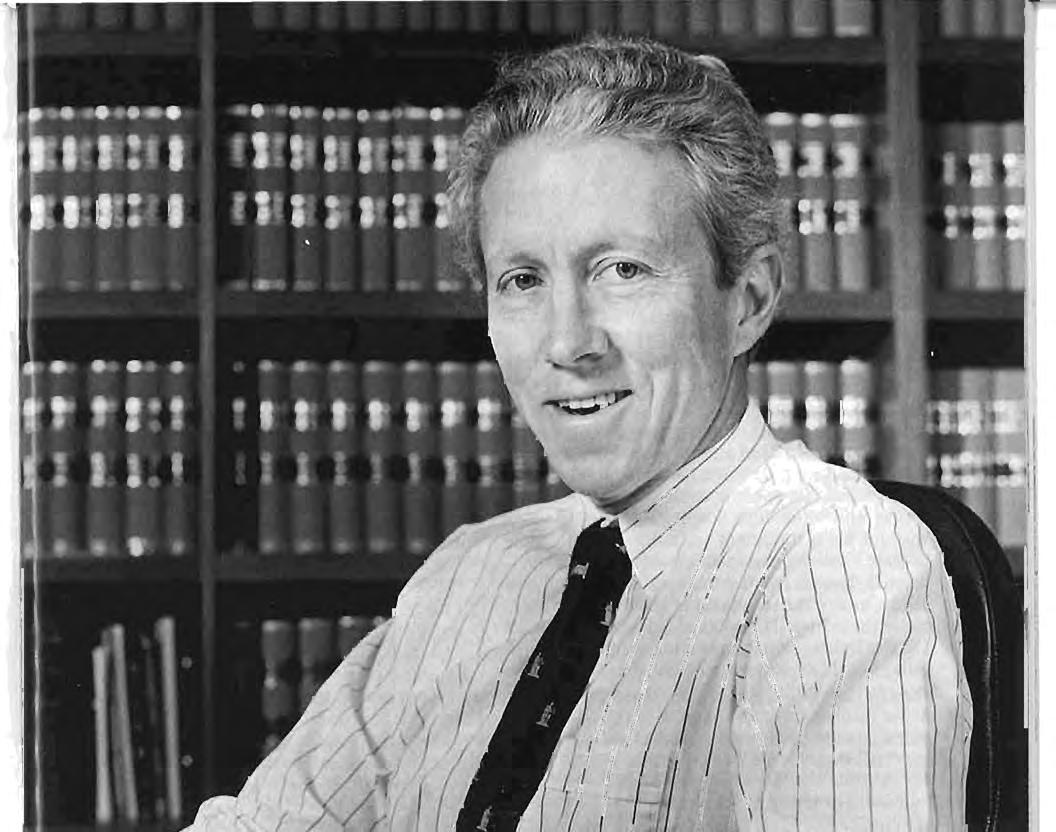
Chris Jessup
traditionally done things, and in some of the approaches which we have taken on particular ethical obligations. When this occasion arises, we cannot be seen to assert the rectitude of our existing position simply because we have always done things that way. In the long run, barristers generally in Australia must be able to represent to the other branch of the profession , and to the community as a whole, that the rules which they have adopted are worthy of retention, and disagreements or differing points of view as between the separate Bars will work to frustrate that endeavour.
All the same, there will inevitably be some matters upon which complete uniformity cannot be achieved. These matters tend to be concerned with the administration of the various Bars, rather than with the concepts which lie at the core of a barrister's ethical obligations. For example , our own accommodation rules will probably be something which the other states and territories will be unable to emulate. There will
be other examples where each state and territory may need to have local variations and/or additions to the uniform code, but it is thought that these will be readily accommodated within the proposed structure of the rules.
It would be foolhardy to predict when the task of producing a new set of rules will be complete. The Bar Council recognises that there is a certain urgency associated with this task , particularly since new copies of Gowans are not available. It is only because the ABA sub-committee is making such good progress that the introduction of the new rules which have been prepared by the Victorian Committee has been stayed. The Bar Council will keep matters under review, and in the meantime members of the Victorian Bar will need to continue to adhere to the rulings, rules and principles set out in Gowans, as amended by the Bar Council from time to time. The Re-statement of Basic Rulings itself is available in roneo form from the Bar office upon request.
Chris Jessup


THOSE WHO HAVE PORED OVER OUR ethical rules with the same degree of attention as a tax lawyer gives to the Income Tax Act will probably be aware that they allow barristers to appear on an appeal on the opposite side to that on which he (or she) appeared below (retainer rule 14) or to appear at the hearing having drawn the pleadings for the other side (retainer rule 16), whilst enjoining him (or her) to do so only without embarrassment (retainer rule 15). Perhaps this is why the rules are being re-drawn. Such considerations take us immediately to ethics, and to the standards ofthe Bar as a whole. Have they slipped? Or has life always been thus? Do the following passages have any application today? In 1586 it was said that:
"I finde that there are now more at the barre in one howse than was in all the Innes of the Courte when I was a younge man. And I finde theis places are bestowed manye times upon unmeete men verie rawe and younge men which are negligent and careless" and in 1577 counsel were told:

"not to embrace more matters than you can well and troughlie consider of which thinge I note doth oftenest happen unto those which trust to moche to the presentnes of there wittes and thereby answere theire clientes causes upon a sodayne to the losse and otherthrowe (as yt often happenethe) of theire clientes causes."
Perhaps it may be that the rules previously mentioned are an attempt to retain for the members of the Bar the freedom of action exhibited by a leading barrister (the later Lord Westbury) who drew a bill against a client for whom he held a general retainer:
"At the hearing of the suit his services were claimed by the defendant, and it was Bethell's painful duty to demolish his own handiwork. "Your Honour", he said, "of all the cobwebs that were even spun in a Court this is the flimsiest: it will dissolve at a touch." And it did. By way ofreparation and consolation, he whispered as he went out ofthe Court, in the ear ofthe solicitor who had first instructed him, "the bill is as good a bill as was ever filed".
No doubt he was only doing his best to solve a professional dilemma, but this sort of behaviour today would get you a letter from the Ethics Committee, as well as making the client un-
happy.
Yet clients have been happy with counsel's work. It is related that one client was so happy with the endeavours of his counsel, that he left him in his will a life interest in a considerable fortune and manor property, thus allowing the fortunate pleader to leave the Bar and to live the life of a gentleman thenceforth. Nowadays he would be subject to an action for undue influence by outraged relatives. I myself was once offered a present of a shirt after a particularly good win. On another occasion I actually got two crayfish. Another client once offered me more money "to do good job". Perhaps he had read the following passage from Pepys' diary (of Pemberton J., said by Holdsworth to have "proved himself to be too honest a lawyer to be wholly trustworthy") (I think as a judge):
"It was pretty here to see the heaps of money upon this lawyer's table; and more to see how he had not since last night spent any time upon our business, but begun with telling us that we were not at all concerned in that Act: which was a total mistake, by his not having read over the Act at all".
This may not have been an ethical offence, but it was not very sensible.
The following snippet shows an ethical misdemeanour (and perhaps a contempt of court). In a case concerning the excise duty payable upon brandy:
"The specimens were handed about, and the judges tasted, the jury tasted, and Saunders, seeing the phials moving, took one, and set it to his mouth and drank it all off. The court observing a pause and some merriment at the bar about Mr. Saunders, called to Jeffries to go out with his evidence. My Lord, said he, we are at a full stop and can go no further. What's the matter? said the Chief. Jeffries replied, Mr. Saunders has drunk up all our evidence "
Saunders later became Chief Justice of the King's Bench.
Lack of intestinal fortitude is probably not an ethical offence, but it won't get you far at the Bar. However it has been displayed by those who achieved eminence. Thus, in the early 1670s:
"Only yesterday there was so great an alarm in Westminster Hall that the gates were commended to be shut. The King's Bench rose up in great disorder; but when they understood it was only a mad cow, they sat down again. But the fright in Westminster Hall hath furnished the whole town with discourse; for she, having tossed several persons in King's Street, and coming into the Palace Yard towards the Hall gate, several persons drew their swords; others endeavoured to seize upon the officers' staves at the door to defend themselves with. Those in the hall, who saw the bustle and swords drawn, were affrighted, and some cried out the fifth monarchy men were up and come to cut the throats of the lawyers who were the great plague of the land. Some flung away their swords that they might not seem to make any defence; other their periwigs, that
they might appear to be meaner persons; the lawyers their gowns; and your friend Serjeant Scroggs, who of late hath had a fit of the gout, was perfectly cured, stript himself of his gown and coif, and with great activity vaulted over the bar, and was presently followed by the rest of his brethren."
Scroggs later became Chief Justice of the King's Bench (it was said that there were fears that his appointment would cause "popular apprehension").
Playing hard to get may take you far, as you can see from the next piece:
"Mr. Thurlow was at that time just rising into eminence as a lawyer. My father who considered him as possessing abilities greatly superior to any of his contemporaries, was anxious as far as lay in his power, to bring him forward. Mr. Thurlow, though indefatigable in his attentions to whatever he once undertook, was by no means a laborious man in general, especially during the early part of his life, when he avowed his disinclination to going to his desk, or looking into a book in the evening. Consequently, he never, except on particular occasions, was to be found in his Chambers after five o'clock in the afternoon, and in order to avoid being interrupted in his hours of recreation by Attorneys or their Clerks, it was a rule with him never to dine two following days at the same house, but to use various taverns and coffee houses (in the neighbourhood of the Temple where he lived), indiscriminately, and wherever he went the waiters had a general and positive order, if enquired for to deny his being there, and this usually succeeded.
A business was transacting in our office, whereupon my father was extremely desirous of consulting Mr. Thurlow. The matter pressed in point of time, not an hour was to be lost, and as two of the clerks who were sent in search of him had failed in their object, my father bid me try what I could do, and ifI succeeded he would give me a guinea. Out I set, and as I had at the commencement of my clerkship made friends with most of the head waiters in the taverns and coffee houses in Chancery Lane, Fleet Street, and that part of the town, I felt confident I should obtain the promised regard, and did so, though after more difficulty that I expected. After going the usual round in vain, I called upon the Barmaid at Nando's, with I was a favourite, and entreated her to tell me where Mr. Thurlow was. At first she protested she knew not, but by a little coaxing I got the secret, and proceeded to the Rolls tavern, where I had already been, but there happening to be two new waiters who were of course unacquainted with me, they were faithful to their orders, and denied his being there. Upon my second visit I went into the Bar, where addressing the landlord, I told him I has ascertained Mr. Thurlow was in the house, and see him I must. The host was inflexible, and would not peach, but in a few minutes after I entered, he called out - "Charles carry up half a dozen of red sealed port into No.3".
It instantly struck me that must be the apartment my man was in, and as the waiter passed with the basket of wine I pushed by him, ran up to No.3, boldly opened the door, and there sat Mr. Thurlow and four other gentlemen at a table with bottles and glasses before
them. Upon seeing me he exclaimed: "Well, you young rascal, damn your blood. What do you want? How the devil did you find me out? Take away your papers, for I'll be damned if I look at one of them. Come, come you scoundrel I know what you came for; you take after your father and are a damned drunken dog, so here drink of this", filling a tumbler of wine which I had not the smallest objection to, and drank to the health of the company. "But how did you find me out?" asked Mr. Thurlow. "Why, Sir," answered I, "I heard the master of the house order six bottles of port for number three, and I was certain there you must be, so up I ran and entered without ceremony."
This made a great laugh, putting Mr. Thurlow into high good humour who swore I was a damned clever fellow, and should do, and turning to his companions he said - "This is a wicked dog, who does with me as he pleases, a son of Joe Hickey". I was thereupon particularly noticed by them all, and pulling out my papers Mr. Thurlow looked them over and immediately wrote a note to my father upon the subject which I carried home, thereby gaining not only the promised guinea, but credit for the manner in which I had effected the business."
It is recorded that Thurlow got his big start in the law from a solicitor who heard him at Nando's. And the great Erskine got his first big case by talking big in a public bar. Would they have come up against our touting rules?
And professional co-operation has sometimes gone to great lengths, as the following passages show:
"I was told by an uncle that he was conducting a case before Coleridge, and had got to a crucial point in the examination of a witness; it was essential that the judge should hear the witness's answers; but the judge was asleep. He asked his opponent what he should do; his opponent said, "I will object to your next question. Perhaps the change of voice will wake him" - it did, and all was well."
and:
"Lord King became so far advanced in years ... that he often dozed over his causes when upon the bench; a circumstance which I myself well remember was the case; but it was no prejudice to the suitors; for Sir Philip Yourke and Mr. Talbot were both men of such good principles and strict integrity, and had always so good an understanding with one another, that, although they were frequently and almost always, concerned for opposite parties in the same cause, yet the merits of the cause were no sooner fully stated to the court, but they were sensible on which side the right lay; and, accordingly, the one or other of these two great men took occasion to state the matter briefly to his Lordship , and instruct the Registrar in what manner to minute the heads of the decree."
I found these accounts of our past brethren rather charming, no doubt due to the sense of continuity which we have with our colleagues from the past. Hopefully barristers of the future will think the same of us.
Graeme Uren

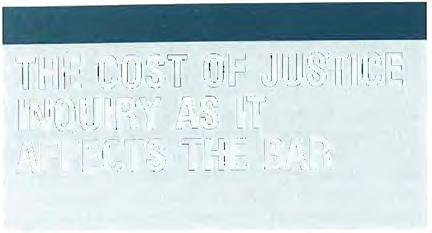
RUMOURS ABOUT THE LIKELIHOOD OF a Senate inquiry into the legal profession date back to the late 1970s when a Senator was supposed to have been so shocked by the allegedly high fees of a silk (it is said, from the Victorian Bar) that he vowed to make every effort to persuade the Senate to hold an inquiry into the legal profession. Whether or not there is any truth in this rum our, the fact is that on 5 May 1989, the Senate granted leave for certain matters relating to the legal process and the legal profession to be referred to its Standing Committee on Legal and Constitutional Affairs for inquiry and report. It is not surprising that , having regard to the very wide terms of that reference, the committee tended, at least in the first instance, to concentrate on the questions, why are the costs involved in litigating the average case as high as they are and what, if anything, can be done to reduce them?
In response to the committee's invitation, written submissions were lodged by a variety of organisations, most of which had a connection of one sort or another with the legal process. The Law Council and many of its constituent bodies also lodged written submissions. Between July 1990 and March 1991 , the committee conducted public hearings in most major capital cities at which it received further oral evidence and submissions. In April and May of this year, it issued three discussion papers , the ones of present relevance being the second paper (dealing with lawyers' fees) and the third paper (which deals with contingency fees). Another two or three issues papers are expected from the Commission before the end of the year.
The various written and oral submissions voiced a variety of complaints about lawyers , the legal process and the like, but from the point of view of the Bar, relati vely little was said that was specific. Nearly all the complaints and criticisms were assertive or , at best, anecdotal. Many of them proceeded on the assumption that every lawyer earns the fee of a senior silk. The sobering fact is, however, that the typical earnings of lawyers are modest, when compared to the general perception about lawyers' fees or when compared with other relevant earnings. This is
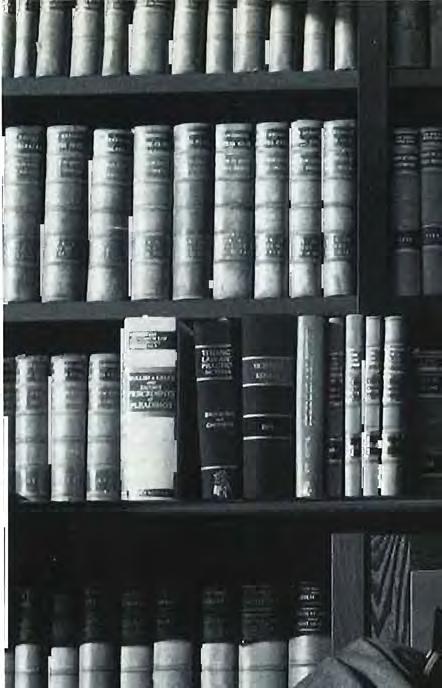


shown by the studies which were conducted by the National Institute of Labour Studies (NILS), the Australian Bureau of Statistics and Mr. Rod Stenson. By way of illustration , the conclusions drawn from the NILS survey of 1988/89 were that:
o more than half of all lawyers had a taxable income of less than $50,000 ;
o there is a large variation in lawyers' income compared to other professionals;
o lawyers' average incomes are broadly in line with a number of other professions and do not seem to be excessive compared to those average incomes;
o years of experience have a significant effect on lawyers' earnings.
The NILS findings relating to the typical income of lawyers accord quite closely with the findings of the Australian Bureau of Statistics

and Mr. Stenson. It must be borne in mind that there are more than 27 ,000 lawyers in Australia and relatively few of them are partners in large firms or are successful senior barristers. Nearly three-quarters of the Australian law firms employ fewer than ten people.
In contrast to the submissions and evidence presented to the committee, its recently issued discussion papers, particularly the second paper, raise questions of direct relevance to the Bars. It is not possible to deal with all of them here, so I shall only mention the more significant ones.
The question of whether lawyers should be allowed to advertise is raised in the early part of the discussion paper. The assumption is made that advertising will free up competition amongst lawyers, particularly in relation to fees,
and will lead to their downward movement. Barristers, however, are not singled out in relation to this issue. Nevertheless, it should be expected that the committee will deal with this issue in the context of both sides of the profession.
So far as barristers are concerned, there is no real evidence to suggest that advertising by them will lead to more competition between them or to a lowering of their fees. Although the principal underlying ethical rule which prohibits advertising by barristers is sound, one wonders whether the Bar should provide information to solicitors about the areas of practice of its members and like material. It was all very well to expect solicitors to know such matters when the Bar was two to three hundred strong. Given its present size, however, one wonders whether it is realistic to expect solicitors to know the areas of practice of each member of the Bar. There is much to be
said for the Bar providing to solicitors a directory which contains relevant information about each barrister, such as the year of admission and the signing of the Bar Roll, the jurisdiction in which the barrister practises, his or her academic qualifications and so on. With computers, this can be updated regularly.
The English Bar has produced such a directory. It has apparently proved very helpful and the ethical standards of the English Bar have not suffered because of it. I know that over the years the Bar Council has considered providing such a directory, but has always put it into the "too hard" basket. It may be an opportune time to look at this matter again .
The underlying message in this part of the discussion paper is that, for a variety of reasons which do not stand up to objective analysis, barristers' fees should be regulated.
In this context, the first question that is raised is whether the barristers' fees should be subject to scales and taxation, similar to that which applies to solicitors' fees. This notion of regulation, however, stands in stark contrast to other parts of the paper which promote the principle that market forces should prevail. The suggestion also seems to be inconsistent with the acceptance by the issues paper that barristers cannot afford to price themselves out of the market and that excessive fee charging results in work going to other barristers.
Moreover, the analysis of whether barristers' fees should be tied to scales proceeds on a misunderstanding as to how the vast majority of such fees are fixed. For instance, it fails to recognise that most barristers' fees are, in effect, already controlled by scales. In cases in the Victorian County Court and Magistrates' Court , for example, the bulk of barristers' fees are directly related to the scale of fees prescribed by those courts. In the Supreme Court, the amount allowed on brief by the Taxing Master usually governs the brief fees marked. Similarly, Legal Aid briefs are marked in accordance with a predetermined scale.
Furthermore, the important role of the solicitor in marking the brief fee is not sufficiently recognised by the issues paper. There is a curious suggestion in the issues paper that because solicitors and barristers are part of the same profession and are often personally acquainted with each other, the matter of marking briefs with an appropriate fee cannot be (or should not be) left to solicitors. The inference is that solicitors cannot be trusted to act in the clients' interests when it comes to marking brief fees.
A further basis for the committee's suggestion that it may be desirable to regulate brief fees is 36
that solicitors cannot always ensure that the fees will be "affordable" to the client. It is claimed that successful barristers often fix a fee and "will not often move, whatever the plea made by the solicitors". Thus, it is said, the client who cannot afford the fee is deprived of the services of the successful barrister. The underlying suggestion is that each barrister should only mark a fee that is "affordable"
Such a theory, however, ignores the realities of the situation. Experience shows that there is a great deal of shopping around in cases where it is not normal to pay scale fees Similarly, the suggestion that barristers who set a substantial price will often not move is not borne out by experience. In any event , to the extent that this occurs, it would only take place in a minute fraction of the cases involved. As the issues paper recognises, barristers' fees are responsive to market forces and the fact is that the market determines the level of such fees and the solicitors playa critical part in that process. Even if one successful barrister does not or cannot accept the brief, there are many other successful barristers who will do so.
The issues paper does not suggest how the scales are to be formulated or how the fees within such scales are to be determined. It is also not clear whether barristers should be allowed to contract out of such scale fees. The last occasion when regulating barristers' fees was considered in Victoria, it was concluded that such a proposal was impractical and what is probably more important, it was recognised that sufficient control over barristers' fees was being exercised by the combination of market forces and court scales.
In this context, the paper raises the following questions:
(a) Do fees charged by leading Queen's Counsel have the effect of raising the fees of the rest of the profession?
(b) Do such fees affect the ability of individuals on low to middle incomes to have their cases presented competently?
I would suggest that the answer to each question is, no.
The impact that fees of Queen's Counsel has on professional fees generally should be examined in its proper context. It should be borne in mind that Queen's Counsel have nothing to do with well over 95% of the cases that are issued in, say, Victoria. Moreover, of the silks who do appear in court, at least half of them appear in criminal and civil matters where scales operate to govern the brief fee. As to the balance, the majority of the fees are subject to the pressures of the market place, and at most, only a handful of
Queen's Counsel in Australia can mark fees outside such control.
The suggestion that high fees of leading Queen's Counsel have the effect of raising the fees of the rest of the profession is, in any event, no more than assertion. There is no evidence at all to suggest that this is occurring. Moreover, it is doubtful whether this could in fact occur, given the numbers of Queen's Counsel involved and the market pressures that exist.
As to the second question, if one takes , by way of example , the Bars in Victoria, New South Wales and Queensland, the number of barristers involved is probably a little under 3,000. Amongst that number, there are fewer than 300 Queen's Counsel. This means there is a very large number of barristers available to "service" the average case. I would suggest that nearly all of them are highly skilled so that individuals on low and middle incomes are able to have their cases presented competently.
The committee also raises the question of whether there is any advantage in the two counsel rule, the principal concern being the cost of briefing two barristers (particularly in cases which do not warrant it). It also asks why the two counsel rule should exist in any form stronger than the current New South Wales rule?
In considering these questions, a number of factors should be borne in mind. The first is that counsel who applies for silk does so voluntarily and therefore voluntarily accepts the imposition of the relevant restrictions. Secondly , the division between senior and junior counsel is (and should continue to be) based on function rather than mere title. The function of a silk is to take responsibility for conducting cases which are of such complexity as to warrant the services of two barristers
Next, there is a public benefit in having a small group which specialises in dealing with complex cases that require the attention of two barristers. The UK Monopolies Commission (which ultimately recommended the abolition of the two counsel rule in the UK in the 1970s) recognised that there was considerable public benefit in retaining a system which encourages the creation and retention of such specialists. It recognised that such barristers were able to conduct complex cases more efficiently than those who did not have such expertise. This was an important factor in the administration of the law, enabling the courts to dispose of complicated cases efficiently and, therefore, more cheaply than would otherwise be the case.
The Commission also recognised that Queen's Counsel should be available to devote time to the
more difficult cases. It accepted that in order to facilitate this, there should be a general understanding that Queen's Counsel should be able in any particular case to request the assistance of a junior.
Thus, the Commission found the two counsel system to be in the public interest and worthy of retention. It concluded, however, that the abolition of the compulsory two counsel rule would not place the two counsel system in jeopardy and recommended that it be abolished. To date, its prediction appears to have been justified. New South Wales seems to have had a similar experience in this matter. If the experience in those jurisdictions is a safe guide, then there is no reason why the two counsel rule should not be restated in Victoria along the lines of the New South Wales rule. In this context, it should be borne in mind that the two counsel rule in the form in which it operated in recent times was first introduced in England as late as the 1930s. Until then, the Bars lived without such constraint.
The matters canvassed by the Senate Committee go well beyond those which I have isolated for brief discussion and the majority of them raise serious issues that must be addressed by the legal profession and others. Most sections of the Australian community are being examined as part of the process of the so-called microeconomic reform that seems to be sweeping the country. The legal profession and the Bars in particular are caught up in this analysis. The market place, changing attitudes in the community, inquiries such as the Senate inquiry, have made it obvious that the Bars must have a good look at themselves and re-assess their practices where necessary. In this respect, the Victorian Bar Council deserves to be congratulated because it has secured the services of the Honourable Xavier Connor Q.c. and those of Michael Crennan of the Victorian Bar to review the Bar's practices. That is a positive approach in keeping with the Bar's sense of public responsibility.
Where practices are justified, they should be retained . Where they are not justified, they should be discarded or modified. But care should be taken when discarding or modifying the practices that have served the community well for long periods. It would be foolish and against the community's best interests if important safeguards of the rights of the citizen and practices which facilitate the administration of justice were thrown away in the name of cheaper justice.
Alex Chernov



Under the Clerking Rules ofthe Victorian Bar, each applicant to sign the Roll of Counsel must engage a Barristers' Clerk approved by the Bar Council, and every counsel on the Roll is required, while his name is on the Practising List, to have acting for him or her a Barristers' Clerk so approved.
At its meeting on Sunday 3 March 1991 the Bar Council resol ved that these rules should continue in operation.
Every barrister, therefore is required to employ a clerk approved by the Bar Council. The persons approved by the Bar Council as Barristers' Clerks are given an oligopoly in respect of an essential service; and the individual barrister's capacity to negotiate the terms of employment is clearly inhibited by the artificial nature of the market thus created.
If the Bar Council is to "license" certain people to exercise particular functions and is to require all barristers to employ one of the persons so licensed, the Bar Council should know in broad terms:
(a) the value of the "licence" it is granting;
(b) what is the "reasonable cost" ofthe services being provided to the individual barrister;
(c) whether that "reasonable cost" is being exceeded.
If a barrister is required to employ an approved Barristers' Clerk he or she should be able to find out:
(a) whether the services are being provided at a "low", "exorbitant" or "reasonable" cost;
(b) whether the same services could be provided at a considerably lower cost;
(c) whether the clerk can from his gross receipts afford to provide better services to the barrister;
(d) whether the profit margin being made by the barrister's agent is exorbitant.
The current rate of commission paid under
the "orthodox" arrangement between Barristers' Clerks and those for whom they act, was fixed at a time when lists on the whole were much smaller. Assuming that the commission then fixed was an appropriate one, and assuming that there are no economies of scale in operating a larger list, there would appear to be good grounds for asking whether the present rate of commission is not now excessive.
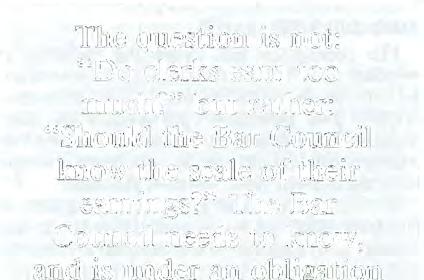

It is clear that the questions of the remuneration of Barristers' Clerks and the services provided by the clerks are a matter for the individual lists. They are also, however, matters of concern to the Bar Council in the exercise of its responsibility to consider the effect of the current rules on the operation of the Bar as a whole and the wellbeing (whether economic or otherwise) of the Bar Council's electorate.
The contention that these are matters solely for the list ignores:
(a) the fact that the Bar Council in imposing rules owes a responsibility to each individual barrister;
(b) the fact that each individual barrister (whether he or she has a majority or minority voice on the list or the list Committee) is an employer of the clerk;
(c) the proposition that the right of an individual barrister to ascertain whether he or she is paying too much for the service provided should not depend upon whether the majority of the barristers on his or her particular list are of like mind.
At a time when the Senate Cost of Justice Inquiry and the Victorian Law Reform Commission are looking at the costs associated with the provision of legal services, it is unfortunate that rumours (which mayor may not be accurate) can be spread and assertions made in newspapers as to the earnings of clerks but the Bar Council is so uninformed as to the facts that it is unable to comment.
If Barristers' Clerks are making "exorbitant" incomes, that is a clear indication to the public that there is "fat" in barristers' earnings which might well need trimming. If Barristers' Clerks are not making "exorbitant" incomes, the Bar Council should be in a position to say so in order to rebut these rumours and assertions.
The question is not: "Do clerks earn too much?" but rather: "Should the Bar Council know the scale of their earnings?"
The Bar Council needs to know, and is under an obligation to the Bar to know, and to be properly informed as to, the cost and profitability of the clerking operations which it licenses.
To enable the Bar Council to be "properly informed" it may not be necessary for each member of the Bar Council to know the precise income and expenditure of each clerk. It may be sufficient if this is known to the Chairman of the Bar Council, provided the Bar Council has the necessary information, derived by the chairman from precise figures given to him, to know (in general terms):
(a) what are the costs of the services provided;
(b) what is the most efficient (from the barristers' point of view) size for a list;
(c) whether the development of new lists should be curtailed;
(d) whether the Bar (and ultimately the public) is paying too much for the services provided.

clerk the Barrister joins a List or group of other Barristers. That List or group of Barristers determines the terms and conditions of the engagement.
2. The income of the Barrister is something which is confidential between the Barrister and the Clerk. Further, the income of the Clerk is a matter confidential between the Clerk and Barrister, or alternatively, between the List and the Clerk.
3. The Bar Council by its motion has no right to interfere in these relationships. What is the point or purpose to be served by the provision of such detail to the Bar Council? If the List want to make inquiries of the Clerk, if the List want to change the terms of engagement, then so be it. But that is the matter of the individual List not for the Bar Council.
4. The List Committees have made no complaint to the Bar in relation to any aspect of Clerking. The motion passed by the Bar
Council had no regard to the views of the Lists or the Lists Committees. The motion should be viewed in the context of a general attack on the present clerking system. In effect the motion is a preliminary step in an attempted strategy to discredit and do away with compulsory clerking and the present system of clerking.
5. The present system of clerking has provided the Victorian Bar with the pre-eminient system of clerking in Australia. The Victorian Bar has generally avoided the nepotism and cartels of other States. The present system of clerking has meant the more senior Barrister has subsidised the junior Barrister in relation to clerking expenses and thus meant the Bar has been more accessible as a career for lawyers than is the case in other States.
6. The relationship between Barrister and Clerk should remain free of the bureaucratic interference of the Bar Council as is envisaged in this motion.


PUT A GROUP OF BARRISTERS TOgether for long enough , and sooner or later the subject of barristers' clerks will arise. The conversation may take many different turns. "I get a lot of work through my clerk," someone may say. Or perhaps, "I applied to three different Lists before I was accepted." Someone else may remark that it was time that someone started a Town Planning List, so that a solicitor who wanted to brief a specialist in that area would only have to make one phone call. Someone may speculate about exactly what clerks are supposed to do: Answer the telephone? Send out accounts? Take solicitors out to lunch? Someone may mutter, darkly, that he does not think that he gets a fair go from his clerk. A barrister who fancies himself as an iconoclast may ask why it is necessary for barristers to have clerks at all.

But however a conversation about clerking begins, one thing is certain. Sooner or later, discussion will turn to the perhaps sordid but perennially interesting subject of money. Every barrister has a clerk. Every barrister pays that clerk. What does this mean for the clerks? How much money do the clerks make?
The question of clerks' incomes has been before the Bar Council for some months. In 1990 a sub-committee, chaired originally by Winneke Q.c. and later by Nash Q.c., delivered a report to the Bar Council in which a number of the questions referred to above were canvassed. The central question, upon which the sub-committee was divided , was whether it should be compulsory for every barrister to have a clerk. Certain recommendations were made, including one to the effect that, if clerking were to remain compulsory , each clerk should be required to disclose his or her annual net profit to the Bar Council.
On Sunday, 3 March 1991, the Bar Council held a day-long meeting chiefly on the question of clerking. It was resolved to retain the requirement for each barrister to have a clerk, and it also was resolved that each clerk should be required to disclose his or her income to the Chairman of the Bar Council. It was then resolved that in implementing the disclosure resolution, there 40
should be consultation with the List Committees.
As might perhaps have been expected , when the terms of the resolution were communicated to the clerks and the List Committees, there was a strong reaction. Some Lists held General Meetings; in other cases , the List Committees met. Some Lists were in favour of the resolution, but a majority were against it.
Implementation of the disclosure resolution was deferred by the Bar Council, and numerous
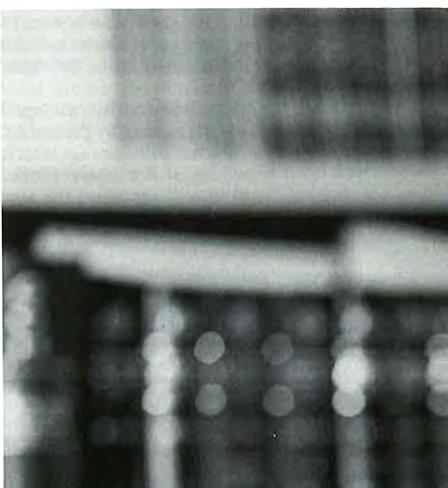

consultations took place between the Chairman and Vice-Chairmen of the Bar Council and various members of List Committees. The issue proved to be more controversial than the Bar Council expected when the disclosure resolution was passed. The reaction it caused has provoked a complete reconsideration by the Bar Council of its original position.
There are two major arguments that are commonly put in favour of disclosure. The first is that the Bar Council licenses clerks , and that this
power cannot be properly exercised unless the Bar Council is aware of the level of profitability of existing clerking operations. If the level of profitability is known, then the Bar Council will be able to assess more accurately w,hether the licensing of an additional clerk is likely to render existing clerking operations unviable, and whether the proposed new clerk is likely to be able to survive. If the existing clerks are seen to be earning very high incomes, then presumably a new clerk will not threaten the viability of the

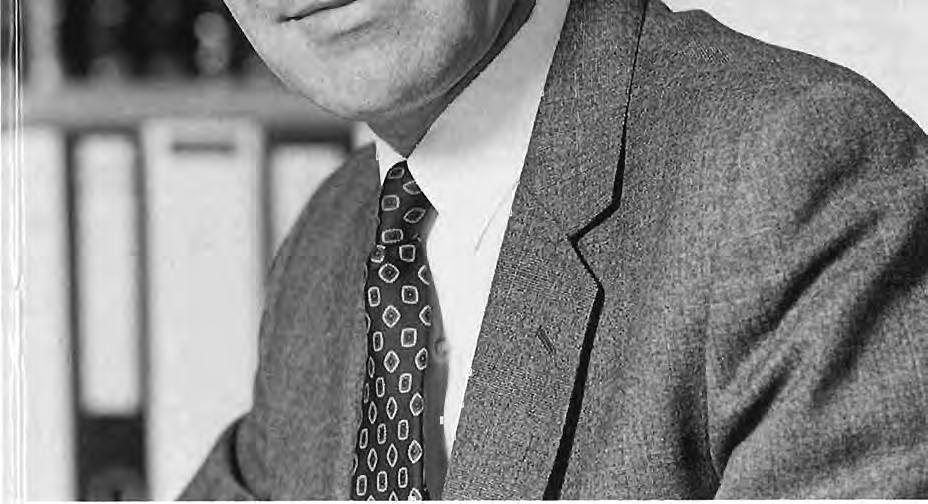

existing clerks. If, on the other hand, the existing clerks are barely surviving, then the new clerk may fail, or may cause the failure of an existing clerk.
Another argument in favour of disclosure is essentially pragmatic. All clerks are licensed by the Bar Council and all barristers are required to employ a clerk. Thus, an individual lucky enough to be licensed by the Bar Council is permitted to engage in a virtually risk-free occupation. In those circumstances, the combination of a guaranteed market for the services of clerks and a limit on the number of clerks available to provide those services obviously has a tendency to lead to high profits for those who operate as clerks.
Those in favour of disclosure reject the view that the question of a clerk's income is solely a matter for the clerk and his or her List. They point out that it is not reasonable to expect members of a List Committee to take upon themselves the burden of asking the clerk to disclose his or her income to them when they know that the clerk has the opportunity to exercise a significant degree of influence over their future



ALTHOUGH CURRENTLY 5,000 PETitions a year are filed in the United States Supreme Court, the Court had a humble beginning. When it convened for the first time in 1790 at the temporary capital of New York City, only three of the justices showed up. Initially, litigants were reluctant to appeal from the lower courts, and for the first three years the Court had almost no work.
In 1791, the Court moved to Philadelphia, then the nation's capital, where it sat for a decade. For many years, justices were required by the Judiciary Act to journey twice a year to remote regions in order to preside over circuit courts. They spent several days on stage coaches, making their way to North and South Carolina and Georgia, before hearing cases. As late as the 1830s, the revered jurist and fourth Chief Justice, John Marshall, was involved in a stage
careers. Thus, from a pragmatic point of view, some form of compulsory disclosure would provide a check on the inherent tendency towards very high incomes for clerks.
The arguments against disclosure also combine pragmatism and principle. On the pragmatic side, it is pointed out that, once the information becomes available, it is virtually inevitable that it will be widely disseminated. If any action is to be taken in consequence of what is learned about the profitability of a clerk, then the level of profitability must be disclosed. Even if it is disclosed only to members of Bar Council and List Committees, the result will be that something approaching 10% of the total population of the Bar will become aware of the information. In those circumstances it is likely to be disseminated more widely. Furthermore, if it is known that the income of a particular clerk is a certain dollar amount, and if it is also known that the clerk is remunerated at the rate of (say) 5% of the gross receipts of barristers on that List, then it will not be difficult to calculate the total income of the barristers on that List.

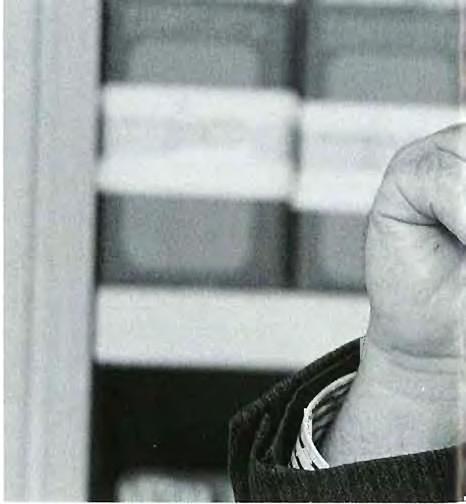
42
As a matter of pure principle , the point is made that a clerk is first and foremost the employee of the barrister, and that the rate of remuneration of the clerk is therefore a matter between the barrister and the clerk and no one else. In other words , it is the business of the barristers on a part icular List to take whatever steps they consider appropriate to ascertain the income of the clerk; and if they do not have any desire to ascertain that income , then there is no reason why they should be compelled to do so If a barrister suspects that his or her clerk is making too much money, the barrister can transfer to another List where the commission charged by the clerk is lower. In the past , as all clerks have charged commission at the same or virtually the same rate, this choice may perhaps have been more apparent than real ; but in recent times, when clerks have been appointed who are remunerated differently from their more established counterparts, there is a real choice available.
On 13 June 1991 the Bar Council met and reconsidered the disclosure resolution. It passed in its place a different resolution which, it is hoped,
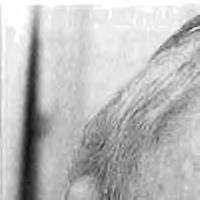

will meet the two main arguments of principle . The new resolution conveys to each List Committee the view of the Bar Council that part of their job is to review the remuneration of the clerk. It also requires each List Committee to report annually to the Bar Council that it has reviewed the operations of the clerk, "including the remuneration of the clerk as a fair and reasonable remuneration."
The remuneration of the clerk will therefore remain a matter between the clerk and the clerk's List. But the List Committee will be required to review that remuneration each year. Thus, members of the List Committees should not feel under personal pressure , because they have no option but to require disclosure.
The Bar Council hopes and expects that the resolution will be beneficial for all barristers. The Bar Council hopes and expects that the clerks will co-operate in implementing it, and that although it represents a significant change from the position that has obtained for many years , it will turn out to be satisfactory for everyone.
Robin Brett
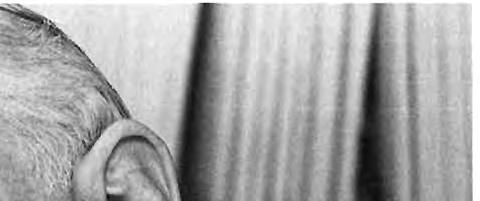

Graham Fricke
coach crash while travelling on circuit. It was said that his ensuing injuries hastened his death, although he had then served as Chief Justice for 34 years and was approaching 80 years of age.
It took the Court 145 years to acquire its present permanent home. Creating a precedent for his antipodean counterpart, Sir Garfield Barwick, William Howard Taft, a former president of the United States, and the Court's tenth Chief Justice, prevailed on Congress to provide massive funds (in 1929) for the construction of the white marble Corinthian building on a site which is a mere drop kick (a Fred Hughson drop kick) to the east of the United States Capitol building.
Taft, who had been one of the Court's most prominent advocates in the late 19th century, regarded the court with great affection. It was, he wrote, "next to my wife and children ... the nearest thing to my heart in life."
Unfortunately, Taft died a year or two after the decision to provide funds was made, and did not live to see the Court open in 1935.
At the time, some of Taft's brethren and successors criticised the extravagance of spending $10m (the marble alone cost $3m), but none of today's brethren (or siblings) has been heard to complain. The simple classical elegance of the building's exterior and interior contrasts with such modern facilities as the computer printing

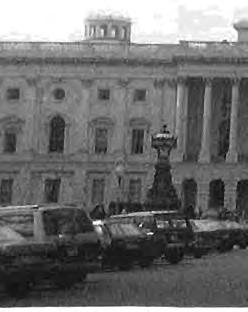
of opinions. From a video film shown at the Court, it is clear that its present Chief Justice, William Rehnquist, is a dab hand at the computer keyboard.
Rehnquist presides over the Court with a light, homely touch. He surprised me when, in the middle of the argument in the first case I attended, he disappeared behind the arras. His leaderless siblings continued to interrogate counsel while their Chief attended to whatever function he discharges behind the purple curtain, before he re-emerged some minute or two later. This same ritual, which involved his clerk straightening his chair each time he departed, occurred during every case I witnessed. No one else in the crowded court showed the slightest surprise.
Another aspect of the proceedings which is astonishing to the Australian visitor is the strict enforcement of time limits for oral argument. In the early years of the Court's history, when business was slack, there were no time limits. In 1848, when 300 cases were being filed annually, the Court introduced a time limit of 8 hours per case (4 hours each side). The Court progressively reduced the limit until 1970 when it set a limit of 1 hour per case. This results in an economy of language and an absence of repetition, which, from the perspective of an Australian judge, is at once astonishing and refreshing.
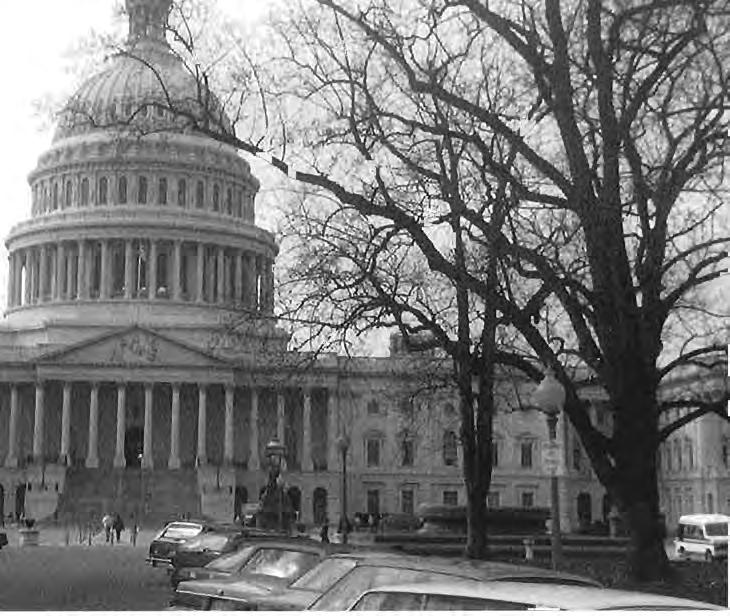
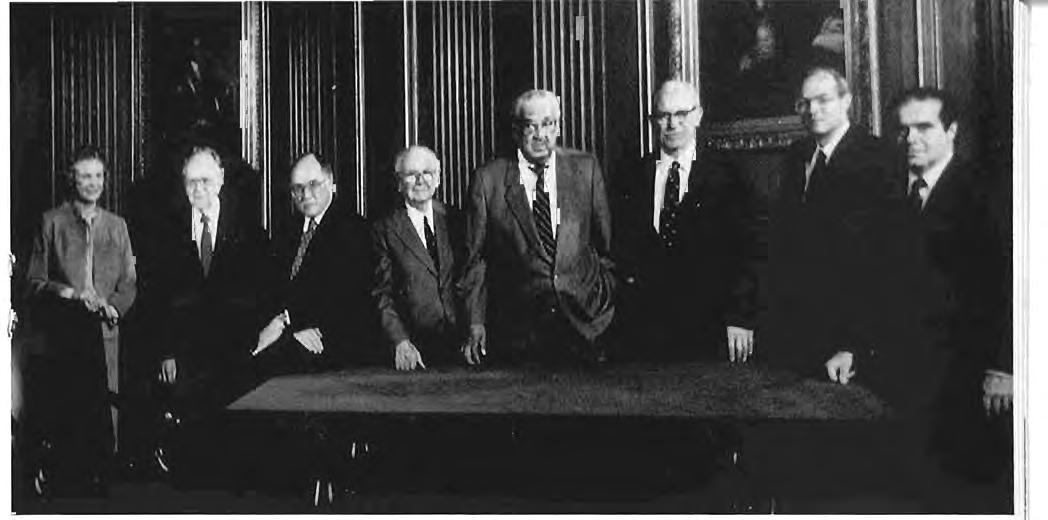

The present time limit means that counsel for the petitioner normally gets only 20 minutes to develop his argument. And there is no concept of "time-on" to allow for judicial interruptions (Oops! judicial interventions). When counsel's time has expired, the Chief Justice closes that counsel's performance by intoning "Thank you, Mr. Smith". This sometimes seems to occur in mid syllable, or while the hapless counsel is pausing to catch his breath. The next counsel is expected to have all his notes ready and to immediately move to the podium - for the meter is already ticking over - and to begin his argument. Finally, the Chief solemnly informs the first counsel, "You have four minutes in rebuttal, Mr. Smith."
The Court has had an interesting history. A number of its justices have been blood relatives. One justice, who rejoiced in the name of Lucius Q.c. Lamar, was succeeded by a cousin, Joseph R. Lamar (You may think that the former justice's initials were professionally advantageous, but they stood for "Quintus Cincinnatus" ; what thoughtful parents Lucius had!).
The terms of two relatives - Steven Dray Field (1863-1897) and his nephew David J. Brewer (1890-1910) - overlapped. Two other related justices, whose parents had also been thoughtful (their names were John Marshall Harlan) served for an aggregate period of 50 years. The first John Marshall Harlan, who distinguished himself by dissenting in Plessy v. Ferguson ("separate but equal" facilities were held to be not unconstitutional; overruled six decades later in Brown v. Education Board) served from 1877 to 1911 and was known as one of the great
dissenters, along with one of his colleagues, Oliver Wendell Holmes. Harlan's grandson served between 1955 and 1971.
In the two centuries of the Court's history, there have been 105 justices and 16 chief justices. Five of the chief justices, including Chief Justice Rehnquist, previously served as associate justices. The latest appointee, Justice Souter, from New Hampshire, is taciturn, but very sharp and persistent on the rare occasions of his interventions. It is easy to see why, during his years of service on the New Hampshire bench, he provided little ammunition for his Senatorial opponents who subsequently had to decide whether to confirm his nomination to the U.S. Supreme Court.
The justices enjoy life tenure, and many have sat well beyond their seventies. The oldest justice was the Great Dissenter, Oliver Wendell Holmes, who retired in the year after his ninetieth birthday, after serving for fifty years on the bench (20 years on the Massachussetts Supreme Court and 30 years on the United States Supreme Court). He was, of course, the only justice still sitting in the 1930s who had been wounded in the Civil War.
A story, no doubt apocryphal, concerns the octogenarian Holmes and his brother Brandeis, also a great dissenter, but a mere septuagenarian at the time. The pair were strolling in the Washington streets one lunchtime, enjoying the scenery, both vegetational and human. (Washington has an abundance - some women wbuld say a surfeit - of attractive secretaries.) When one especially pulchritudinous young lady walked by, the two allowed their beady judicial eyes to
swivel around to follow her progress, after which Holmes sighed to his youthful colleague, "Ah, Brandeis, if only I were 75 again!".
With notable exceptions (such as President Franklin Delano Roosevelt) those involved in appointing the justices have acted conservatively. The first appointment of a jew - the youthful Brandeis again - occurred in 1916, some 125 years after the Court began, and a decade after the recently formed Australian government appointed Isaacs to the High Court.
Brandeis' nomination provoked widespread criticism among the conservatives including William Howard Taft, who was later to preside over the court in which Brandeis sat. Taft said that Brandeis was "not a fit person" for the bench. The Senate engaged in acrimonious debate for almost five months before it confirmed the nomination. The Court does, of course, have its black member and its rather vocal female member, but it consisted exclusively of "brethren" - and white brethren at that - for the best part of the first two centuries of its existence. It took until the late 1960s for a president - Lyndon Baines Johnson - to nominate a black person - Thurgood Marshall, who had argued the Brown v. Education Board series of cases - and until 1981 for President Ronald Reagan to nominate a woman - Sandra Day O'Connor. In that year, Reagan made good a campaign pledge to appoint a woman. The appointers have, nevertheless, been quite ready to appoint reflective men and former law teachers to the top bench - men such as Holmes, Cardozo and Frankfurter.

George Washington holds the record for the number of appointments - he appointed eleven justices. Franklin Delano Roosevelt appointed nine. When the Court demonstrated that, although its members were situated a mere drop kick away from the Capitol, they were not figuratively within its shadow (by holding large sections of Roosevelt's New Deal legislation to be unconstitutional), the President threatened to appoint another six justices. In a celebrated fireside chat, he excoriated the Court as a "Third House of the Congress -a super legislature". He announced a plan to bring "a steady and continuing stream of new and younger blood" to the Court. The "Court packing" plan to increase the size of the Court from nine members to fifteen was never achieved.
The standard of advocacy before the Supreme Court is generally high, but variable in quality. Many use the expression "I think" or "we believe" during argument; in fact, during a number of days in which I observed the Court and its advocates, I heard not one "I submit" or "we contend". Some who appear before it seem to be more experienced in jury advocacy than in appellate advocacy; others appear to be inexperienced in either area. Professor Geoffrey Sawer once told the story ofthe inexperienced advocate who appeared before the nation's highest court, and, in response to the early question from the bench, "How did you get here?" (meaning, of course, by what legal process), responded "Why, by the Acheson, Topeka and the Santa Fe".
Graham Fricke


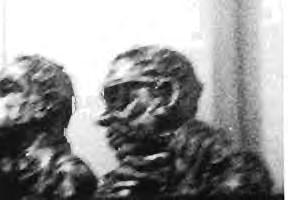






THERE ARE SOME LAWS THAT ARE natural and physical. They are beyond the power of men to tamper with. An early example is that of King Canute (or Knut). Here was a ruler fully cognisant of the limits of his powers Not so his sycophantic courtiers. To disabuse them of their belief in his unlimited regal powers he commanded the tide to recede and promptly got his feet wet. Unfortunately for the memory of this wise old king, he is incorrectly remembered as a vainglorious dill who believed in his power to rule the waves .
Not so Charles Stuart: little did Charles I suspect just how close he was to his God when he asserted the divine right of the monarchy.
John Washington Butler, an elected legislator for the State of Tennessee , is deservedly remembered as a foolish man of unjustified faith in the power of a decree enacted by mere mortals. It was he who announced that he would introduce a Bill to ban gossip in the state .
One measure he did successfully introduce was the Butler Act , otherwise known as the Tennessee anti-evolution law under which John Thomas Scopes was prosecuted by William Jennings Bryan and defended by Clarence Darrow.
There exists some doubt as to whether Scopes did in fact teach (or preach) evolution to his students - Scopes was a mathematics teacher and according to Alfred Holt, Phrase and Word Origins (1961), Scopes told Holt that he did not actually teach the theory of evolution to his students although he believed the theory. On the other hand, one of the co-counsel for the defence, Garfield Hays, Let Fre edom Ring (1937), wntes that-
Howard Morgan, a clean-cut youngster of about fourteen , thereupon testified that he was in Scopes' class and that Scopes taught the following : "He said that the earth was once a hot molten mass , too hot for plant or animal life to exist upon it; in the sea the earth cooled off; was a little germ of one ce ll organism formed, and thIS organism kept evolving until it got to be a land animal, and it kept on evolving , and from this was man."
To add further confusion; as a Tennessee state teacher, Scopes was obligated to teach his stu-
dents pursuant to the authorised text: Hunter's Civic Biology. This book was prescribed by the State of Tennessee and it set out the theory of evolution - for Scopes to deviate from the set text would have been a crime and yet it was a crime for him to teach his students according to the book
Of course, the whole episode was a beat-up. One Saturday morning in the local drugstore, the locallarrikin, George Rappelyea -a mining engineer originally from New York, Scopes and three local lawyers discussed the just enacted Anti-evolution law as reprinted in the Chattanooga Times. The American Civil Liberties Union had announced that it would back any school teacher who would test the law. Johnny Cash fans will no doubt be pleased to learn that one ofthe lawyers was Sue K Hicks (a man whose parents had played him a grim joke). Rappelyea figured out how to put Dayton on the map. Would Scopes agree to place himself and his munificent school teaching job in jeopardy?
Scopes would Here was a magnificent opportunity to test the law and make Dayton world famous No time was to be lost. Other towns, once they caught on , would compete for the publicity of a trial involving Science, the Bible, and Tennessee. Scopes, bemused by it all , approached his fate like a sacrificial lamb - his fate was to be prosecuted by William Jennings Bryan , three times the Democratic Party's candidate for President of the United States, and to be defended by the legendary Clarence Darrow and Dudley Field Malone and Hays and, wonder of wonders , Hollywood would eventually make a film-play of it all starring Henry Fonda.
Whether or not Scopes taught evolution to his class is irrelevant. The defence did not desire an insignificant victory confined to Scopes alone; they sought to defeat the law itself and consequently declined to take the point that Scopes had not taught evolution as alleged.
The trial fulfilled Rappelyea's expectationsit was a carnival-cum-circus complete with hot dog vendors, holy-rollers and other assorted ballyhoo artists and, best of all, the renowned journalist H L. Mencken was present to report back to the rest of the United States and the whole wide world was watching. What would Mark Twain have made of it all, had he still been alive to witness?
John Washington Butler, the farmer legislator , who introduced the statute, is reported to have said that he never knew that there was more than one Bible until he heard this stated in Court. Apparently he had never heard of the Catholic Bible [of eighty books], or the Hebrew Bible [of sixty-six books], or of any other translations. It is doubtful that he inquired as to the language used in the original Bible and whether he knew that
the Hebrew Bible was unvocalised and that, by a change in the vowels , important changes in the text could be effected. He did not realise, apparently , that many priests made their own longhand copies (before the age of printing) and these priests did not hesitate to make a change for their own purposes . He certainly was not aware that in the fifteenth-century it was an offence punishable by death in England to read the Bible in the original tongue and that thirty-nine persons were hanged for this heinous crime. Apparently, John Washington Butler thought, if indeed he thought at all, that the King James's version of the Bible was handed down by God in person to Moses in printed form and in the English language - perhaps published under the imprint of the Gideons. It is of small wonder to us that Moses is known as a prophet given that he was to receive the whole bible (including the New Testament) back in Old Testament days.
The highlight of the trial was when Dudley Field Malone, unknown to Darrow, announced to the Court that as their first witness, the defence would call the prosecutor William Jennings Bryan. Caught unawares, Darrow suggested that Malone and then Hays should examine the witness. Each in turn declined and it was left to Darrow to examine (or cross-examine?) his own witness in an encounter later portrayed by Henry Fonda, who for the benefit of younger readers, was the father of "Easy Rider" Peter and Academy Award-winner Jane.
Bryan thought that the world was created in 4004 BC, the date appearing in the King James's version of the Bible. The calculation was made by Bishop Ussher who figured it out from the ages of the prophets. The Bishop was adamant with regard to the time - not only was the year 4004 Be but the date was the 23rd day of October at nine o'clock in the morning which elicited the interjection "Eastern Standard Time" from a wag sheltering in the anonymity of the crowded courtroom audience.
The eventual outcome of the Scopes case (or the Tennessee monkey trial as it is often referred to) was an initial conviction later overturned on appeal. This result ended for a time the passage of anti-evolution laws though sadly there seems to have been a revival of attempts to re-introduce them into the US in the last decade.
Shortly after the 1925 Tennessee debacle, when a similar bill was pending before the Kentucky state legislature, one of the representatives introduced a complementary measure noting that there were other natural phenomena of more concern to Kentucky then evolution: everyone knows that it is too cold in winter and too warm in summer and a law should be passed to compel an even temperature all year round. Similarly, the cost of electric power in Kentucky 48
would be greatly reduced if the law of gravity was repealed thus allowing water to run uphill as well as down. Commonsense prevailed and the Kentucky bill lapsed.
Indiana had a narrow escape in 1899. There, a bill fixing the value of the mathematical constant pi (1t) as 4 actually passed through the lower house and it was left to the upper house to salvage the state's good name for sanity by rejecting the bill. Such goings on say a lot for the benefits of bicameral parliaments. The only unicameral system in Australia is in that state which until recently was led by a fundamentalist who had publicly supported the Horvath water-powered automobile.
The Indiana measure was House Bill Number 246 and was introduced by Representative T.!. Record sent there by the enlightened electors of Posey County. When first introduced into the House it was referred to the Committee for Swamp Lands. The unsung hero responsible for having the bill referred to this committee deserved recognition for his astute appraisal of its merits.
The Swamp Lands Committee soon recognised themselves to be in over their heads and moved that the bill be considered by the Committee on Education which reported back to the House of Representatives with a recommendation that it should pass, which it did - 67 votes to O.
Thereafter the bill went to the Senate. There it was referred to the Committee on Temperance (perhaps by a kindred spirit of the lower house member responsible for its previous referral to the Committee for Swamp Lands). The bill passed its first reading in the Senate but by then the joke was up and on its second reading this "epoch-making discovery" was tossed out amid much mirth.
It was this recognition of the distinction between natural and man-made law that caused the president of Brinco (the builders of the Churchill Falls Hydro-electric project in Canada) to include in a speech the following passage at a time when relations between the Brinco consortium and the government of Newfoundland were at a low ebb:
Power cannot be made cheap by decree. The costs of generation and transmission are governed more by the laws of physics than by statements of cabinet ministers or company presidents.
Diplomatically, the passage was deleted in the oral delivery of the speech but it had been released in the printed text handed out to the press beforehand.
One of US President Lyndon Johnson's favourite stories of the Depression had to do with a young man, desperate for a job, who appeared before a school board based in the Texas
Hill country as an applicant for a teaching position. The board was impressed; the young man was eloquent, well-informed, and conscientious . When the interview ended, one of the board members said, "Well, we think we would like to have you teach and we would like to retain your services. But tell us, there is some difference of opinion in our community about geography. And we want to know which side you are on. Do you teach that the world is round, or do you teach
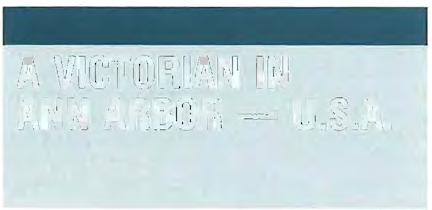
DURING THE PAST 42 YEARS THE INSTItute of Continuing Legal Education at the University of Michigan has conducted its unique Annual Advocacy Institutes at Ann Arbor.
What makes the Institute unique is that it takes the form of a trial conducted over a period of two days. A State Supreme or Federal Court Judge "presides" and experienced U.S. trial lawyers represent each of the parties. In fact there is a team of lawyers for each party.
The lawyers demonstrate their techniques in making opening addresses ("opening . ments"), in taking witnesses through e.vIdence-in-chief ("direct"), in cross-exammmg witnesses ("cross") , re-examination ("redirect") and in making final addresses ("closing statements) in the context of a realistic trial scenario. Two counsel conduct each cross-examination to demonstrate comparative methods of dealing with the same witness.
After each segment of the trial there is a discussion by a moderator with the lawyers and the Judge as to what was done, and why it was done in that manner. The discussions are frank and informative.
In the Institute "trials" the witnesses are people whose professional or other experience of life is appropriate to the role they are chosen to play.
During the Institute, academics and practitioners give lectures on subjects such as techniques involved in the conduct of litigation of a similar type to the subject of the demonstration trial.
Registrants attending the Institute come from Canada as well as the U.S.A. and their range of experience extends from first-year lawyers to highly experienced practitioners. Many tend to
that the world is flat?" Said the desperate young man at once: "I can teach it either way."
Returning now to Tennessee ; in 1976 it was reported that the then state sena.tor Fred Berry, during the tradItIonal end-of-sessl(:)ll silly season, introduced a bill to name an offiCIal state fossil. When a voice vote was taken amending the bill to nominate Senator Berry as the state's official fossil, he withdrew the bIll.
Mal Park
be interested in the type ofiitigation which is the topic for the particular Institute. Some attend the Institute because they can "earn" CLE points in their own State. Others are, like some Australians, "conference-junkies". . .
At the end of each Institute the practItIOners are requested to complete a form expressing their views as to which party won, and to rate the performances of the members of the faculty who participate in the Institute.
The success of the Institute is' dependent on the choice of appropriate case files and the faculty. Superb organisation and the participation on the faculty of leading practitioners from throughout northern America (as well as Canada and England) have made the Institutes extremely popular WIth the profeSSIOn in both the U.S .A. and Canada. Average attendance exceeds 500 registrants for each Institute.
Having attended the 1988 Institute as server/registrant, I willingly an m.vItation to join the faculty for the InstItute WhICh was held in May 1991.
My role was to conduct the evidence-in-chief ("direct") of an expert witness in an e.mployment discrimination trial in accordance WIth the 1975 U.S. Federal Rules of Evidence. The U.S. Federal Rules substantially modify the common law rules. In U.S. Federal Courts opinion evidence which goes to the ultimate issue may be led, even where the issue is one on which ajury could form its own opinion , if the judge rules that evidence would (inter alia) be helpful to the JUry . In consequence U.S Federal Courts admit opinion evidence which Australian Courts would consider to be mere comment.
Differences in the rules of evidence apart, the similarities in our trial techniques are sufficiently comparable to allow an Australian barrister to participate and to utilise his experience to good effect.
Ann Arbor is a small and friendly UnIVerSIty town situated about 25 miles from Detroit.
of the Bar interested in attending the 1992 I.C.L.E. Annual Advocacy Institute should write to Mr. A Anderson , Director, l.CL.E., 1020 Greene Street, Ann Arbor, M.l. 481091444 U.S.A. (Fax: (313) 763.2414).
, Michael Shatin



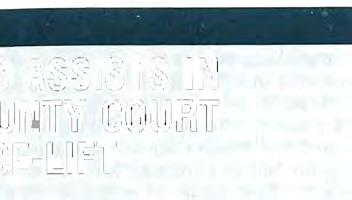
Reprinted by kind permission of th e 'SEC V News'.

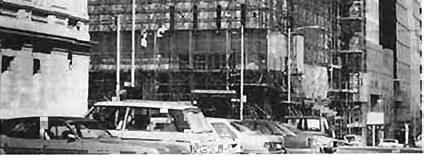
THE SEC HAS DEVELOPED A STRONG reputation for its expertise in value management.
Over the past few years , the SEC's Centre for Value and Quality has acted as consultant to more than a dozen outside organisations and run information sessions for executives from Malaysia , the Philippines and New Zealand and for local tertiary institutions . This is in addition to the centre's role in saving the SEC millions of dollars through more than 300 value management studies involving 1500 employees.
On e of the c entre s major projec ts th is year in volv e d a number of cli e nts representing the Ministry of Housing and Con s truction and the
Attorney-General's Department. They approached the SEC for value management assistance in a multi-million dollar plan to reclad the County Court in William Street, Melbourne.
The building had to be fully in use during the construction, which meant that noisy activities had be conducted outside business hours.
"Obviously, time and penalty costs would be at a premium," said Emanuel Moraitis, law branch manager for the Ministry of Housing and Construction.
"We had used the centre before and decided to call them in to facilitate a value management exercise. "
The SEC facilitator led a three-day value management workshop that involved a core team of eight , plus several part-time participants.
"Basically we reassessed the problem, used a lot of lateral thinking and came up with the best and most cost-effective solution," Emanuel said.
"As often happens in value management exercises, the solution grew from a throwaway line delivered in a half-joking manner.
"Someone in the team said: 'Why not throw a net over the entire building to restrain the old tiles and build a new facade?' This would save time and also the high cost of after-hours construction work.
"We than started questioning whether the old tiles did in fact have to be removed The team's solution was to leave the tiles there , make the old face perfectly safe and then construct a new one over the existing one."
The County Court re-cladding value management exercise identified cost savings of 25 per cent.
Peter Filby, the SEC's Principal Value Officer, said this was not unusual.
"Our role is to help people to do their jobs better and to identify opportunities for eliminating waste ," he said.
"In the process they save money and make their jobs more useful and rewarding ."
The purpose of the Centre for Value and Quality is to challenge accepted ways of doing things and to help teams come up with better alternatives.
Value management studies are conducted in a three- to five-day workshop setting where projects, products and systems are analysed in terms of how well they meet customer needs and the resources they use.
As the benefits of value management become evident , more SEC divisions are adopting it as a key element in achieving business objectives.
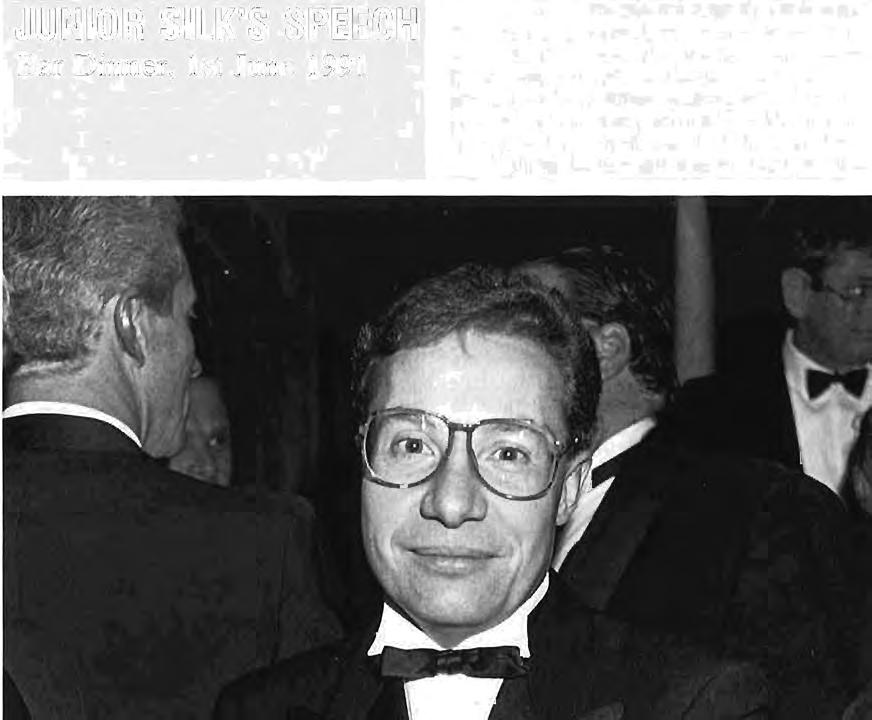
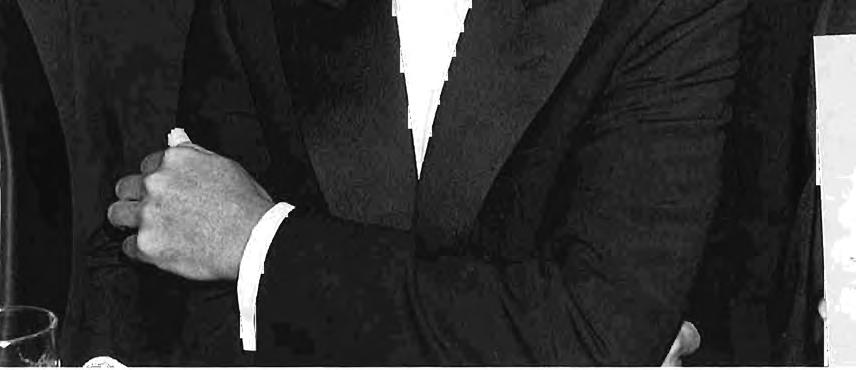
MR. CHAIRMAN, DISTINGUISHED
Guests, Members of the Bar.
Shortly after his appointment in 1840, Melbourne's first Superior Court Judge banned from his Court aU practitioners who wore moustaches
Young or owned racehorses. Plainly, he was ill-suited to Victorian legal practice.
His successor, an Irish barrister named Jeffcott, was chosen with great care. His qualifications for office were lauded in the Melbourne
newspapers as being - "BLAND IN HIS MANNER, OF FIRST RATE TALENTS AND ABOUT 40 YEARS OF AGE."
Each of our honoured guests is a first rate talent - in one or other field of human endeavour. Each of them is about 40 years of age. But if blandness is a necessary qualification for judicial office in Victoria, then our political masters have failed us in their latest crop. All is not lost, however, because each has certain qualities, including in some cases a certain "Irishness", that more than compensates.
The quality that other barristers envy most in their colleagues is "style". M.E.J. Black has it in abundance.
He is a creation of whom Graham Greene would be proud. The Egyptian-born son of an English soldier and airman, reared in the West Country of England. A student of Italy and its language who supported his scholarship by
applying a "Tuscany surcharge" to the heavier briefs. A talented mimic and slightly eccentric devotee of steam trains and model ships. A Friend of the Botanic Gardens, who thereby restores with one hand the fossil fuels that he destroys with the other.
Is that where the analogy stops? Come to think of it, there were mysterious absences, excused on such unlikely grounds as ajourney on the "Flying Scotsman", and a leaf-peeping tour of New England. What does the Defence Force advocate really do? Was His Honour a plant with the wilderness movement?
As an advocate, the Chief Justice was always striving for novel ways of presenting an argument. In the Dams Case, he sought leave to intervene on behalf of the Wilderness Society, and tendered a folder of magnificent colour photographs. The Chief Justice gave the tender a frosty reception, asking if there was any risk that the photographs would inflame the members of the Court. His Honour, in a tone of gentle re-

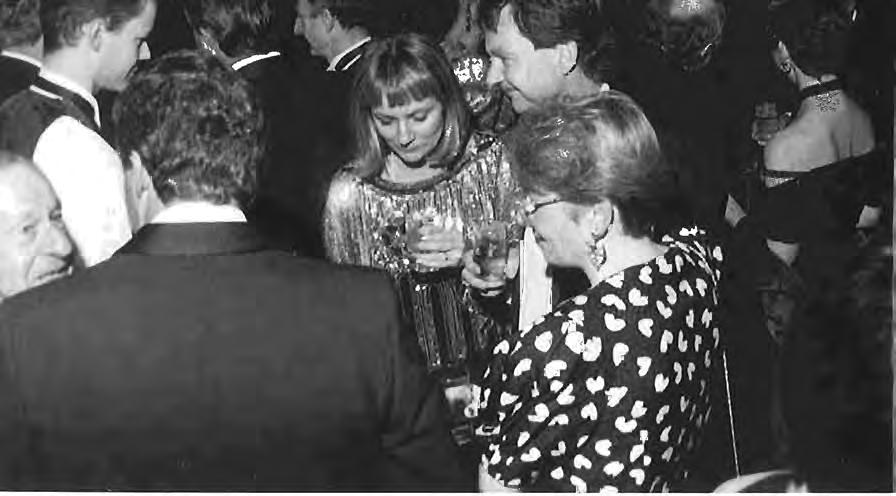
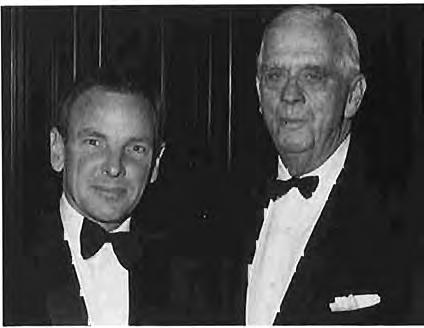
Andrew Kirkham Q.c., Sir John Starke.
proachment, merely said - "THEY ARE NOT THAT KIND OF PICTURE".
It is difficult for a man with so much style not to succumb to an occasional display of one-upmanship. Brian Shaw Q.c. once asked His

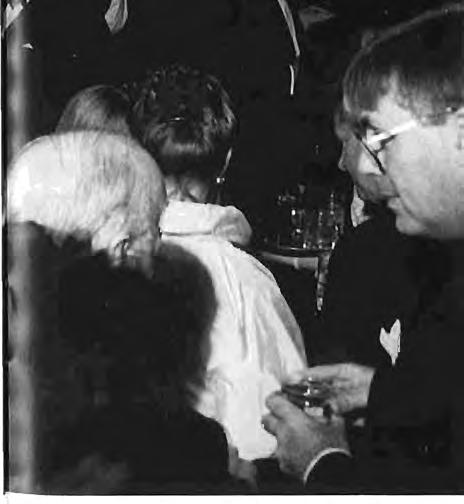
Honour why he insisted on referring to pastries as "STICKY BUNS". His Honour responded that it had nothing to do with "Paddington Bear". He had once been invited to Alderston Barracks by a friend for mess, and as he made his way to the table somewhat belatedly, Lord Montgomery of El Alamein caught sight of the late arrival and shouted out "STEWARD. GIVE THAT BOY A STICKY BUN ". Accordingly, His Honour said , he always called them sticky buns. Other examples are His Honour's habit of interrupting conversations with diverting questions, such as - "HA VE YOU EVER STEERED A PADDLE STEAMER?", or the observation he made to a town planning client that - "THE LAST DEVELOPMENT I STOPPED WAS THE FRANKLIN DAM".
The Chief Justice's skill as a draftsman is well known. This skill, not the careful organisation that immediately struck one upon entering His Honour's chambers, must have persuaded the Attorney-General that His Honour could cope with the administrative burdens of the office. In 1983, His Honour and several other members of this Bar were conducting a lengthy case in Perth. One week, proceedings adjourned on the Wednesday, and the Melbourne contingent immediately returned home. On Friday morning, each of them received the following notice:
A Hedigan warning was issued at 0800 today for all restaurants north of Collins Street.
An intense Hedigan moved rapidly across the Great Australian Bight on Wednesday and is expected to reach Victoria today. The Hedigan is of considerable size.
Junior Counsel should take shelter. Those of the rank of Queen's Counsel and above should go on a diet. Restaurant proprietors should take in extra provisions
Conditions are expected to be particularly severe on Friday.
Signed
M.E.I. BLACK Director of Warnings
As drafted by His Honour, the warning referred not to Mr. Justice Hedigan but to another member of this Bar, who shall remain nameless.
The Chief Justice's gentle humour, and his love of a good tale, suggest that he has some Irish ancestry. His Honour has another connection with Ireland. For years, hehas kept a shillelagh in his chambers. This particular cudgel is crafted from Huon pine, not oak like the traditional Irish weapon. Before his appointment, His Honour referred to it as "THE WITNESS IMPROVER".
The Throng No doubt it has now been rechristened - but


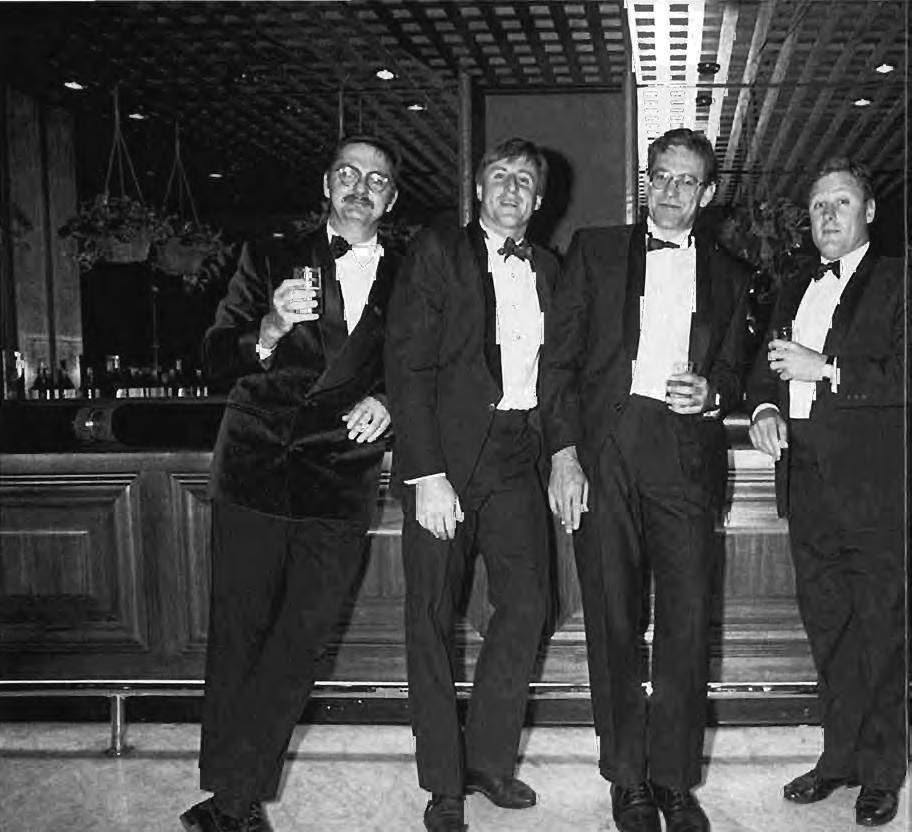
no-one is too sure whether its new name is "THE COUNSEL IMPROVER" or "THE BRETHREN IMPROVER".
We wish His Honour a long and distinguished career on the Bench.
MR. JUSTICE ASHLEY
The remarkable thing about Mr. Justice Ashley is that he could have combined the following pursuits - prize-winning cattle breeder, student of thoroughbred racing, ardent supporter of the St. Kilda Football Club, member of the Bendigo Wine and Food Society and the Bank Place Cricket Club, and hugely successful barrister in the workers' compensation field - whilst generating very few stories that can be utilised on an occasion such as this.
54
Having spoken to many of His Honour's friends and colleagues, it is clear where the blame lies - with his school cricket coach. He took a boy with natural flair and imagination, and transformed him into a dour and extremely correct opening batsman , whose greatest virtues were self-restraint and perseverance.
There is an old saying: "SCRATCH THE MAN AND YOU WILL FIND THE BOY.". Beneath the disciplined veneer of Mr. Justice Ashley, there is a boisterous youth who occasionally escapes. When His Honour invited a number of St. Kilda players for a round of golf at Commonwealth Golf Club; the golf proved to be very enjoyable, so did the 19th hole, and by the end of the day everyone was in high spirits. The normally circumspect Judge was one of the most
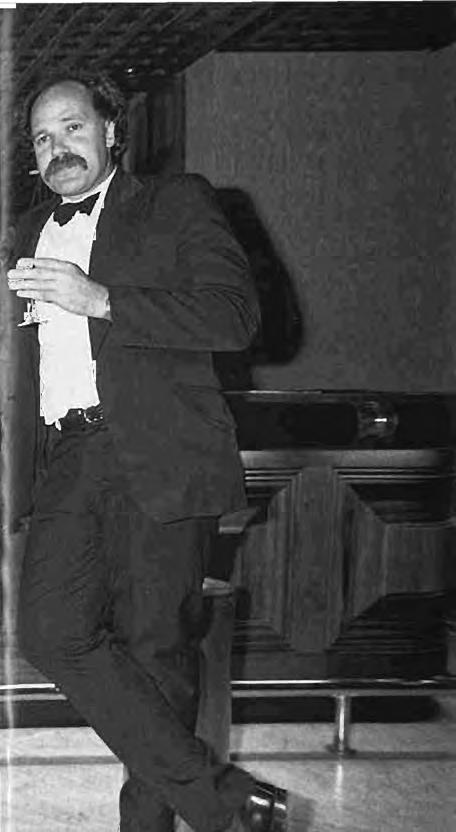

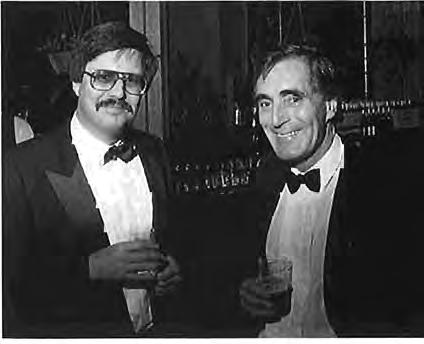
enthusiastic participants in the robust game of kick to kick that then transpired in the Club's car park. The members of the Club were not amused. Nor was the Disciplinary Committee. They were not much impressed by His Honour's defence of justification.
It is not normally so easy to tempt Mr. Justice Ashley from the straight and narrow. The Wittenoom Mine Case continued for many months in Perth. His Honour attacked the case with his customary single-mindedness, barely pausing to draw breath. One Friday evening, his junior and instructing solicitor persuaded His Honour to join them at the Burswood Casino. The whirl of roulette wheels and shouts from the two-up ring did nothing to remove the expression of grim concentration that His Honour had maintained for weeks. Taken to a blackjack table, His Honour professed to know nothing of the game. Besides, he said he had no money. Presented with several $5 chips by an obliging instructing solicitor, His Honour was told to place it on the table in the correct box. "BLACK JACK". Euphoria? Jubilation? Let's get on with the game? NO WAY! His Honour pocketed the money without a word - stood up - strode from the casino and caught a taxi back to the hotel to work on the case.
Clearly, His Honour is no night owl. This may explain why all of his prize bulls go by such curious names as "Morningtime Glittering", "Morningtime Hassett" and "Morningtime Harvey". I am reliably informed that, in honour of the class of 1991, and depending on their scrotorial measurements, the next generation are to be named "Morningtime Black", "Morningtime Mushin", etc.
His Honour is a distinguished addition to the Bench, and we wish him well.
Two of our guests have been guests at past Bar Dinners - Mr. Justice Coldrey when he was appointed D.P.P. and Gavin Griffith Q.c. when he was appointed Solicitor-General. But their achievements pale beside Mr. Justice Mushin's double.
His Honour received two official welcomesone in Melbourne and the other at Dandenong. I'm not sure what our Vice-Chairman said or did at the first welcome but, whatever it was, the Attorney-General felt compelled to attend the second. Few Judges have been accorded such an honour- and such an opportunity. It is surprising, therefore, that the second welcome did not proceed to the strains of Beethoven's Emperor Concerto - with His Honour as the soloist.
His Honour was never known to display such
D.P.P.(Cth.), Vincent J. reticence at meetings of the Executive Com-

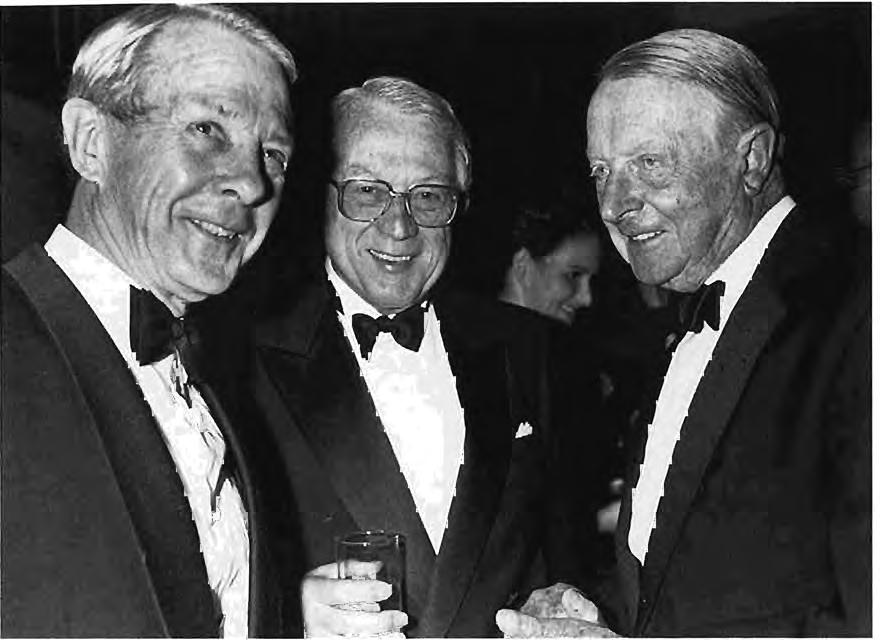
mittee of the Law Council's Family Law Section. Indeed, His Honour has built up quite a following at Jupiters Casino, Simpsons of Potts Point, The Atrium Hotel in Darwin and other venues much favoured by the hardworking Committee.
As an experienced family law practitioner, His Honour adheres strongly to the view that parents should escape from their children every now and then. Shortly before his appointment, His Honour and his wife were enjoying a weekend retreat at the Hyatt. His Honour emerged from the bathroom one morning, completely naked except for a towel draped around his shoulders, to be confronted by a helicopter hovering just outside the window. He dismissed the incident as having nothing to do with him. I am not so sure . It could well have been a task force from the Attorney-General's Department investigating His Honour's credentials for judicial office. If so, His Honour came through with flying colours.
In his leisure hours, His Honour retreats to Blairgowrie, where his renditions of "Danny Boy" have captivated the local population of magpies. Another Irish connection is that one of his clients, an ex-nun, was so impressed with His Honour's qualities of compassion, commitment 56
and skill that she named herinfaot son after him - NAHUM MUSHIN O'ROURKE. And, as those of you who attended His Honour's Melbourne welcome will know, moments of great stress can bring forth the most Irish of profanities, such as the occasion in the Synagogue when His Honour almost dropped the Scrolls of the Law and was heard to shout - "JESUS CHRIST HELP ME".
We wish His Honour well.
MR. JUSTICE HEEREY
Mr. Justice Heerey has two genealogical crosses to bear - not only is he Irish, he is Tasmanian. His father, Francis Xavier Heerey, was a Hobart hotelkeeper and State Labor parliamentarian.
His Honour had his eye on the Bar from an early stage. Immediately after his graduation from the University of Tasmania, he and a friend undertook a pilgrimage to Ireland. Whilst there, His Honour kissed the Blarney StoneAMONGST OTHER THINGS. The friend looked after navigation. This was very wise, because His Honour has an appalling sense of direction. He and a friend once attempted to drive from Echuca to Melbourne in a thick fog.
The friend drove, while His Honour leant out the passenger's window looking for the side of the road. Some hours later, His Honour announced that they must have reached Melbourne because he could see tram tracks. It was some time before he realised they were in Bendigo.
After returning from Ireland, His Honour soon found an opportunity to test his powers of advocacy. One of his university friends was Michael Hodgman, who later succeeded his father as Federal Liberal Member for Denison. Hodgman decided to stand for Tasmania's Legislative Council, and asked Mr. Justice Heerey to be his campaign manager. His Honour's campaign strategy was brilliant. He and Hodgman visited every pub in the electorate. If the clientele looked like Liberal voters, Hodgman took the initiative, introducing himself as Bill Hodgeman's son and ignoring His Honour. But if the clientele looked as if they voted Labour, His Honour took the initiative, first introducing himself as Frank Heerey's son and then introducing Michael Hodgman. Needless to say, no reference was made to Hodgman's father.
For those who struggle to keep on top of their work, His Honour's efficiency and organisation at the Bar were infuriating. He always seemed to be about to depart on, or to have just returned from, some exotic holiday. The vineyards of France, skiing in Vail, nightclubbing in New York, learning Italian in Florence - you name it, he did it - every other month, or so it seemed. And always first class. Even his cycling holidays were first class affairs - when he went cycling in France he was trailed around the backroads of Bordeaux by a little van stocked to the brim with the finest French cuisine and driven by a Michelin chef. His envious colleagues dubbed him "Holidays Heerey", but he was not deterred.
This talent did not desert His Honour upon appointment. His appointment came on the eve of Christmas, too late to be allocated his rightful role as Vacation Judge. With some anxiety, he asked the Attorney-General what he should do. His response - TAKE A HOLIDAY! And when His Honour returned tanned and fit from Noosa, his first judicial task was to attend a Judges' conference in Auckland.
Almost everything about Mr. Justice Hedigan is larger than life. His ability to converse, long and loudly, about an enormous range of subjects - literature, music, history, politics, horse racing and the Collingwood Football Club - is legendary. His knowledge of fine food and wine is immense - AND SO IS HIS APPETITE. His
resourcefulness is unparalleled - what other member of the Bar always carries a dozen bottles of the finest French red in the boot of his car, just in case the opportunity arises for a convivial feast?
His Honour was a renowned cross-examiner, who was rarely caught short by the hapless witness. But it did occur. His Honour was once opposed to Woods Lloyd in a custody case. Lloyd was appearing for the mother, who was alleged to be thoroughly immoral. During the weekend, His Honour's solicitor had the mother followed and discovered that she had booked into a motel on Sunday night, leaving the young child at home. Next morning the cross-examination was unrelenting. Eventually, His Honour suggested to the mother that she had gone to the motel for the worst of reasons. She denied this accusation. His Honour was then unwise enough to ask her what other explanation there could be, to which she replied - "WELL, MR. HEDIGAN, MR. LLOYD TOLD ME YOU WOULD BE CROSSEXAMINING ME THIS MORNING AND THAT ANYONE CROSS-EXAMINED BY YOU HAD BETTER GET A GOOD NIGHT'S SLEEP FIRST".
Mr. Justice Hedigan has a richly deserved reputation for saying what he thinks. Last year, His Honour was on the way to the grand final to see his beloved Collingwood. He was pulled over for speeding. As the policeman approached him,
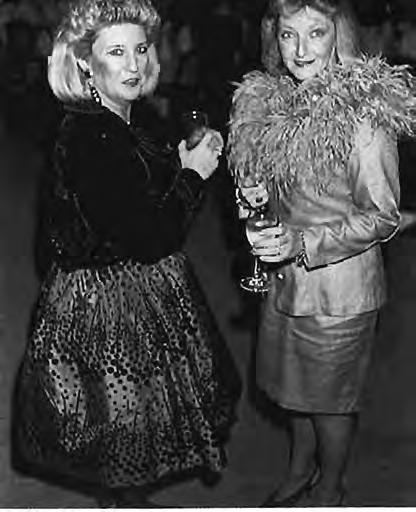

he asked His Honour whether he was barracking for Collingwood or Essendon. His Honour replied - "LISTEN SON, DON'T TRY TO MAKE A GOOD FELLOW OF YOURSELF, JUST BOOK ME."
More often than not, His Honour has the last word. Some years ago, when His Honour and his family boarded a flight in Paris, they found that every overhead locker was already full. His Honour surveyed the cabin and noticed that the other seats were occupied by members of a Japanese tour group. Reasonably, and in the politest of terms, His Honour registered his protest with the stewardess. She replied - "SORRY SIR, FIRST IN, FIRST SERVED". Whether or not they understood this call to arms, the encircling Japanese appeared to be nodding their agreement. Answering the challenge, His Honour glared about him and announced in a stern voice - "WE WON THE WAR. I'M NOT ABOUT TO LOSE THIS BATTLE". Thereupon, he emptied the contents of the locker immediately above his seat onto the floor, stowed his family's belongings, and took his seat.
It is very rare that someone else gets the last word, but it has happened. One lunchtime, having enjoyed what he thought to be a particularly fine restaurant meal, His Honour went to the men's room. While he was standing there, the kitchen hand came in, washed his hands , and stood next to His Honour. His Honour said"ANTONIO , FIRST YOU HAVE A LEAK AND THEN YOU WASH YOUR HANDS". Antonio said - "OH NO, MR. HEDIGAN, NOT IF YOU WORK IN THIS KITCHEN".
The Bar, and now the Bench , is fortunate to have such a character in its ranks. We can cope
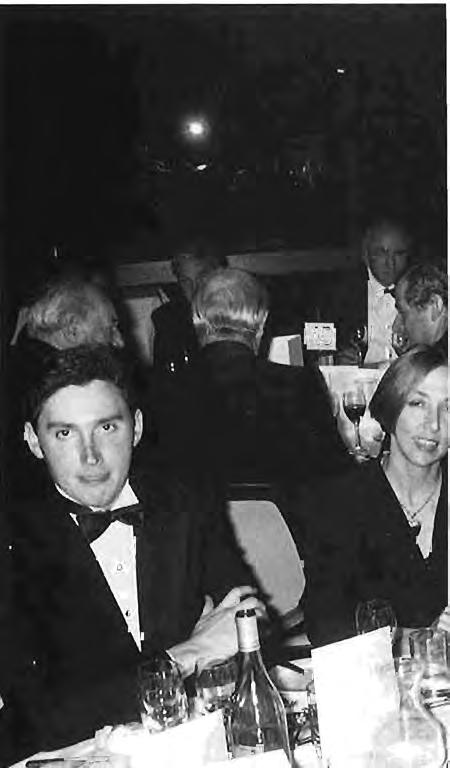

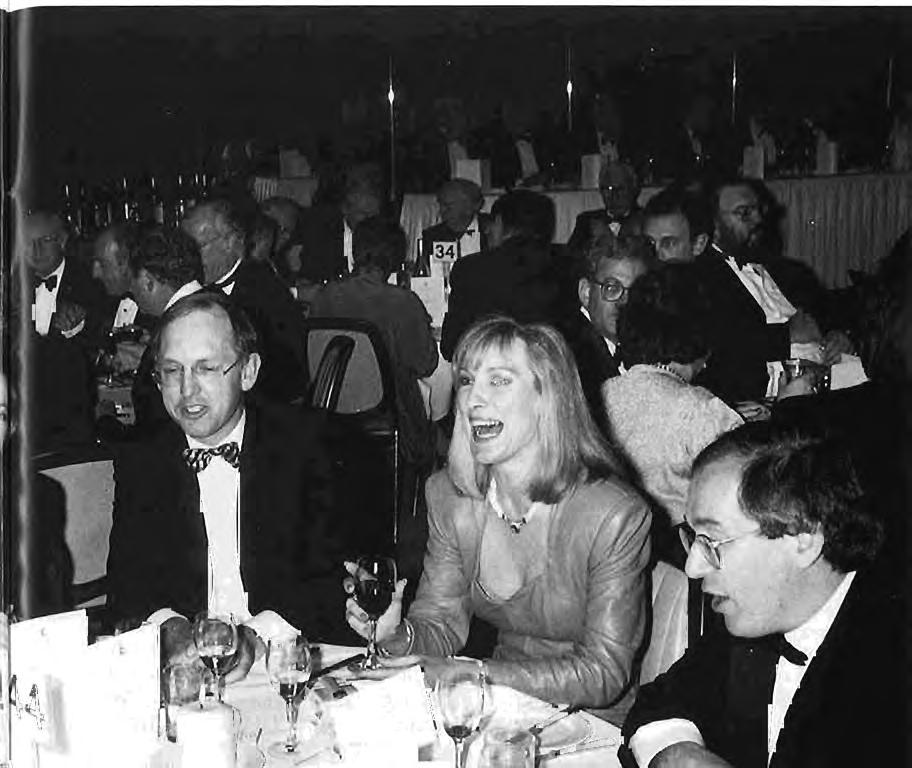
with one John Joseph Hedigan. The key is to keep in mind the aphorism that His Honour has been heard to invoke:- "YOU HAVE TO UNDERSTAND ONE THING ABOUT ME. I'M IRISH. ONE MINUTE I'M HITTING YOU, THE NEXT I'M KISSING YOU". We should, however, spare a thought for the denizens of Dublin. Several years ago, Costigan Q.c. and His Honour visited Ireland. They were invited by Hedigan's cousin, and namesake, who is a silk at the Irish Bar, to attend a gathering of the Hedigan clan at the Brian Boru Hotel in Dublin. In all, there were about 60 Hedigans presentone of whom was the President of the Licensed Victuallers of Ireland. According to Costigan, the din created by 60 Hedigans, singing, drinking and eating in a single room, was unbelievable. REST ASSURED, WE CAN BELIEVE IT.
We wish His Honour a long and successful career on the Bench.
Alas, poor Coldrey, we knew him well -a man of infinite jest, of most excellent fancy. Whatever possessed him, of all people, to accept a judicial appointment?
His Honour must have foreseen that. as a Judge, he would be presented with new and splendid opportunities to exercise his talents as raconteur, wit, poet and playwright, always before an admiring audience, and with his every word recorded for posterity.
Already, His Honour has given us a small taste of what is to come. In an recent case before His Honour, a medical witness was explaining the effect of asbestos on the lungs of those unlucky enough to inhale it. A demonstration model had been made available to assist the expert witnesses. His Honour asked the witness to explain one aspect of his evidence, by reference to the dummy on the bench. After a slight pause, His


What are they up to?
Honour added - "THE ONE ON THE LEFT."
Think what awaits us! Judgments consisting entirely oflimericks, or loosely based on Gilbert and Sullivan. Volleys of cross-examination, unrestrained by the objections of opposing counsel, delivered with the unique style that His Honour perfected at the Bar. A good example is His Honour's cross-examination of a police officer who had found the accused lying in the dry bed of the Todd River, with his head in a plastic bucket. First, he accused the Constable of removing his client, "Harry Butler-like", from his small hollow habitat. Then he grilled the Constable as to whether it was a size 6 or size 7 bucket, whether the accused had the handle under his chin, whether the bucket had any airholes in it, and whether the Constable was sure that the accused was not simply lying on top of the bucket. His Honour concluded: "SO, IF WE CAN SUMMARISE YOUR EVIDENCE, CONSTABLE, YOU TOOK HIM FROM THE BUCKET AND PUT HIM IN THE CAN".
Members of the Bar can also expect one-line demolition jobs, such as that aimed at His Honour when he applied for bail on behalf of a woman charged with murder. His Honour's bold submission was that to deny his client bail would
60
effectively orphan her child. To which the Judge responded: "MR. COLDREY, THE CHILD WOULD HAVE A FATHER BUT FOR YOUR CLIENT'S ACTIONS."
We can also expect the occasional barbed expression of gratitude. In one trial, His Honour commenced his submissions to the jury with these words:
"BEFORE COMMENCING MY SUBMISSIONS, I WISH TO THANK THE FOLLOWING PEOPLE. CONSTABLE CLIFFORD WITHOUT WHOSE TOTAL LACK OF PROFESSIONALISM THIS TRIAL WOULD NOT HAVE OCCURRED. COUNSEL FOR THE PROSECUTION, WHO HAS MGNOPOLISED THIS LECTERN THROUGHOUT THE TRIAL AND WHO HAS ONLY NOW, GRUDGINGLY, ALLOWED ME TO USE IT. AND GOD, FOR NOT MAKING ME AN INCH SHORTER FOR OTHERWISE I COULD NOT SEE OVER IT."
What finally convinced Mr. Justice Coldrey to accept the appointment was the prospect of joining his elder brother Vincent. Their partnership goes back a long way. It was cited by the Northern Territory Police Association as affording grounds for a special harassment allowance. Their Honours are already working on some new routines that can be put into effect whenever they find themselves on the same Full Bench.
Improbable as it may sound, there is some concern that His Honour may become afflicted by "judicial restraint". To date, the only evidence is that he was not the last barrister to lea ve the disco at the Darwin Conference of the Australian Bar Association. At least an hour before stumps were drawn at 5.00 a.m., he announced that if he did not leave, they would sweep him up in the morning. The cynically-minded may think that he could feel a judicial appointment coming on. The more likely culprit is Father Time.
Mr. Justice Coldrey is a blithe spirit, even ifhe is not a blithe Irish lad. At his welcome, His Honour identified six categories of Judges: publicity seekers, dull work horses, flamboyant forensics, public avengers, pending pensioners and terrified novices. His Honour observed that these categories were not mutually exclusive. With his special qualities, His Honour is destined to establish another category that is uniquely his own.
For most members of this Bar, appointment to judicial office arises unexpectedly in the form of a brieftelephone call from the Attorney-General, and is concluded swiftly in case the candidate has second thoughts.
Judge Weeramantry's appointment to Victoria's newest circuit court proceeded very differently. His Honour's nomination had to be approved by majorities of each of the qeneral
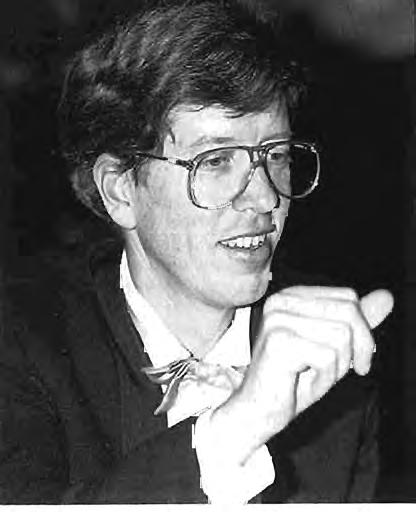
Assembly and Security Council of the United Nations. The process allowed ample time for reflection, but it is difficult to imagine anyone declining such an appointment. The perquisites of the office would make Gavin Griffith drool.
Judge Weeramantry intends to retain his Melbourne base, travelling to and from The Hague up to four times each year. This is a matter of some concern because His Honour has a very poor sense of direction , often losing his way between Doncaster and Monash University. Airline terminals pose a particular danger His Honour is colour blind and frequently finds that he has ventured down the "Green - Nothing to declare" path when in fact he is carrying dutiable goods, or that he is needlessly delayed in the Red Line. These problems are compounded by a profound absent-mindedness.
Fortunately, another of Judge Weeramantry ' s characteristics is that he is totally unflappable. Once, His Honour set off in a taxi for TulLamarine Airport on an international lecture trip, without his passport, wallet and traveller's cheques. About 30 minutes later, the missing valuables were discovered at home and a friend set off in pursuit. After a few miles, he saw the taxi parked at the side of the road and His Honour bent over the boot rummaging through his belongings His Honour accepted the proffered valuables without a hint of surprise, as if such things happen to him with such regularity as to be toally unremarkable. PERHAPS THEY DO.
The good burghers of The Hague were eagerly awaiting Judge Weeramantry's arrival. His Honour has a well-deserved reputation as a real estate investor. Not so long ago, His Honour purchased a house at auction one morning and, on the way home, saw a crowd of people gathered at another auction. He stopped, surveyed the house, and promptly bought it too. When he got home, his wife asked him if had bought the house. He said yes, and nothing else. Some time later, he confessed that he had bought two houses. His Honour claims that he preferred the second house, but the truth is that the first transaction had simply slipped his mind.
Judge Weeramantry's appointment to the International Court of Justice is a singular honour, and a fitting culmination of his life's work. It is an appointment in which this Bar takes great pride.
Judge Lewis is one of the profession's best known identities, and already represents an important slice of Victorian legal history. For many years His Honour was a leading Hamilton solRichard Brear. icitor. He was justifiably famous for his forensic
victories in Western District court houses, particularly his successful defence of drink-driving charges. In Casterton Court one day, he appeared for a repeat offender. client had been given a bond WhICh reqUIred hIS regular attendance at Alcoh.olics In his plea, His Honour explamed hIS clIent s noncompliance with this condition on the ground that "HE'S ONLY A SOCIAL DRINKER AND DOESN'T LIKE DRINKING WITH A LOT OF PEOPLE HE DOESN'T KNOW."
As Executive Director of the Law Institute of Victoria, His Honour came into close contact with Hartog Berkeley Q.c. One weekend, Berkeley persuaded His Honour to come canoeing on the Goulburn River. By the time they got the hang of paddling, they were approaching a bridge. The river narrowed, the speed of the ?urrent increased greatly, and they headed straIght for one of the supporting pylons. His Honour shouted - "LEFT". Berkeley shouted"RIGHT". The canoe snapped neatly in half. In the catastrophe, His Honour lost his stick and his boots. He found a branch to use as a stick, and together he and Berkeley set off across the paddocks. Berkeley led the way, His Honour muttering and swearing behind him, limping along with stick in hand. After a while, Berkeley looked back to find five children from the nearby camping area marching in single file behind His Honour each with a stick, each limping, and each and swearing. By the time they reached their car, His Honour needed a drink. So they stopped at the local pub where His bought, and quickly consumed, a bottle of BaIley's Irish Cream - NOT EXACTLY THE IMAGE BAILEY'S SEEK TO PROMOTE IN THEIR TELEVISION ADVERTISEMENTS.
Outside the law, His Honour can boast many achievements. He was the ABC's film critic, until that organisation's search for a trendier image led them to recruit John Hinde. His Honour also had some success as a racehorse owner. Once, at Ballarat, he thought his own horse had little prospect of winning. Nonetheless, he had agreed to back it on-course for various colleagues. As the horses entered the mounting yard, His Honour announced to his companions that he would hold the bets himself. As the race progressed, His Honour turned progressively greyer. When the field entered the straight, his horse was leading by a clear length. To the amazement of those around him, His Honour commenced waving his stick in great agitation, and shouting repeatedly at the top of his voice - "DROP DEAD, YOU BASTARD". His Honour was fortunate in two respects - the stewards were out of earshot and the horse did die on its run.
There is little doubt that His Honour has the
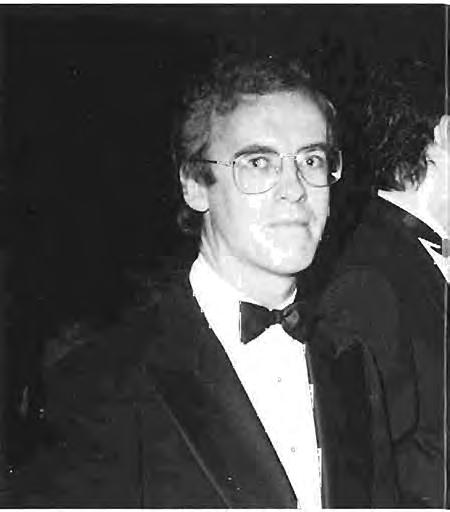
qualities that make a great judge. There is also no risk that His Honour will quietly disappear from the public eye. Despite the stiff competition offered by other members of the County Court Bench His Honour is bound to go on commanding hi's fair share of legal anecdotes, if not newspaper headlines.
Gavan Griffith was astonished when he was awarded the Order of Australia. Most of his colleagues were not. If ever a member of this Bar has climbed the greasy pole, it is Griffith. His C.V. is something to behold - pupillage with Hulme Q.c., fellow and then lecturer at Magdalen College, Oxford, member of Lincoln's Inn, proud owner of a Rolls-Royce at the tender age of 23, absentee French landowner, minor property magnate, longstanding Commonwealth Solicitor-General, Director of the National Gallery of Australia, and now, to cap it all, the recipient of the Order of Australia. It is a most deserved honour, standing as it does for "ALWAYS OPERATING".
It is hard to believe now, but Griffith's High Court practice got off to a rocky start. One motions day, Andrew Rogers invited Griffith to sit beside him at the Bar table. Griffith immediately agreed, although he was not briefed in the matter. It was very late in the afternoon before Rogers' matter was called on. Rogers announced his appearance with Griffith, told the Court that "HE HAD A PLANE TO CATCH AND A MARRIAGE TO SAVE, AND THAT HIS

LEARNED FRIEND DR. GRIFFITH WOULD PRESENT THE ARGUMENT".
Over the years, Griffith has accumulated the most extraordinary collection of neckties. Twelve months or so after his appointment as a Director of the Australian National Gallery, one of the curators approached Griffith and asked him if he would donate a selection of them. Griffith was immensely flattered - until he discovered that they were to form part of a display of clothes worn by rockers in the early 1950s. In the past seven years, Griffith has revamped the office of Solicitor-General - literally and figuratively. As a first step, he partly demolished and then redecorated the Solicitor-General's suite of offices. Next, he threw out the inkwells and quill pens, installed the latest electronic gadgetry, and recruited a succession of highly qualified assistants. He acquired an MG-TC sports car, solely to convey him and his junior to the High Court. Sadly, the MG can no longer cope because, with less noise and greater success than Kevin Sheedy, Griffith has expanded the number of interchange players allowed in contests before the High Court.
Nowadays, Griffith appears in Victoria only rarely. At the ceremonial sittings held to mark the appointments of Chief Justice Black and Justice Heerey, Griffith appeared in full-bottomed wig. But for his unmistakable delivery, and the fact that the wig was askew, he could easily have been mistaken for a New South Welshman. However, if the rumours circulating the Bar are correct, Griffith may be seen more regularly in
Victoria in future, and he may need that fullbottomed wig.
The Bar takes great pride in the achievements of its members, all the more so when those achievements take place in the national arena. Gavan Griffith's standing in the profession is testimony to his exceptional skills, and this latest award is a fitting recognition of his achievements. We wish him continued success.
The Bongiornos hail from the island of Salina, one of the Liparian Islands lying just north of Sicily and to the west of Calabria. The curious thing about Salina is that the islanders all carry surnames which are almost too Italian to be credible - names such as Bongiorno , Santamaria, A ve Maria and Santospirito. They all seem to be aliases , adopted cenluries ago, probably with the object of persuading the authorities that the islanders were devout churchgoers and lawabiding citizens. The truth is that the Salinese are renowned for their sense of mischief.
A sprinkling of this quality seems to have filtered down to Bongiorno. He spent his adolescent years in Geelong, at a time when trams used to rattle up and down its streets. There was one prank which gave Bongiorno and his adolescent mates hours of enjoyment. Not far from the Bongiorno family home, the trams descended a steep hill and then climbed another. Bongiorno and his friends would lubricate the tram tracks on each slope with heavy machine oil. As a tram came down the first hill, it would gather speed
uncontrollably; but as it travelled up the incline it would lose traction and eventually slip backwards. Bongiorno spent hours watching the tram try to escape its predicament, sliding backwards and forwards between the two hills like a pendulum.
There has always been a certain boyish innocence and enthusiasm about Bongiorno. Late one afternoon, Percy Dever despatched the eager young barrister eastwards with the words "FIRST UP AT SALE TOMORROW". Next afternoon, Bongiorno dutifully reported in from Sale Court House that his case had concluded. Dever replied - "GOOD. YOU'RE FIRST UP AT HORSHAM TOMORROW".
Bongiorno was especially adept at managing two or more cases at once, although sometimes he paid the penalty. On one occasion, Bongiorno slipped away to another Court just as his opponent, Arthur Adams, commenced his final address to the jury. Adams made great play of Bongiorno's absence, asserting that the case was so unimportant to the plaintiff that its senior counsel was rarely there. At that precise moment, Bongiorno re-entered the Court.
No-one could accuse Bongiorno of being aloof or pretentious. His idea of a lavish lunch is half a dozen deep fried crab rolls at his favourite fish and chip shop; or a "SPAG and VINO". He always gave generously of his time to assist his fellow barristers, especially members of the junior Bar. In return, his juniors were expected to pamper and support him above and beyond the call of duty, e.g. by ensuring that a table is always available for lunch at a suitable Italian restaurant, keeping an extra supply of heart pills at the ready, being available for conferences at all hours, mucking out the downstairs bar at The Fijian at 4.00 a.m., and, most importantly, never being late for Court in case Bongiorno is detained elsewhere. The reward was to be invited to the Bongiorno household for dinner and, so it was said, some preparation on the eve of the trial. On such occasions, the junior would be overwhelmed by hospitality, liberally supplied with food and wine, and regaled with stories of Bongiorno's Italian grandfather and Irish grandmother. The idea of preparation was quickly forgotten.
The office of D.P.P. is an important and difficult position. We confidently expect that Bongiorno will shoulder its burdens with distinction and compassion.
The Masters of the Supreme Court afford a leading example of micro-economic reform. Flexibility and productivity have become the order of the day. "Work to Rules" is unheard of; the new Rules mean whatever the Masters say 64
they mean. The jurisdiction is burgeoning. Their Court rooms are increasing in number and shrinking in size as new and more unlikely alcoves are found within which justice' can be dispensed.
There are few trappings of office. This ought not to concern Master Wheeler because he can always indulge his appetite for costume and ritual at regular meetings of the Brighton Lodge.
Master Wheeler has one particular trait that was effectively lost to the profession upon his appointment. Whenever he becomes agitated or excited, he tends to rock backwards and forwards from heel to toe. The movement becomes especially pronounced when he is about to unleash some witticism. This characteristic allowed Master Wheeler's opponents to gauge his level of interest in settlement propositions, or his degree of concern about the evidence. Those who now appear before the seated Master have been deprived of a sure-fire means of judging whether their submissions are being well or badly received. Bystanders have been deprived of the opportunity of escaping the Court room before Master Wheeler unleashes one of his jokes.
Like Justices Heerey and Coldrey, Master Wheeler is a sailor. Mr. Justice Coldrey managed to collide with the Port Melbourne pier, but at least he could blame his crew. Justice Heerey left his fully-rigged yacht at a Derwent River jetty whilst he slipped up to the pub, and returned to find it sailing off into the sunset. But at least his helmsmanship was not to blame. Master Wheeler has no excuse whatsoever for what happened in the Hawkesbury River. He doesn't drink, the crew were below decks, and he was at the wheel. Somehow, he contrived to turn his 20 foot yacht upside down. Had the water been deep enough, the entire mast, not just the first 15 feet or so, would have been pointing at the riverbed.
Thankfully, Master Wheeler is much better at grappling with the Supreme Court Rules. We wish him well in his new role.
There is a traditional Irish toast which aptly conveys the Bar's warmest congratulations and best wishes to its honoured guests:
May the luck of the Irish possess you
May the Devil fly off with your worries
May God bless you forever and ever!
May the good Lord take a liking to you - but not too soon!
Members of the Bar, would you please charge your glasses.
Our Honoured Guests
Neil Young

IF CINDERELLA HAD COME TO THE BAR Dinner Ball she would have worn a black velvet mini skirt. Black short and velvet was definitely the fashion item of the evening.
Not that there won't be a few Cinderellas after our good government announces the name ofthe new Chief Justice in a few months time. Yes the hot gossip at the tables was, who is going to be transformed from a barristerial pumpkin to radiant c.J.? But some wise heads cautioned that it may not be a barrister at all. I mean who could argue with the appointment of a social worker, case flow manager or even an honest politician?
Mr. Junior, Neil Young Q.c., fueled speculation that our esteemed Commonwealth Solicitor-General, Gavan Griffith Q.C. may get the nod and end up with a fair dinkum full-bottomed wig. Neil's speech was as well measured as his suit. It will read well in the pages of Bar News.
The topic of the future Chief Justice has become so topical that even the Sunday Age ran an article on it. One wonders if the press were skulking under tables at Leonda in order to glean the names of the possibles.
510 barristers turned up this year -a record. Is this a reflection on the growing size of the Bar? Is this a reflection on the effects of the recession on the Bar? Soon the Sidney Myer Music Bowl or the Tennis Centre will have to be hired to accommodate the masses.
But of the 510 there also must have been a record in the number of delightful gowns, worn by delightful persons. The short black velvet brigade consisted mainly of these in the 30 and under bracket. Graeme Hick's reader Rosemary Carlin struggled womanfully all night to control the shortest of minis. Diana Bryan and Sarah Lindsay also stunned in this delightful fashion mode. Although high priestess offashion Michelle Quigley did point out that short and black is what she wore last year. This year she looked divine in a long crushed cream creation, of the house of Marianne Hardwick.
Green and velvet also had its followers. Felicity Hampel's choker did stand out. It was rather a pity that Carmel Morfuni was wearing the same velvet choker ensemble albeit in black.
But I suppose such things are inevitable.
Last year's junior silk Susan Crennan had decided to leave her Studebaker Hawke outfit in the garage. Instead she was radiant in a red, orange and black psychedelic pattern with a somewhat '60s feel.
There was a good layer of cream as well. Lindus Krejus looked rejuvenated in a long cream silk gown. Anthea McTiernan, although "on duty" in her role as chairperson of the Bar First Aid Committee, looked suitably medical in off white and a new hairdo.
As for the malepersons, it was much of the same. Ex-D.P.P. and now Mr. Justice Coldrey has at last traded in his 1960 Del Monti terylene blend tuxedo for a very up-market Ermenegildo Zegna outfit. Although he claims to have snapped it up at a garage sale in Alice Springs, new D.P.P. Bernard Bongiorno has yet to buy his Ermenegildo Zegna suit.
They say that many barristers are, indeed, frustrated thespians. Betty King definitely has a touch of theatre about her. My word what an outfit she had on. Rumour has it that she borrowed her costume from the wardrobe department of "Hey Hey It's Saturday". The turquoise ostrich feathers were outstanding.
So the evening unfolded. David Harper had a real job on his hands trying to control the sometimes unruly throng. His spell as Captain of Melbourne Grammar in the early '60s certainly came in handy on the evening, as he tamed the noisy talkers from his place on the rostrum. Michael Dowling was seen at the end of the evening writing out the Bar Rules ten times. Harper assured everyone that this was the last time Dowling interjects anywhere! Well done David.
And so as the clock struck twel ve the armagnac and port were hurriedly cleared from the table, so that no-one would turn back into a pumpkin. Those who did not heed the words of their fairy godmothers headed off for Silvers, Red Head, or wonder of wonders a nightclub in Hawthorn called Caseys. There they duly turned into mice and pumpkins. Next year the dinner is to be held at the fabulous World Trade Centre. What a change! Only then will we know who were the real Cinderellas of the 1991 Bar Dinner.

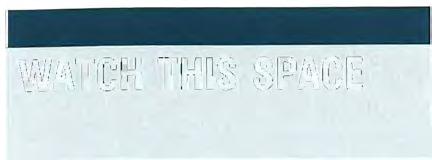
ON 15 NOVEMBER 1989 BARRISTERS' Chambers Limited on behalf of the Bar signed a contract to purchase a vacant building site at 544 Little Bourke Street Melbourne. The Bar was advised by memorandum that the acquisition price at $5.75m was "good news".
Since acquisition the development of the site has been the subject of significant debate and consideration by Barristers' Chambers Limited. In a recent exchange of correspondence between the Bar News and Barristers' Chambers Limited we were advised by the Chairman of Barristers Chambers as follows:
I refer to your letter of9 May last concerning an article for the next edition of the Bar News concerning the progress of the plans for the development of the site in Little Bourke Street.
A special committee was set up by Barristers' Chambers Limited to consider all of the various proposals. The recommendations of that committee are expected to be to hand in the very near future. What is then proposed is that Barristers' Chambers Limited will make a decision not only on what proposals will be actively pursued for the future accommodation at the Bar, but will at the same time be making recommendations concerning what it considers to be the best of several proposals to finance the project which will result in the Bar itself owning the accommodation provided.
The recommendations of Barristers' Chambers Limited will be placed before the Victorian Bar Council for approval, after which it is expected that the Bar will be fully circulated and asked to approve the conclusions which by that stage will have been reached by both Barristers' Chambers Limited and the Victorian Bar Council.
I can assure you that an enormous amount of work has been done as, in the current economic climate, you would appreciate that there have been several offers to
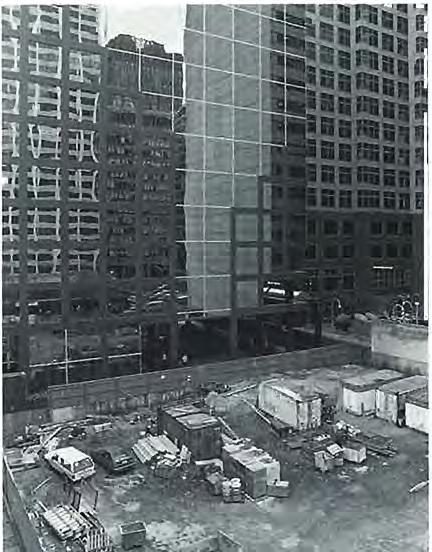
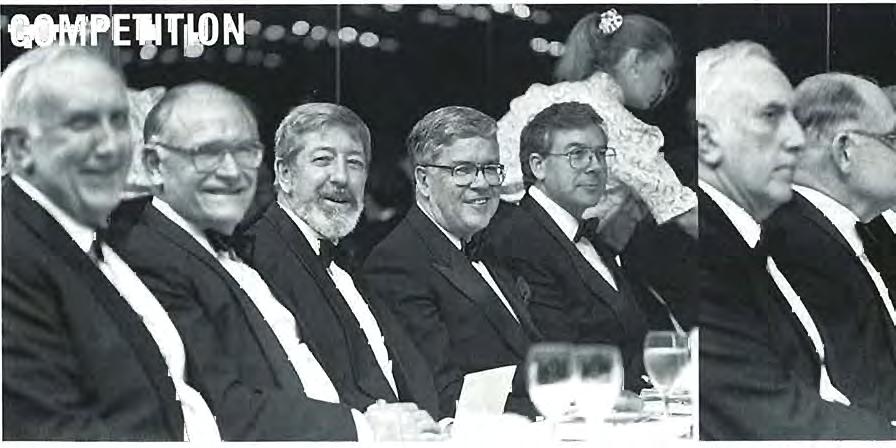
develop the site which have been received. All ofthose offers have been investigated, and several have been found to be so "half-baked" as LO warrant their rejection . Others have required fairly ext e ns ive in ves tigation. At present, the position is that one oAer has been singled out as being the best but even yet some aspects of it are still being explored.
At the same time the purchase and refurbishment of an appropriate building is also being considered, which also involves the question of whether such purchase and refurbishment can be undertaken at an affordable cost. This last question also involves whether such purchase and refurbishment is a strict alternative to the development of the site , or whether it can proceed as well as the development of the site. In all these circumstances, I believe it is premature to be writing the article you seek at this time. Yours faithfully Garth
Buckner Chairman of Directors Barristers'
Chambers Limited.
By way of further letter dated 28 May 1991 from the Bar News to the Chairman of Barristers' Chambers, we wrote as follows:
Thank you for your recent letter of 22 May regarding development of the site in Little Bourke Street. The development of the site is a topic of considerable interest to the Bar and although you say it is premature at this stage to provide an article, we believe our readers would be interested in the progress to date. The sort of questions we would like you to deal with are:
(a) What are the current proposals to develop the site?
(b) What are the advantages/disadvantages of each proposal?
(c) What investigation is being done in respect of the proposals?
(d) What are the current monthly costs of financing the acquisition and retention of the site?
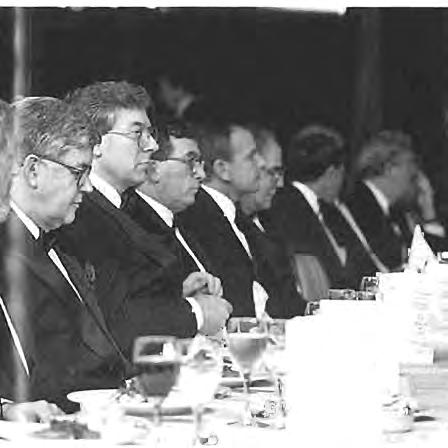
(e) What arrangements presently exist as to the use of the site? The site appears to be covered with building materials and has cars parked on it.
(f) As to the proposal of purchase and refurbishment of another building either as an alternative or as well as the site, we would be pleased if you could provide progress on this option.
I have written to Ed Fieldhouse asking for some financial information and a copy of that letter is enclosed.
The Bar News wrote on the same day to Mr. Fieldhouse, Company Secretary of Barristers' Chambers , as follows:
We wish to provide some information to our readers for the next edition of the Bar News. Accordingly would you please provide the following financial information in respect of the acquisition of the development site in Little Bourke Street:
(a) What was the "all up cost" to the Bar for-purchase of the site?
(b) How is the purchase being financed?
(c) What are the current monthly costs of financing the acquisition and retention of the site?
(d) What are the annual outgoings on the site?
(e) Does the site provide any income?
By letter dated 30 May 1990 the Chairman of Directors of Barristers' Chambers advised as follows:
I have just received your letter of 28 May and I am responding in haste to let you know that it will be impossible to let you have the information which you seek because, to do so, requires a great deal of work which would have to be obtained from the Special Finance Committee which has been dealing with not only the questions you raise, but several other matters involving the future accommodation for the Bar.
That Special Finance Committee has been working very hard in order to present a report to the Board which will involve, I would think, a series of special meetings by the Board which will, once resolution is reached, involve possibly a further series of special meetings by the Executive Committee of the Bar Council and then possibly the Bar Council itself.
It also seems possible, dependent on the views of the Board, that directions will be given to valuers who have been employed in order to provide general advice Speaking for myself, I am very anxious that the Bar as a whole should not be disadvantaged in the way in which it is proceeding by any advance publicity which must be "half-baked" as it is by no means complete.
I trust that you will appreciate the position. As soon as matters are more clear , I would only be too happy to take the appropriate steps to ensure your readers are given up-dated information.
As a consequence of this exchange of correspondence the Bar News expects to be in a position to provide a comprehensive article as to the progress of the development of the site for the next edition of the Bar News.
Graeme Thompson

Coram: STANI STREET S.M.
Crash and bash which took place on a narrow gravel road near Dargo
Stribling: You could not know where my client's car was on the roadway because you did not arrive at the scene until after the car had been moved - That's right, isn't it?
Witness: Yes, but I know where it was because my husband told me (the husband was the other party).
Stribling: Your Worship, I object on the grounds of hearsay.
Magistrate: Mr. Stribling, these people are from the hills beyond Dargo. They don't understand about the technicalities of the law of hearsay.
Stribling: Your Worship, I realise they don'tbut I had hoped you might.
Coram: PETERSON J., POLITES DP and COMMISSIONER CONNELL, 16th May 1991
Telecom Australia (International) Limited v. Public Sector Union.
Polites DP: "But you might find statements like that in relation to the Ford Motor Company's Capri program, mightn't you, Mr. Haylen, really."
Haylen Q.C.: "Well, I do not know that you would. I thought the Capri was a bit of a dog, wasn't it, Deputy President?"
Polites DP: "Well, it is the largest manufactured export leaving the country, $400 million last year. Now, if it is a dog, it seems to be a fairly effective dog."
Haylen Q.C.: "I think it was more in the terms of perhaps product reliability than how many it has sold."
Polites DP: "Well, I have not had any trouble with mine, Mr. Haylen."
Mr Haylen Q.C.: "I withdraw everything I said about it. It is a wonderful car."
68
Coram: JENKINSON J. Australian Securities Commission v. Graco (30.5.9l.)
Jenkinson J. entering the Sixth Court at 451 Little Bourke Street via the public entrance and proceeding through to the Judges' Chambers behind: "I apologise for this gentlemen. We have to come this way. We don't have a key."
Coram: JUDGE KELLY R v. Liu, Yam & Yap
Mrs. Hampel: "I don't object to it, but Your Honour will understand that listening to Mr. Bongiorno prosecute reminds me dreadfully of when I was going to dancing classes as a student, and the boys were always creating difficulties. One must always be alert because one's never sure just how far Mr. Bongiorno's going to go, Your Honour, and I wasn't sure how much of that statement he was going to lead. That was why I put the objection at the time that I did."
His Honour: "Why don't you think of writing a book about it, calling it, for instance, "The Tribulations of a Virgin in Distress" or some such thing? Bring in the jury, Mr. Tipstaff." Later ... His Honour: "I notice that you readily slip into the habit of calling him Alwin. Was that encouraged throughout the company as some form of meretricious modern matiness, or was it something that you were asked to do because it was Japanese in its custom?"
Witness: "No, I think just because it was a very close office, everybody was on first name terms, and, you know, it wasn't as if we were a huge department as such where there were many thousands of people. You saw each other each day and it was first name terms with everybody."
His Honour: "That doesn't suggest that management was keeping itself too distant from its staff'?"

Witness: "I question that in the sense that, you know, it's just a greeting. We knew who Alwin Yam was , he was a manager."
His Honour: "I'm right in describing it as meretricious modern matiness , it really had no substance. Behind it there was stilI the same barrier between staff and management?"
Witness: " Most definitely , you know, the system was that everybody knew each other on Christian name terms."
Mrs. Hampel: There was no doubt still but that Mr. Yam was the manager?"
Witness: "Most definitely, yes."
And Mr, Lin was the boss? Yes. His Honour: "Can you remember their surnames. Michelle was that Michelle Rayner?"
Witness: " yes, I think so."
His Honour: "Yes"?
Witness: " Sally Rain-no. And Also Debbie. Because we don't use the surname that often. So ... "
His Honour: "You just remember their first name?"
Witness: " ... The first name, and that she lived in Dandenong; Sally lived in Springvale."
His Honour: "In that case we shall revert to feudal times. Henceforth we shall refer to her as Debbie of Dandenong, and the other as Sally of Springvale. "
(4 June 1991)
Coram: JUDGE STOTT. R v. City of Dandenong
Mr. Winneke: (Having just upturned a glass of water) "if Your Honour would pardon me for a moment. I seem to have had a tragedy here. It is almost inevitably so. It is a combination, Your Honour, I might say of not being able to see properly as I get older and the absence in these courts of lecterns which would be very helpful if we could have them, but we do not seem to run to lecte rns. I a m grateful to Your Honour 's tipstaff' who is very quick wi t h t he towel. It is obviousJ y a n eve nt that happens her e not in frequentl y, Yo ur Honour .'
Coram: JUDGE JONES
Fred's Interstate Transport PIL v. Commercial Truck (Underwriting Agency) PlL
The Managing Director is being cross-examined as to the circumstances ofthe cessation ofemployment of a truck driver after he had rolled a truck
Devries: "He was sacked wasn't he?"
Mr Borg: "No"
Devries: "No?"
Mr Borg: "He was, what I would say, discreetly terminated?"
After a significantly long pause Devries: "Discreetly terminated?"
Mr Borg: "Yes, when he returned we told him we had no truck for him to drive."
Coram: HEEREY J.
His Honour: (Having asked a witness some questions): "Do counsel have any questions arising out of my questions?"
There was no response. His Honour: "May the witness be excused?"
Police v. Haustorpher 7th June 1911.
Coram: HANRAHAN, Magistrate K. McGOWAN for defendant
Police informant: "We intercepted the defendant, hand-cuffed him and took him back to the police station where he was placed in an interview room . We commenced to strip search the defendant. When I removed the defendant's jockettes I located two aluminium foils under his scrotum . I seized them as an exhibit."

AUSTRALIA NEEDS AUSTRALIAN REStaurants. So said visiting Anglo foodie Keith Floyd on his recent television series "Floyd on Oz". Indeed he went further and said Australia needs Aboriginal restaurants. This seemed odd as most of his "Australian" recipes consisted of some sort of chilli - lemon grass - coriander - coconut milk - stir fry - very much in the Thai style.
Kelly's is neither an Aboriginal restaurant nor in the Thai style. It is, however, very much an Australian Bar and Restaurant. As the name suggests it is named after the famous bushranger himself, it is difficult to avoid him if once inside.
As you descend the stairs into its basement location at 390 Lonsdale Street, Melbourne, you are confronted by two nineteenth century bush buildings. One contains the bar. One contains a restaurant for those seeking more private dining rooms. The rest of the basement is adorned with the armour, and other memorabilia of the great outlaw.
The two bush buildings are replicas of the Kelly residence, built for his mother's house, and the Glenrowan pub where he drank. A very good idea. Sitting inside a Kelly bush house in a basement in Lonsdale Street is very novel. After a few glasses of Kelly wine (from Glenrowan of course) or Kelly ale, twentieth century Melbourne seems far away. Indeed the life size model of the man himself resplendent in bullet ridden plough mould armour, almost takes on life. You keep your back to the bar and check your wallet.
The partners in the venture thought a genuine Australian pub-restaurant would be a good idea. They thought it would attract the tourists of Melbourne. In case you didn't know it, large numbers of tourists do visit our dear old city. They are overwhelmingly Japanese with a dash of the odd American. You can spot the Americans. They are usually wandering around lost on a tram, or videoing the Victoria Market. They don't have to speak, their clothes do all the talking. Baseball caps, white shoes, crimplene casual crush suits, and bomber jackets resplendent with catch phrases such as "Ronnie and J ackies 50th Anniversary World Tour." I presumed Ronnie and Jackie were not completing their fiftieth an70
nual tour of the world - including the Victoria Market.
Then there are the Japanese. It is logical to believe that a restaurant like Kelly's would be the perfect place for Japanese to visit. It has history, Australian food and beverages. Alas no. The vast bus loads of camera clad Japanese have very tight and limited itineraries. They mostly stick together and do exactly what the tour guides tell them. That consists of a nip down to the penguins (the joys of Phillip Island escape me), a quick bus trip round the city, stopping to snap the odd berobed barrister crossing William Street, interposed with a few local Japanese restaurants.
Therefore Kelly's has not attracted the tourist trade. Which may be a good thing for those who wish a good lunch or a drink after work. Kelly's should even appeal to Australians.
Sitting inside the Kelly household the tucker was good. The food is that of a typical good Australian pub - not of the pastel variety. Floyd should have gone into a few Australian hotels to find an example of an Australian menu. There is no actual Australian cuisine. But the typical Australian menu is a blend of other cuisines with Australian ingredients. In England you expect to find Shepherd's pie, scampi and chips, and ploughmen's lunches. In Australia you find a menu like Kelly's with oysters, fettucini, crumbed brains and avocado and snow pea orange salad among the entrees. Main courses comprise roasted rack of lamb with a rosemary aJ?-d madeira sauce, fish and chips, good steaks, pIe of the day and sausages.
I consumed six oven baked oysters with a topping of cheese, bacon and Worcestershire sauce - oysters mornay and oysters kilpatrick all rolled into one. Very good, very Australian. I then digressed into what could be termed the Floyd-Thai-style Aussie food. Marinated char grilled chicken breast on a bed of garden salad leaves and vegetables with an egg-less and oil-less mayonnaise.
I was in diet mode again. My companions were not. Large pepper steaks, hearty chicken pie, and fish and chips all disappeared with approval. The chips were fat. The bread was herbal. I hate "french fries". They are Un-Australian. As Un-Australian as cricketers wearing Yankee baseball style caps. The French do wonderful "pommes frites", Australians do great fat chips. All restaurants should produce chips just like those in the old fashioned Aussie fish and chip shop - run by Greeks of course. The Americans produce pap in the form of fries - there should be a Chip Act to stop this travesty.
There were deserts of strawberries in an orange and almond basket with ice cream, creme

390 LONSDALE STREET, MELBOURNE
Telephone: 670 5550

Cily Parking $5 00 on l\' al Cobb & Co Nexl Door
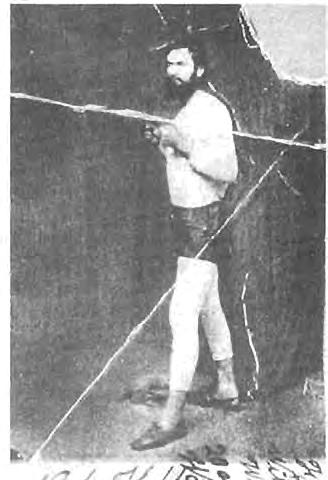
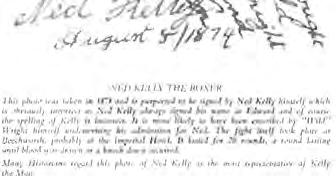
caramel and a flourless chocolate cake, and Australian cheese of course.
Prices range from $4.90 to $8.90 for entrees, $10.90 to $17.90 for main courses and $5.90 to $8.00 for deserts.

The wine I ist was good. As well as Kelly's labelled win e ranging from $10 .90 for riesling to 11.90 for cabernet sauvignon , lh e range runs hrough an exten s ive AustraUan and overseas election up to a 1980 Grange He rmitage for 120. Our part y st ayed insi.de the range and conum e some very r espectable Cha t eau Tabbilk hira z for $14.00 with a dash of Peter Lehm ann Cab Sav for $18 00.






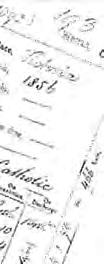










Kelly's deserves to succeed. Don't expect haute cuisine. Don't put it down as a bit of Aussie gimmickry. It's a good place for solid Australian hotel food. Tourists should go there Floyd should have gone there.
As we chatted after lunch I glanced up at the specials menu, strange, I thought that there should be samosas among the entrees, then the chef emerged from the kitchen - he is Indian. Ah well, that's Australia!!!
Kelly's. 390 Lonsdale Street. Melbourne. Tel: 6705550. Open lunch and dinner 5 days a week. Lunch only Monday. Closed Sunday.
Paul Elliott

IT IS 11.45 A.M. AT A SUBURBAN MAGIStrates' Court. Two members of Counsel are sitting in the foyer outs ide Court No .3 They are sipping "coffee" (Harris Vintage 1988) from plastic cups dispensed by a ve nding machine. They are both waiting to get their pleas on. They have spent much of the morning sitting in Court watching the passing parade.
Derek: "Have you been given any indication as to when you might get on?"
Dianna: "No , not really. The Bench Clerk seemed to think I might get on before lunch, but she wasn't prepared to commit herself."
Derek: " } think we ' lJ be lucky if either of us get on before l unch. They haven ' t started any of the pleas where the d efendants are represented by barr is ter s yet. '
Dianna: "Yeah . They've done the licence restorations, a few ex parte prosecutions, a plea by a local solicitor and a few defendants in person so far. It's boring."
Derek: "It is certainly frustrating sitting waiting to get on not knowing when you're going to get on and hearing the interminable "standard form" pleas."
Dianna: " You mean the one that starts off - my client is aged 18 years of age and ?"
Derek: "That's the one'"
Dianna: "Yes, that's why I decided to have a cup of coffee when they put the duty solicitor on."
Derek: "Yes, there was a certain sameness about her three pleas wasn't there?"
Dianna: "Yep."
Derek: "It looks like there's going to be a lot more of those pleas by duty solicitors."
Dianna: "What do you meanT'
Derek: "Well I've read somewhere that all Legal Aid pleas at Melbourne and Prahran are to be done by Legal Aid duty solicitors."
Dianna: "Why would they want to do that?"
Derek: "I believe it is to save money."
Dianna: "I would have thought that it is also designed to ensure strict equality, that is everyone gets the same standard of appearance."
Derek: "Isn't that being a little bit cynical?"
Dianna: "Not in the least. I am convinced that there is a philosophy that is all too pervasive in our so ciety that pJaces mediocrity on a pedestal. Take, for in stance , our education system."
Derek: " J'm more in c lined t o b e lieve that there are some who think we earn too much for doing
too little. They're the ones who forget about our overheads, the fact that if we ' re not reached we don't get paid and so on."
Dianna: "That seemed to be the attitude pervading the article about Legal Aid duty solicitors in "The Sunday Age" a few weeks ago . It seemed to suggest that the duty solicitor's typical day started at 9.30 a.m. and finished somewhere around 5.30 p.m. It also suggested that a typical day would include conferring with three or four clients , doing a couple of pleas and a bail application It went on to suggest that such a day was extremely stressful and requiring of a degree of patience and stamina beyond that of the average private practitioner."
Derek: "I wouldn't mind being able to start at 9.30, finish at 5.30 each day and do a handful of pleas and bail applications."
Dianna: "The article suggested that life was harder for the duty lawyer because they only had 20 minutes to confer with their client and prepare the plea whereas we get weeks or perhaps a number of days to do so. "
Derek: "If I remember the article suggested that on a particularly difficult day they may have to do 7 or 8 pleas."
Dianna: "I suppose it doesn't matter if mediocrity is your aim and you don't worry about a sausage machine process."
Derek: "Yeah, I can just imagine a manual providing advice to duty lawyers as to the pleas they should mount on behalf of their clients."
Dianna: "Yes. My client is aged (blank) years "
Derek: "and is unemployed. He is married "
Dianna: " and supports three children. He and his family live in a Housing Commission Flat and "
Derek: "he didn't really mean to do it."
Dianna: "I ask Your Worship to take into account the fact that he has pleaded guilty "
Derek: "co-operated with the police and made full admissions .... "
Dianna: " and I am sure will not re-offend in the future."
Derek: "I therefore ask Your Worship not to exceed Your Worship's normal penalties for this sort of offence."
Dianna: "If Your Worship pleases." The manual would then say - 'Turn around, tell your


client to stand up and start reading the next file'. "
Derek: "Don't you just love pleas that end up with the comment - 'While I know what Your Worship's attitude is to these sorts of matters and I take it no further'."
Dianna: "Yes, familiarity tends to breed contempt or is it just a shrug of the shoulders."
Derek: "I think there is a lot to be said for the pleas done by the Salvation Army officers. They certainly put a lot of heart and thought into their pleas. "
Dianna: "Yes, the form ula pleas certainly tend to make the older suburban solicitors' avuncular style of plea stand out, doesn't it?"
Derek's matter is then called into Court and after he indicates to the Bench that his client intends to plead guilty, hears out the police summary and discovers much to his great surprise that no prior offences are alleged, commences his plea:
Derek: "If Your Worship pleases my client is aged 18 years of age, is unemployed and has no prior offences. I ask Your Worship to take into account his plea of guilty, the absence of prior offences, his co-operation with the police, and ask Your Worship not to exceed the minimum period of disqualification. My client earns $254 per fortnight unemployment benefit and out of that he pays $ 7 5 per week rent and expends the remainder on normal living expenses. If Your Worship pleases."
All of the above plea is delivered in a monotone and with an air of considerable resignation.
Approximately 15 minutes later, Dianna's client's matter is called on. Her client is also charged with a drink driving offence, pleads guilty and has no prior offences. Her plea is as follows:
Dianna: "If Your Worship pleases my client is a 19 year old apprentice hairdresser earning $254 per week before tax. She lives at home but pays her parents $ 7 5 per week board. She has pleaded guilty, co-operated with the police and has no prior convictions. I request Your Worship not to exceed the minimum period of disqualification. If Your Worship pleases."
She sits down.
It is now 1.00 p.m. and Dianna and Derek repair to a local delicatessen for a bite of lunch and some "real" coffee. They pat each other on the back for their eloquent pleas and their good results.
A little later, satiated by both food and caffeine, they return to the city with the warm glow of a job well done.
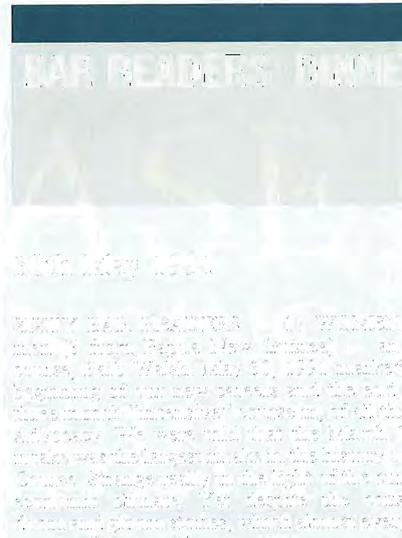

WOMEN, 43 and of marked the of a things, 1991 of the current constant every Instructor-Lecturer felt compelled to recount to us,



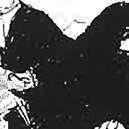



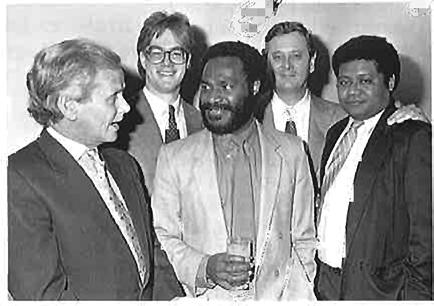
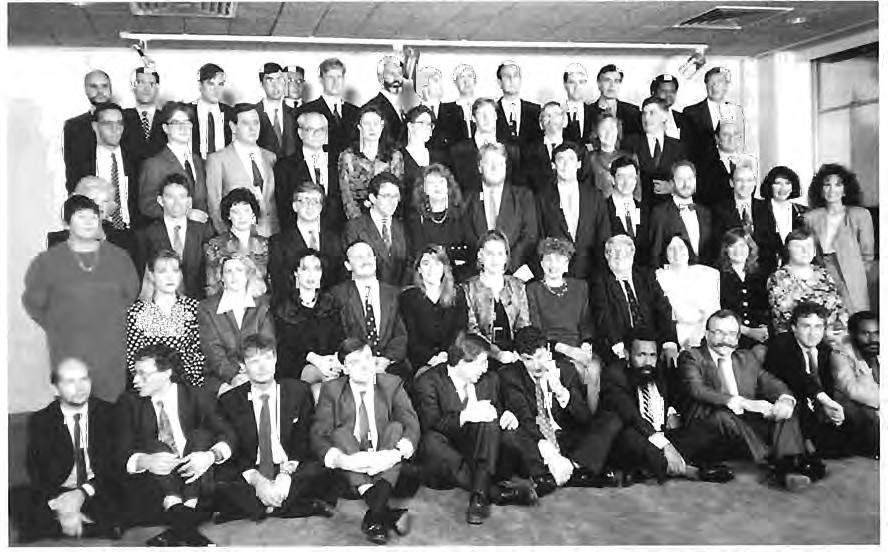





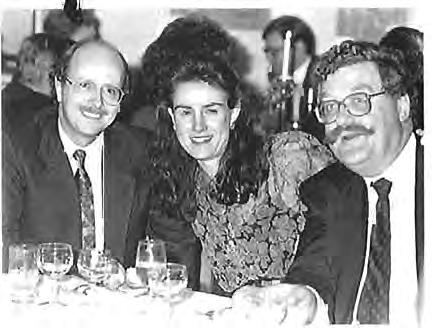
there was clearly an air of excitement at the prospect of embarking on not only a new career, but a whole new way of life. Along with that feeling however came also the feelings of anxiety, concern, general nausea, and for many, of course, the firs_t real glimpse of "poverty".
After three months of "training" in Advocacy, and the ways of the Bar in general, most of us felt that we had gained something of real value from the Course. Whilst we all had to give up a lot of our "after hours" time to engage ourselves in such things as moot courts, video exercises and week-end Advocacy and Plea-Making workshops, our social lives did not suffer greatly! Sixty people thrown together for three months, day in, day out, effectively living in each other's pockets, will undoubtably result in the formation of acquaintances, friendships and life-long associations.
Of course, such things as the week-end away to Mansfield and long lunches of large groups of Readers assisted greatly in keeping the feelings of frustration, anxiety and general neurosis at bay. Toward the end ofthe Course emotions ran high. The thought of not having Barb Walsh organise our lives caused, in many of us, some panic.
Yet despite our paranoia, we were unleashed on a now not so unsuspecting group of Judges, Barristers, Masters, Co-ordinators and lecturers at the Bar Readers' Dinner. This auspicious occasion took place, as it does every year, at the



Essoign Club. The the standard of which
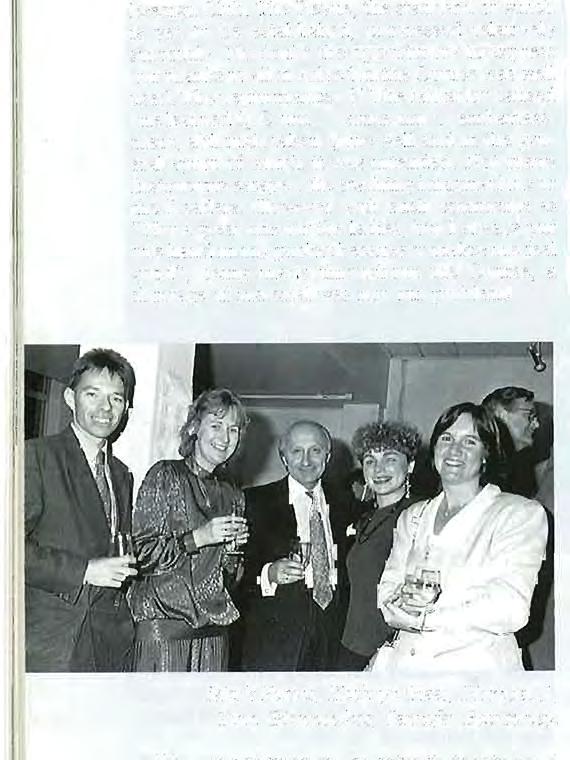



LAST YEAR, THE NSW BAR ASSOCIATION informed Paul Finch that this "visiting card" was "in breach of rule 74A and that you should cease using it forthwith".
Finch also was asked "whether you consent to be reprimanded for this breach".
This Bar Association rule states that: "A barrister may use a visiting card which bears his [sic] name, professional address and telephone number and the wqrd 'barrister' or the initials 'Q.c.' as appropriate "
Finch replied that he was not a member of the Bar Association; that he thus was not bound by its rules; and that he did not consent to being reprimanded.
The Bar Association countered by challenging the truth of the affiliations claimed by Finch's card and referring the matter to the Legal Profession Disciplinary Tribunal as a prima facie case of professional misconduct.



We were not given an opportunity to retire and very stakes prefers reLeonda, and only wore our official which the thing" many become a hope). who of the Barristhose Masters especially, Randazzo


While Finch denies the Bar Association's charges offalse advertising and is challenging its authority in the Supreme Court, this matter only muddles the fundamental economic issue.
This is the Bar Association's assumption that breaches of its restrictive work and trade practices are grounds for professional misconduct under the NSW Legal Profession Act and thus for being struck off as a barrister.
The Bar Association's Professional Conduct Committee report into Finch suggests that, whether true or not, the card's references to membership of the New York Bar constitutes "impermissible advertising".
Under the Bar Association's rules, barristers are not permitted to solicit work or to advertise - even to state their university degrees on their stationery letterhead.
Then there are the PCC comments on Finch's wish "to practice [sic] concurrently as a New York or Californian Attorney and as a NSW barrister" in order to make his living as a specialist advocate on international commercial disputes.
But, suggested the PCC, the "right does not
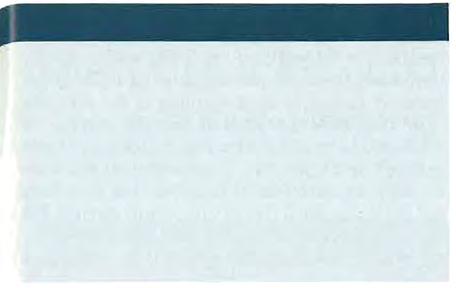
exist" to "practise [sic] otherwise than as a barrister concurrently with practice in NSW as a barrister". The suggestion appears to be that a NSW barrister cannot also be an "attorney" in the US, where the demarcation between barristers and solicitors is "fused".
And, ruled the PCC, even Finch's "abusive" remarks to the Bar Association may constitute unsatisfactory professional conduct.
Yet the professional misconduct and unsatisfactory professional conduct parts of the Legal ProfessIOn Act do not mention restrictions on international practice, advertising bans or kneescraping deference to the Bar Association.
Anomey and BarrIster
6 Crown street WooUoomookJo
Sydney. NSW 2011 AUSTRAliA
Teteptlone: SVD 3586697
FacsJmile: SVD 357 7458
DX: SYD.273
MtHrlbfN of lbr: New YOtI<. CoMomb. "'WI. Vic.• ACT Mamb.,. of Society Accounronll
Instead, they refer to competence and diligence, good character and conduct which the public is entitled to expect from a barrister.
Portrayal of the issue by the Law Council president, Alex Chernov, as one of qualifications - that you wouldn't want an unqualified plumber to fix your pipes - misses the point.
Of the trade and professions, only lawyers possess the statutory "producer control" repby the NSW Bar Association's power to Issue practising certificates for barristers and to nominate its own representatives to the disciplinary tribunal.
As Gary Sturgess, now head of the NSW CabiOffice, has noted: "The law gives the regulatIOn of the legal profession substantially into the hands of the suppliers, and if the judiciary is
included in the profession (and it does not seem unreasonable to do so), then control is almost completely theirs."
The Bar Association claims to promote selthe interest. In reality, its restnctlve practtces protect the colonial transplant of one of the few medieval guilds of English artisans (along with surgeons) to survive the industrial revolution, mass production and technological change.
The Bar Association retains the guild philosophy of institutionalising and glorifying the "art" (from artisan) of advocacy.
This is cloaked in the "independence" of the Bar, which really means the power to discipline barristers who do not abide by its restrictive work practices, and to remain free of outside insuch as from consumer sovereignty.
Aided by the courts, the Bar has stifled the right of "independent" barristers to advertise on the grounds that it would be unethical and degrading. While snobbishly claiming to be above the market, the Bar works feverishly to control the market for its services.
There is a mandatory apprenticeship - pupillage - where the art is passed down from "master" barristers and where Bar membership and indoctrination courses into the guild's "ethics" and noblesse-of-the-robe traditions (such as "appropriate" fee setting) are compulsory.
Ad vertising other skills, such as engineering or accountancy, amounts to "unfair" competition within the guild which would undermine the primacy of advocacy.
And there are restrictive practices designed to channel the bulk of barristers' work to high cost chambers in and around Sydney's Phillip Street. The bans on entrepreneurial "touting" make new barristers captive to these guild temples, where they have to prove their allegiance to guild elders to get briefs.
The false advertising of the "Queen's Counsel" title and promotion to the jUdiciary are reserved for those who buy into the temples and supportive barrister-politicians.
A barrister who advertises that he works from his less expensive Woolloomooloo residenceand perhaps even charges less - threatens this old boys' closed shop.
Nick Greiner now says he will force microeconomic reform on the NSW legal profession if re-elected and that he is "not scared of a fight".
The barristers will fight to preserve the market value of guild's temples - such as the $270 000 required to buy into Selbourne or Wentw'orth chambers - which adds to the legal profession's vested interest in maintaining its monopoly.
Michael Stutchbury

whilst I tell you further of the saga of the VicBees. Yes! Yes! I am sure that you would like me to tell you about the progress of the building of their new hive. I am unable to do so as nothing has happened for a long long time. VicBees are more worried about other matters. It appears that their supply of flowers has steadily decreased and competition for such flowers as there are has increased accordingly. Those VicBees that have established control over a particular type of flower or a particular area of flowers, guard their domain vigorously. Those VicBees that wish to gather pollen from a different type of flower or from a different field of flowers are finding it very hard going indeed. Each day as one stands outside their hives one can see a steady stream of VicBees going out gathering pollen - each day they look more depressed, their heads are down, their antennae drooped and their wings fluttering more and more slowly.
Underneath the older of the two hives that are joined together are two big stores of honey. The keepers of these stores - called BankerBeesused to allow VicBees to borrow small amounts of honey from time to time to enable them to survive during times when flowers were less plentiful. The keepers of these stores have now
become far less generous. It appears that because they gave away vast amount of honey to BusinessBees who refused to return the honey borrowed, they are now making life difficult for VicBees. In fact, at the beginning of the year, the chief BankerBees predicted that the number of VicBees at the end of the year would have been reduced by 25 per cent. It appears that the BankerBees are determined to make that prophecy self fulfilling. Each day as one stands outside the honey stores one can see a slow and greatly depressed stream of very hungry VicBees trudging away.
When the VicBees have time to turn their mind from matters of honey supply and honey stocks they do give consideration to matters of ClerkerBees. It appears that there is some indecision amongst VicBees as to whether there should be more ClerkerBees, what type of ClerkerBees there should be and whether ClerkerBees should look after only VicBees who have similar interests. There have been additional ClerkerBees allowed to establish their own niches within the main hive.
VicBees have also given more thought to whether the older, wiser, bigger and silkier looking YicBees should always have the assistance of a younger , more vigorous , more ambitious, VicBee. It appears that most VicBees believe that there should always be an assistant VicBee with the larger silker VicBees but that there may be circumstances when the older, larger, wiser and silkier VicBees are allowed to go foraging for pollen alone .
I think my dears that the time is late and I shall tell you more about the tale of the VicBees on another night.
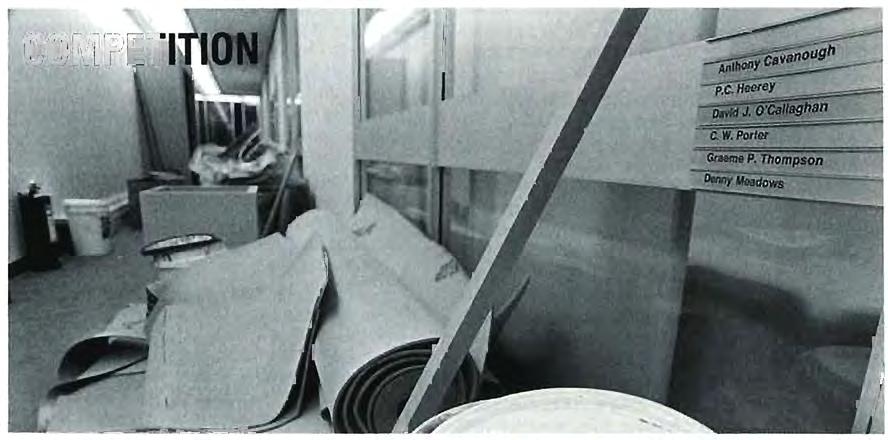

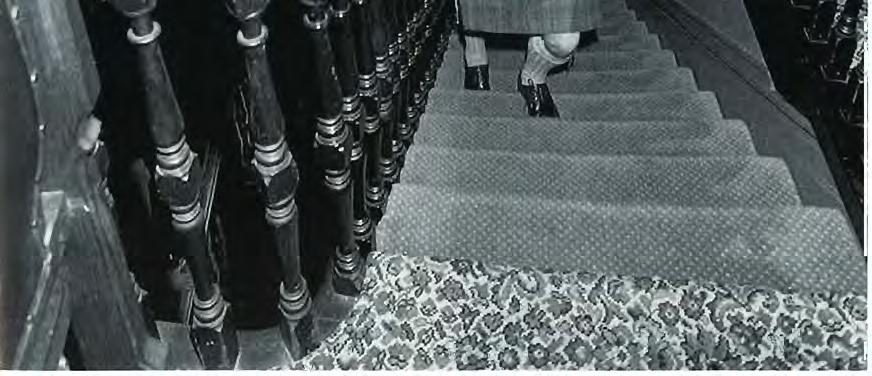
Ian Duffy piping diners to their tables .
NOT SO LONG AGO, ON A COLD WINTRY night, 55 Association members and 16 guestscomprising a majority of Victorian based Family Court judges , the full complement of judicial registrars and a representative sample of the
magistracy - attended the Savage Club induced by representations of fine food, good wines and excellent entertainment.
The evening started well enough in a large downstairs room bracketed by two enormous
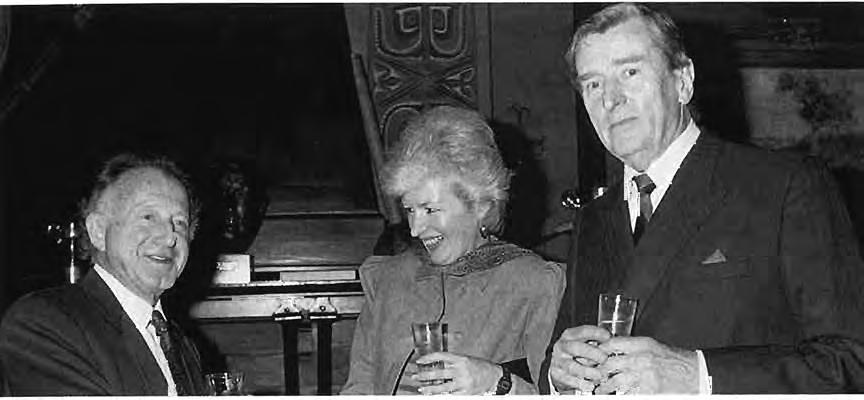
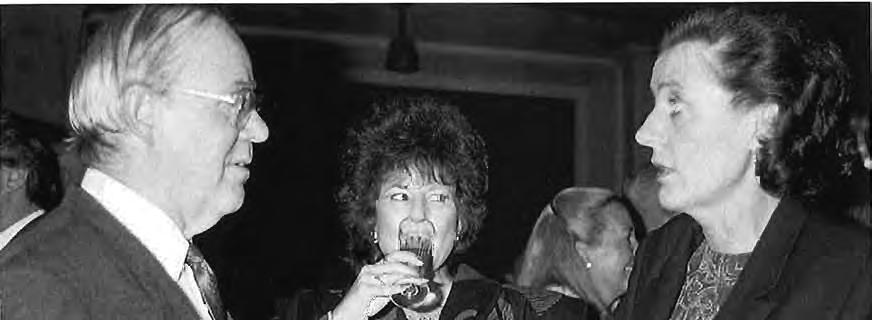
open fires boasting blazing mallee roots. The buzz of anticipation almost drowned out the latest in juicy gossip (the food and drink of all Bar functions!) but could not prevent the growing, growling howl of the bagpipes of Ian Duffy (Grant tartan over the whitest and sexiest knees in the establishment) calling the faithful to dinner.
In a scene that could only be reminiscent of the Pied Piper of Hamelin the members and their guests were led up to dinner past the spears, shrunken heads, totem poles and other artefacts proudly on display.
After an elegant sufficiency of food and a surfeit of fine wine the gathering was left in little doubt by the guest speaker - Simon O'Donnell, "Australian Cricketer of the Year" - of the terrifying nature of facing Malcolm Marshall and
Joel Garner in full flight fired up by a little injudicious "sledging" by a young cricketer who knew better a little too late.
Having introduced the guest, Association President Paul Guest (no pun intended) ceded the floor to Bill Pinner for the presentation and a ringing endorsement of one or more Family Court judges. The fine wine continued to flow until the diners were led back downstairs by the tireless Ian Duffy for coffee, tokay and cheese.
'And fresh from the Tivoli Cafe, full-time Association Member and part-time "stand-up" comic, Rohan Hoult, delivered a hilarious and quite memorable performance. However, the entertainment kept coming - Mushin J. and Kingsley Davis tinkling the ivories in quite expert manner as well as other acts which prudence demands remain unreported and indeed unre-
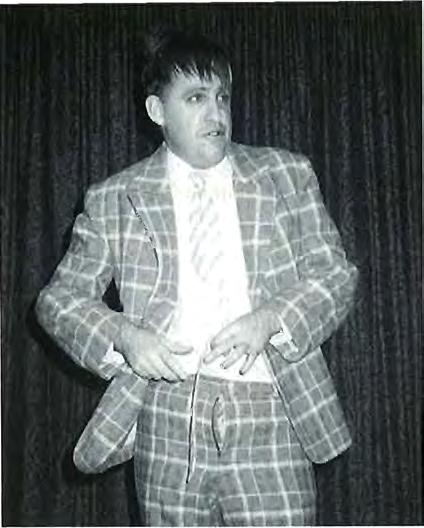
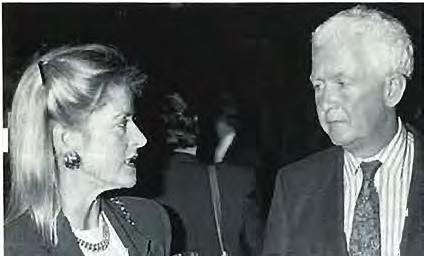

marked upon Midnight came and went unnoticed except for the long line of Commonwealth cars queued up to convey the bulk of guests safely home. At 1 o ' clock th e di e hard s still re mainin g we re dr iv en into th e cold fro sty morn by the unre len ting and unre m i tt i ng bagpip es. At th at st a ge thi s re porter d e cided d iscr et ion wa s th e better part of va lour an d chose to re trea t ho m ew a rd s whil st a sizeable portion of Association members remained still deciding where to go on to next.
Even when the warm glow of good food , wine and companionship had evaporated the near unanimous view of those who had attended must have been that it had been a night extremely well spent! Congratulations to the Committee of the Association and most especially Elizabeth Davis and Bill Pinner.

Author: Barbara Hocking (Editor)
Publisher: The Law Book Company Limited, 1988
This book comprises a compendium of papers and commentator contributions given at a conference held by the Aboriginal Treaty Committee at the Australian National University in 1983
In 1988, as the then Minister for Aboriginal Affairs Gerry Hand points out in his pithy foreword, the discussion which must lead eventually to a treaty between the Koorie race and the Caucasian invaders commenced. The Prime Minister agreed that the Australian government was committed to work for a negotiated treaty with a hope for early settlement.
These papers then provide a useful historical perspective to that on-going process. They, and their contributors personally, have undoubtedly played a good part in bringing that settlement about. They are also useful for their summary of the arguments that make the treaty such a 'ca fait sans dire ' proposition. If you have time for nothing more, take the time to appreciate the beautifully written and tightly argued piece by Frank Brennan S.J. entitled: " Aboriginal Aspirations to Land - unfinished history and an ongoing national responsibility". A brief paragraph will suffice for the afficionados of Denningesque legal writing:
"On 26 January 1788 , an English sea captain Phillip came ashore with his party at Sydney Cove where he hoisted a flag, uttered a formula of words and set about running a penal institution At that very moment , unbeknown t o a ll concerned . Abo ri gi nes as far a way as Arneim La nd beca m e subj ec ts o f K i ng G eorge Il l. As ink s p rea d s on blo tt ing pa per , so Briti s h sove re ignt y s pread int o t he h in te rl a nd s . Su bse qu en t settl e me nt s at other geographic points served to consolidate British sovereignty over the whole continent. This sovereignty
ensured that others, like the French, were kept out, and entailed the British Crown gaining unencumbered title to the whole of the Australian mainland and Tasmania. In 1889 the Privy Council sanctioned all that had occurred, categorising the infant colony of New South Wales as a 'colony which consisted of a tract of territory practically unoccupied, without settled inhabitants or settled law, at the time when it was peacefully annexed to the British dominion'.
This legal fiction became firmly embedded in our history. Though a fiction, it has taken on a reality of its own that cannot be undone.
But it continues to work an injustice upon the Aboriginal citizens of this nation and some of that injustice can be undone."
How long will it take for the proper and reasonable reforms proposed in this series oflectures to come to fruition? Only time and the political will will tell as the power of the arguments are incontrovertible.
Eugene O'Sullivan
Authors: Regina Graycar and Jenny Morgan
Publisher: The Federation Press, 1990
To be fair in one's review of a book like this, a reviewer must up-front declare all their potential biases which may impinge on a sex-free, or is that asexual, criticism.
So I am a male caucasian aged thirty-something who developed his political consciousness in the heady days of the early '70s in repressive, reactionary Queensland, and then relaxed into the me-generation sentiments needed to complete a law degree as a meal ticket in the competition maintained by the new generation of lawyer.
The feminist revolution agenda has had an impact on me and my attitudes over the decades. I unequivocally declare that I feel 'ad idem' with the developed agenda for the '90s as expounded in Part 5 'An Agenda for Gender?' As a nonrepressed male, I do not feel threatened by such radical proposals as expanding gender-neutral legislation and legal language in all its forms; or developing alternatives to the male-style aggressive adversary system by allowing for more recognition of the more co-operative approach of the female voice; or even for greater affirmative action to promote talented wimmin (sic) to positions of institutional power within the existing system. It does though suprise me that the hoary old chestnut promoted by Carol Smart that "law should be 'decentred'" is still given any degree of credence in what is otherwise a tightly argued critique. My view is easy: it's the old white-ant revolutionary theory - if you're not in the
system, you can't change it for the better and you may as well retire back to Nimbin and save your life's endless dissonance resolution as you struggle on the fringes while the juggernaut rolls on.
With that declaration of interest made, I feel somehow purged of prejudice. And yet. Everyone can benefit from taking a new look at old problems from a different perspective. It is an inherently useful process: for radicals and conservatives and reactionaries (if they are a valid sub-class) alike. That is basically what this book purports to do, nay, achieves in doing. And it does it softly. It is not comprehensive, has doctrinal limitations, is unashameably polemical and seeks only to provide "possibilities in exploring new ways to construct legal doctrines and categories". Exposing the hidden gender of the law is an essential starting point for the development of a new legal framework in which law can better respond to women's lives.
I liked it. I also liked Justice Elizabeth Evatt's foreword.
Eugene O'Sullivan Reformed Feminist
With funding from the Victoria Law Foundation, the Victorian Court Information and Welfare Network Inc. ("Court Network" for short) has published an excellent 35 page booklet for children appearing in criminal courts, entitled Your Day in Court. Attractively illustrated by Carol Pelham-Thorman and written by Judy Willford, the booklet would also be a valuable aid to vulnerable victims and witnesses with intellectual disabilities, who are "catapulted into the rigours of the criminal justice system." Copies of the booklet are given to such witnesses who attend pre-court counselling at Court Network.
The illustrations include nine children from different ethnic backgrounds, and show the layouts of the Magistrates' and County or Supreme Courts. A panel of five professionals contributed to the sensitively framed question and answer format with clear, simple definitions for names of courts, people appearing in courts and the work of Victorian courts. For example, a subpoena is illustrated by a drawing of a letter and there is a double spread colouring section for identifying court personnel, with a spare page for questions or notes to assist the witness.
Carmel Benjamin and her team of trained, professionally supervised Court Network counsellors are to be congratulated on this timely publication which is available from Court
Network at 241 William Street Melbourne. The cost of Your Day in Court ($8 plus $2 postage) subsidizes the free copies given to children and victims who are counselled and helped by Court Network to alleviate the trauma of a criminal court appearance.
Author: Russell V. Miller
Law Book Company Limited, 1991 pp. 1-520 Price $39
As the Trade Practices Act bears on nearly all areas of civil practice, this book is a very useful one. It provides a concise commentary on many of the key provisions with reference to most of the important decisions and it is published in simple soft-back form (i.e., it fits in your brief case and does not require hours spent on filing updates ever month or so)
The 12th edition includes references to a number of important decisions which have occurred since publication of the previous edition in 1990 (e.g., Pont Data Australia Pty Ltd v. ASX Operations Pty Ltd on section 46, Concrete Constructions (N.s. w,J Pty Ltd v. Nelson on the meaning of "in trade or commerce" and Trade Practices Commission v. Amotts Ltd on mergers).
The new edition also incorporates the TransTasman Market Power Amendments to the Act which extend the operation of section 46.
I recommend it to all practitioners.
Adrian Ryan
Domestic & Corporate Office Design Hospitality & Accommodation Complexes
Extensive network of contacts with Architects, Builders & Associated Trades 12/55 Bendigo Street, Richmond 3121 Phone: 429 8136 Fax: 428 0380
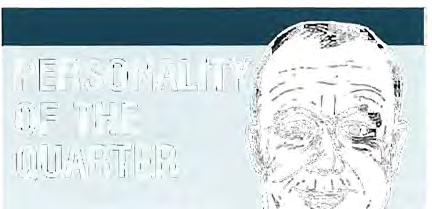












Name: Frederick George Albion Beaumont Q.C.
Family Status: Wife Jayne, three children
Education: Swinburne Technical School and University of Melbourne
Signed Bar Roll: 8 May 1969
Read with: Ken Jenkinson (now Jenkinson J.)
Appointed Silk: 1985
Practice: Commercial and Tax Matters
Readers: "Jungle" Jim Bessel and Tony Nolan
Favourite Drinks: French Champagne and Red Wine
Favourite Restaurants: Amaretto's, La Chaumiere and Fitzsimmons
Likes: International travel, long lunches and cross-examination
Dislikes: Deputy Commissioner of Taxation, Kevin Sheedy, John Cain and Socialists
It is a myth that Barristers are born into well to do families, carefully nurtured in private schools and blossom in a working environment associated to "the old school tie" Beaumont is proof that Barristers can and do come from any social or economic background.
Born in Hawthorn (then a working class suburb) and educated at Auburn State School and Swinburne Technical School Beaumont's
chances of a tertiary education were minimal. This assessment did not take into account Beaumont's trademark - tenacity. He remains one of the few, if not the only, members of the Bar to complete a law degree without matriculation.
In the early years at the Bar he developed a circuit practice at Hamilton which refined his love and respect for Australian red wines. He has also lectured in Accounting at R.M.LT.
To supplement his income he also umpired football. A trait of umpiring was his unwillingness to report players as appearances at the tribunal were not remunerated. A complaint of "Did you see that ump?" was met with the response "Yes and I saw what you did 5 minutes earlier. Do you want me to report both of you?"
Stunned silence was the response.
Beaumont is one of the few Barristers at the Bar with an international and interstate practice. He regularly appears in the Northern Territory and in Papua New Guinea. To prove the "taxi cab principle" he appears for the Income Tax Office in Papua New Guinea. In fact it is rumoured he wrote the Tax Act in Papua New Guinea. He has claimed in one case that the intention of the draftsman was clear and then explained why he drafted the section in a particular way!
Akin to his international practice is his unparallelled expertise as a travel agent. Every international airline timetable is immediately at hand in chambers. If you are stuck for a flight between Berne and Helsinki Beaumont will arrange-
(i) a taxi to the airport;
(ii) your economy class ticket to be upgraded to first or business class at no cost;
(iii) the re-organisation of the airline timetables to enable your flight to be a direct flight;
(iv) to re-stock the airline liquor cabinet to ensure that only the best French champagne is served.
Beaumont's favourite pastime at the Bar is the cross-examination of accountants. He likes nothing more than to dissect a balance sheet prepared by an accountant and to lecture the accountant as to its inaccuracies contained therein. Many "experts" are heard to answer questions "Only if you say so Mr. Beaumont".
Win, lose or draw Beaumont is a favourite with clients. His dogged never say die approach ensures that the clients believe that they and their mouthpiece have given the case the best shot.
His opponents either love or hate him. To those who respect him he is "fearless Freddy" or "a pit Bull Terrier". His foes simply refer to him as ... Beaumont (expletive deleted).
Love him or hate him he is certainly a worthy personality of the quarter.
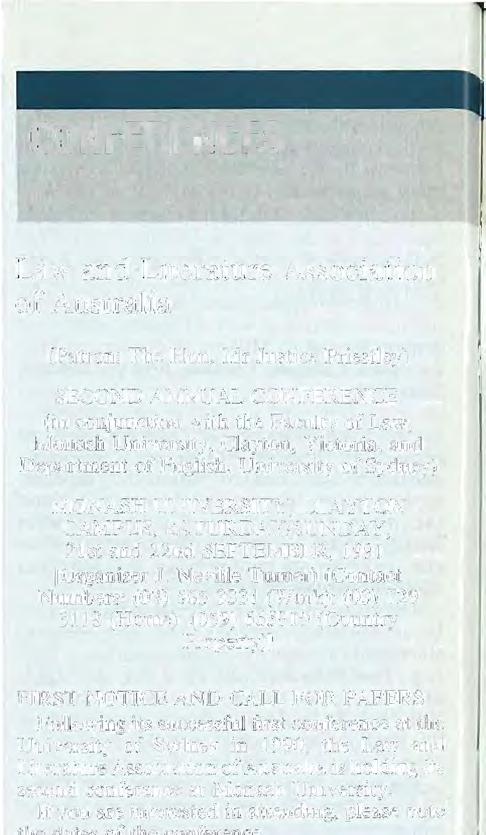
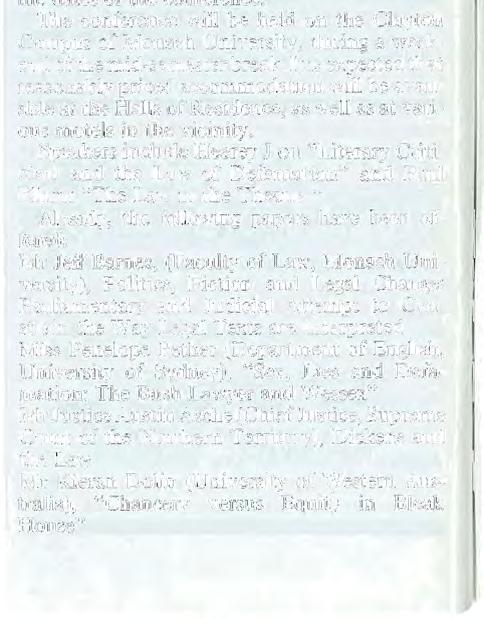
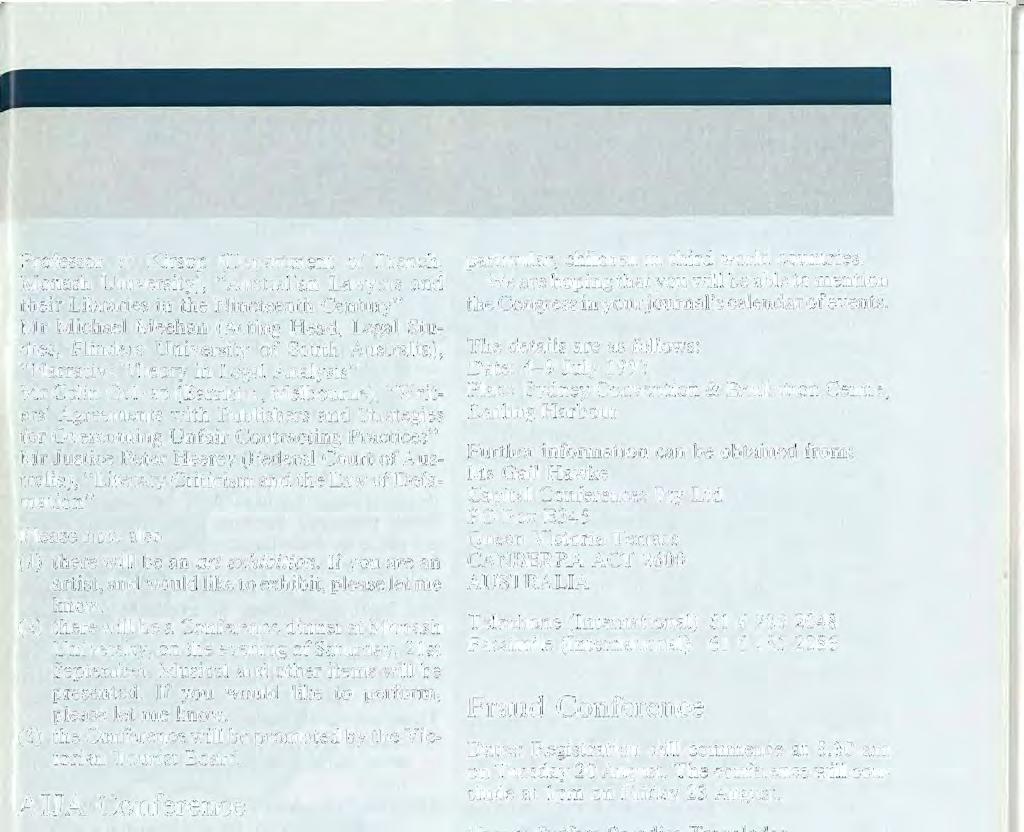
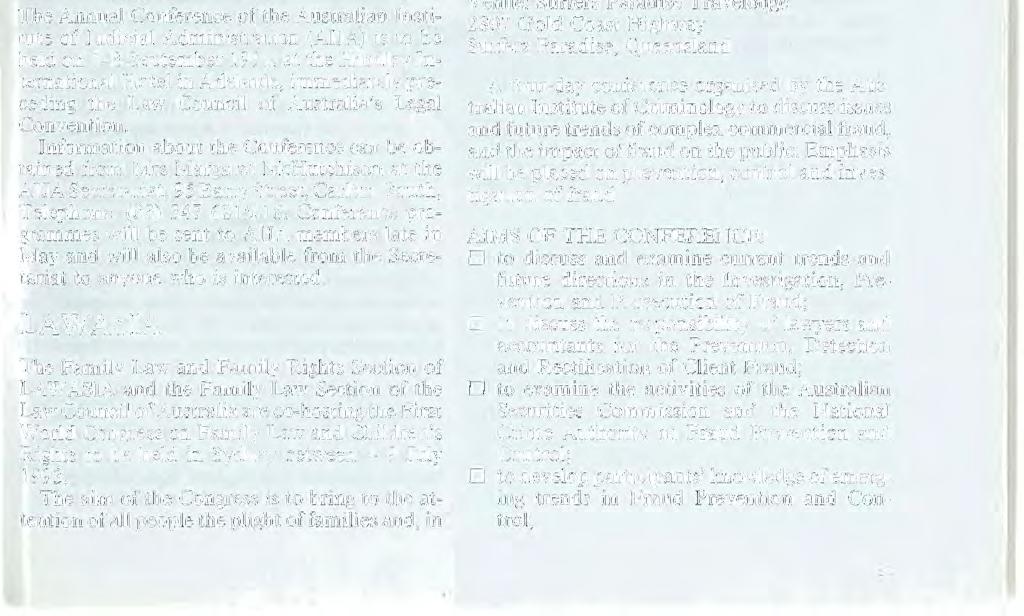
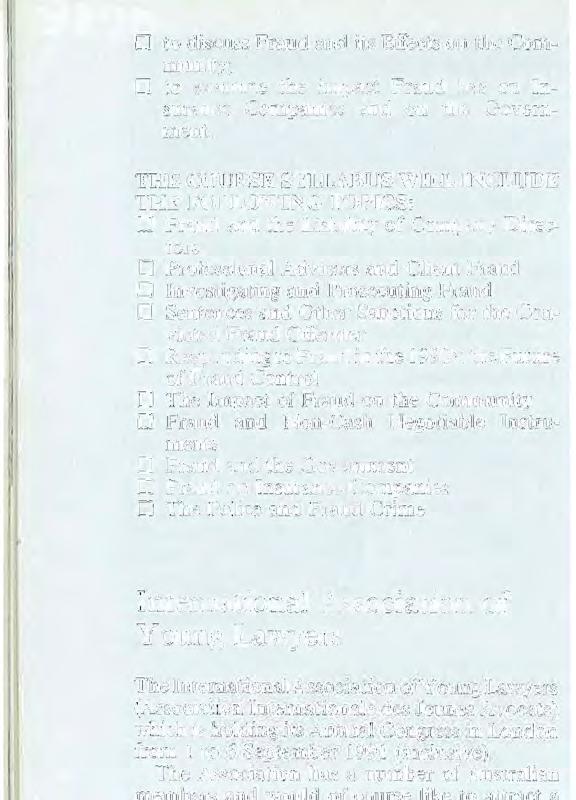

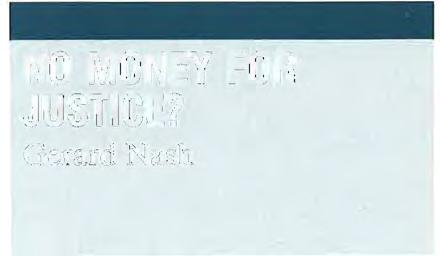
ALL MEMBERS OF THE BAR REMEMBER - or remember others reminiscing about - the fact that criminal trials used to be much shorter. Whether or not that is in fact the case , it is clearly the general impression.
It has been suggested that criminal trials are now longer because scientific and related evidence is more sophisticated, because cases are better prepared, because unmeritorious points are taken by defendants who are not themselves footing the bill for their costs of the trial.
Whatever be the reason, recent suggestions that legal aid will not be available for "super trials" , and the clear inability oflegal aid under its present policy guidelines to meet from the funds available to it the costs of criminal trials in Victoria , raises some fundamental questions. Those questions include:
(a) Should the State always meet the legal costs of a person committed for trial in Victoria?
(b) If the State does not foot the bill for all such persons , how does one discriminate between different accused all presumed to be innocent until found otherwise?
(c) If Legal Aid does meet the expenses of an accused , what rights (if any) should that fact give to the Legal Aid Commission in determining the manner in which the trial shall be conducted?
(d) If the money for Legal Aid is insufficient to meet all demands upon it, do the interests of justice in a democratic society require that it first be expended upon meeting the costs of those charged with criminal offences?
The above questions are posed without providing any purported answer. They are questions to which all members of the Bar, the Legal Aid Commission and the profession as a whole need to give serious consideration.
It is important that no economist, no treasurer , and no government should be permitted to say: "The price of criminal justice is too high. Economic considerations require that restrictions be placed on the right of an accused person to have legal representation at his or her trial"
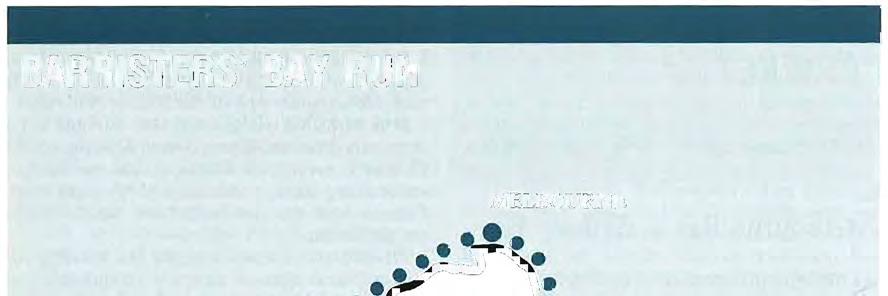




















The Victorian Bar has entered a team to compete in the 200K run around the bay . Those of you with elephantine memories will recollect that as p art of the bi-centennial celebration in 1988, a arristers team covered itself in glory by finishn g 16th out of 100 in an inaugural run around the bay
The 200ks were covered in a fraction over 13 hours and the barristers beat such illustrious teams as the Victoria Police, Melbourne City Council, The Age (our nemesis) Jolly 's Jogger (remember him) and Minter Ell ison. It is the aim this time to break the 13 hour barrier.
The fund raising is for DOXA and the Olympic Dream. All donations are tax deductible and as the entry fee is $6500 it would be pleasing to again receive support from the whole Bar. Any potential runners should forward their C.V.s to either Tsalanidis (Clerk A, 8931) or Danos (Clerk S, 7692). Cheques made out to DOXA may be left with the same personnel. A receipt for tax purposes will be provided. The amount of the cheque will not influence either of the above to refrain from forwarding names to the selectors however
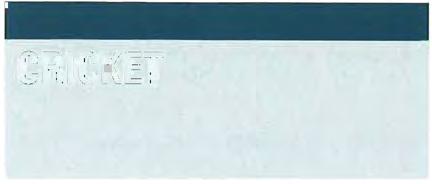
APPREHENSION AND A DISTINCT AIR OF gloom pervaded the Victorian Bar XI as it ventured north to Sydney for the annual battle tc retain "The Sub Standard Trophy" against the gentlemen of the New South Wales Bar. This was the first year that the Victorians would do battle without their esteemed leader and touring legend, Gillard , who was one of the key instigators of the match since its inception in 1983.
Under Gillard, the Victorian Bar XI had a formidable record against New South Wales winning 5 of the 7 matches so far contested. There were those amongst the ranks of the Victorian team that felt that Gillard was long past his best, whatever that might be, as both a cricketer and a leader. Although to hear Gillard on the subject would convince the uninitiated otherwise.
Most of the team had travelled to Sydney on the Saturday, where as guests of the New South Wales team, we were regally entertained at Dimitris 5 Door Restaurant. Desperately keen to win, the New South Wales Bar had employed one of their number, Evans, to provide some companionship for the visitors to ensure that none of them would get any useful hours of sleep before the match. But Evans and friends retired hurt in the early hours of the morning without having
dented the stamina of the Victorians. As for Dimitris 5 Door Restaurant, the atmosphere was light and breezy, the wine delicious and abundant according to Ritter but the" John Dory" left many looking for one of the 5 doors for relief.
It is with this background that Connor led a relatively green and untried team onto the Acron Oval at St. Ives on the Sunday. Little was done to restore the waning confidence of the team when Connor lost the toss and New South Wales elected to bat.
Donald and Connor opened the bowling for Victoria and spurred on by a remarkable left handed caught and bowled by Connor, New South Wales were soon reeling at 31 for 3 after 16 overs. Donald and Connor had returned the excellent figures of 2 for 13 and 1 for 11 respectively and New South Wales seemed to be in some trouble.
Chancellor replaced Donald and under instructions from his wife bowled spinners for fear that he may further injure his back. He performed gently, perhaps more concerned about his missing luggage than the team's performance , and he returned the figures of 3 for 28.
At the other end Glover was given the ball and attacked the New South Wales batsmen with the enthusiasm of a rodeo rider on a bucking horse, which was to be his next sporting fixture later that week. Glover's I for 30 was a valuable contribution.
Gilles (Bill) convinced the skipper it was time for him to bowl, perhaps with the intention of impressing his young nephews who were in attendance that he could play cricket. Whatever Gilles' nephews thought mattered little compared to the pleasure enjoyed by the New South Wales batsmen. Nor did Middleton's efforts with the ball do anything do disrupt their pleasure.
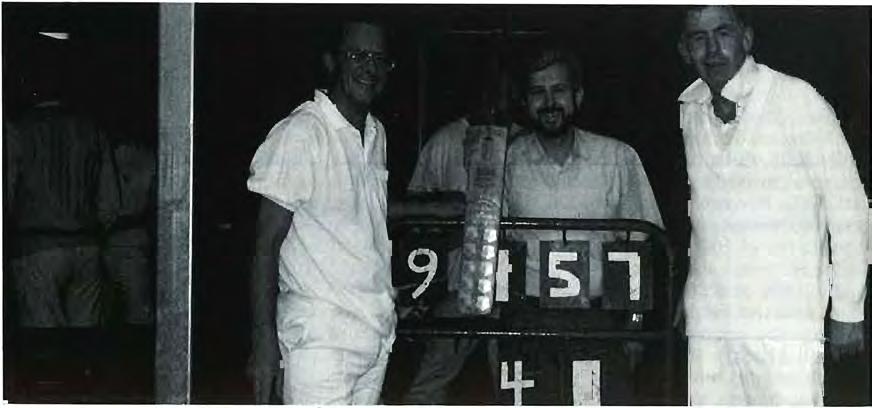
Middleton
It was left to an ageing Batten, who took time off from smoking cigarettes at fine leg to bowl out New South Wales with commendable figures of 2 of 30.
Perhaps the highlight of the New South Wales innings was the sensational wicket-keeping of Bryan Mueller who caught one and stumped 3 others, including 2 from Batten's so called fast medium deliveries. After this performance Mueller was the early favourite for man of the match As a consequence New South Wales was all out for 153 off 40 overs after batting 12.
Chancellor (24) and Middleton (28) got the Victorians away to a good start and apart from a sensational 17 from Gilles (which did much to redeem his position in the eyes of his nephews) , we were in considerable trouble at 82 for 7. Batten had run out a promising Mueller thus putting an end to any hope Mueller might have had of being the man of the match.
Ritter, meantime, was lured away from the grape to the crease a nd made a promising start. But, either his concentration or his thirst got the better of him and he was soon back in the pavilion .
Mal Speed, fea r ing Ba tt e n wo uld run him out, feigned inju ry and ca ll ed f Of a ru nner wh ereupon Ritter again a ppeare d wit h bat and gla ss Unperturbed Speed (26 run out) with Batten took the
score to 138 for 9.
Next to the crea se came Maiden, admitted in Victoria but practising in New South Wales, about whose loyalty considerable doubt existed This doubt proved unfounded as he and Batten (26 not out) steered the Victorians to an exciting and sensational victory on the second last ball of the day .
OUf New So ut h Wa les hosts led by Hastings, despit e their s ho ck and bewilderment, were gracious in d e feat and on ce again presented " The Sub Standard Trophy" to the Victorian Bar. Batten was awarded the man of the match and during the course of a very pleasant after match BBQ regaled us with stories of his cricketing youth , which helped bring the proceedings to an early conclusion.
The weekend will hold some cherished memories for some including Mueller's big collect at Rose Hill on the Saturday, Ritter's discovery of some new Hunter Valley reds, Gilles' discovery that he can really bat and Chancellor' s ability to survive a whole weekend with one set of clothes. Perhaps for a few the most treasured memory will be watching the early TV news whilst for most it will be the confirmation of what we have always suspected, that the Victorian Bar XI can survive even without Bill Gillard.
Ross Middleton